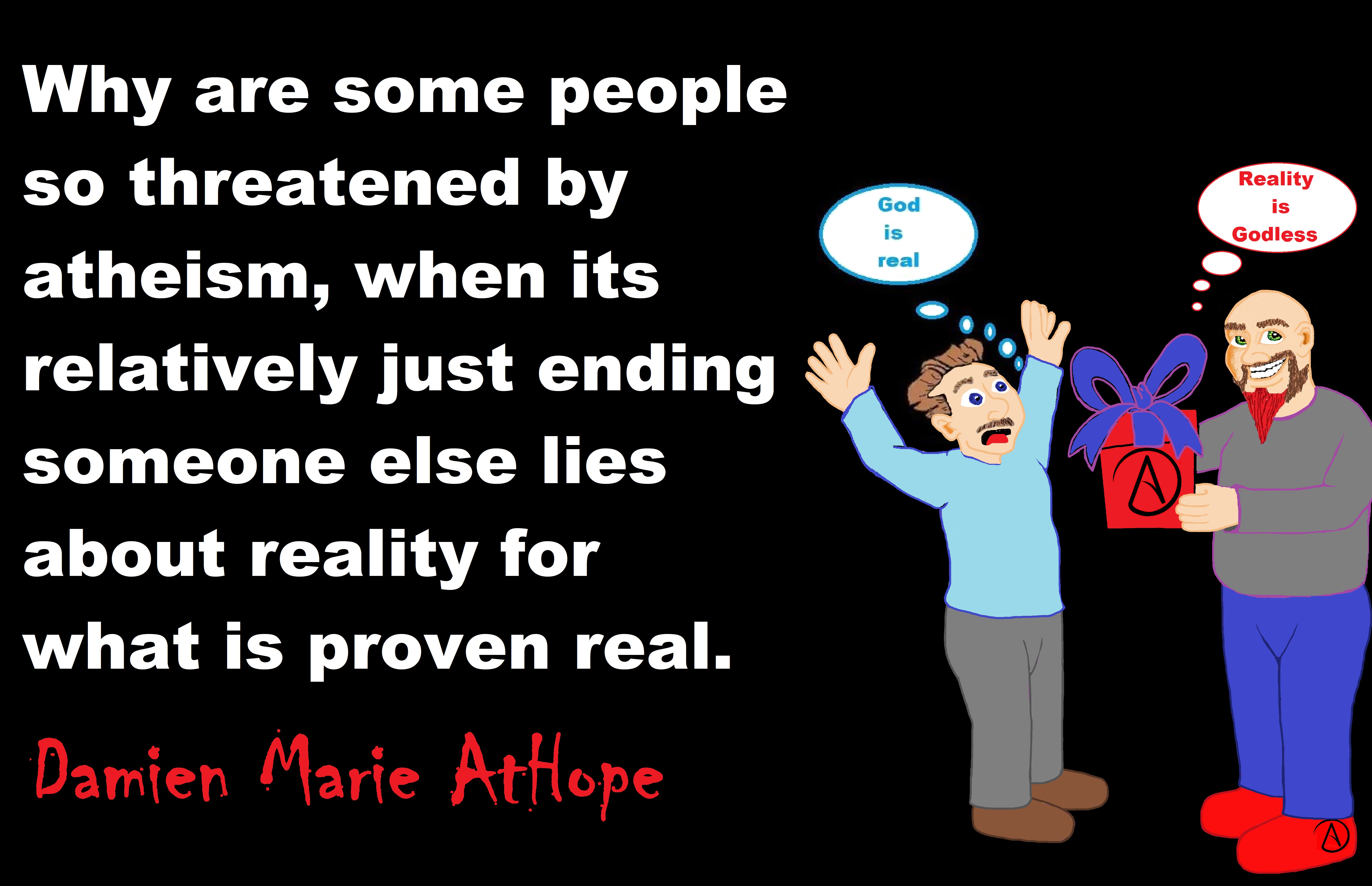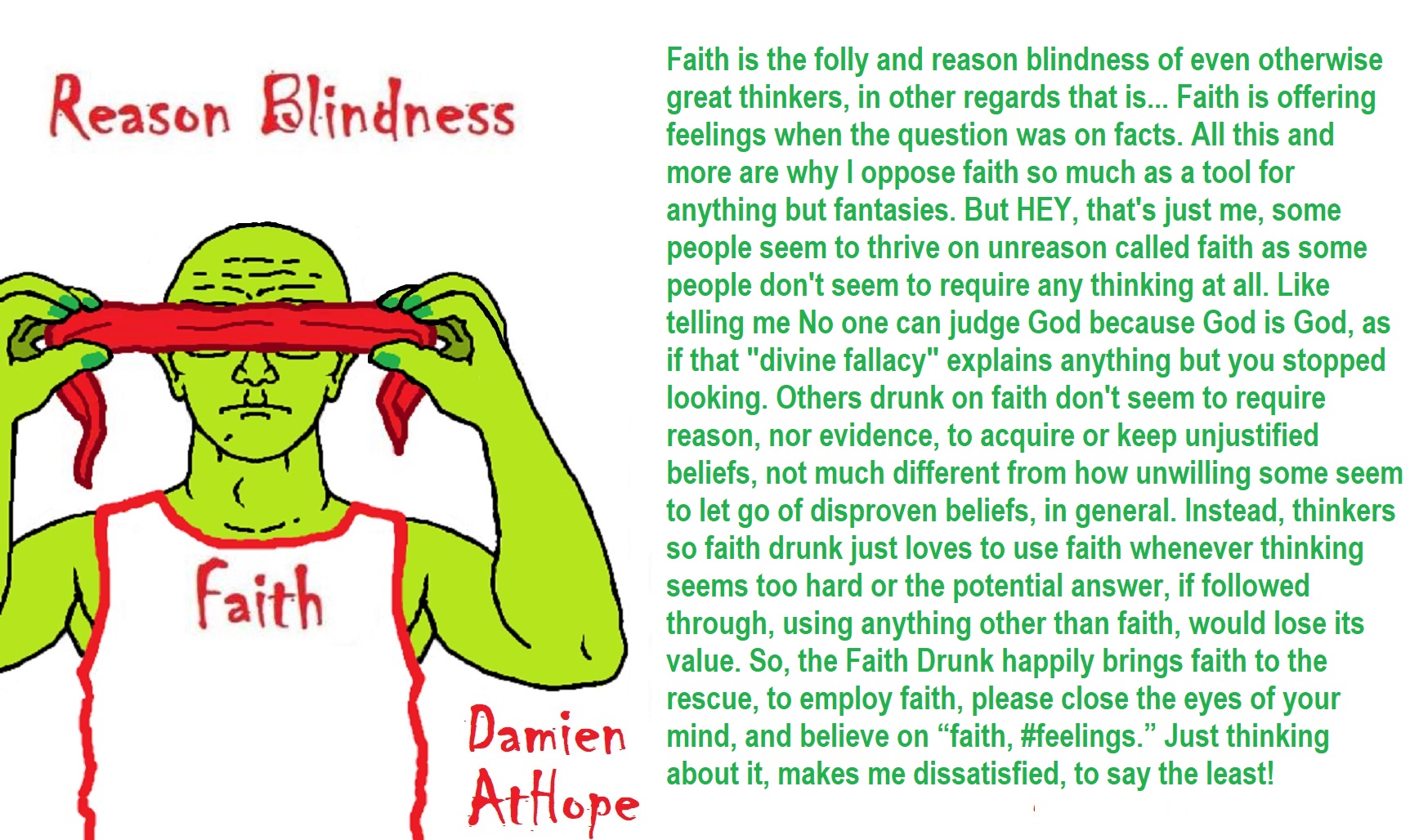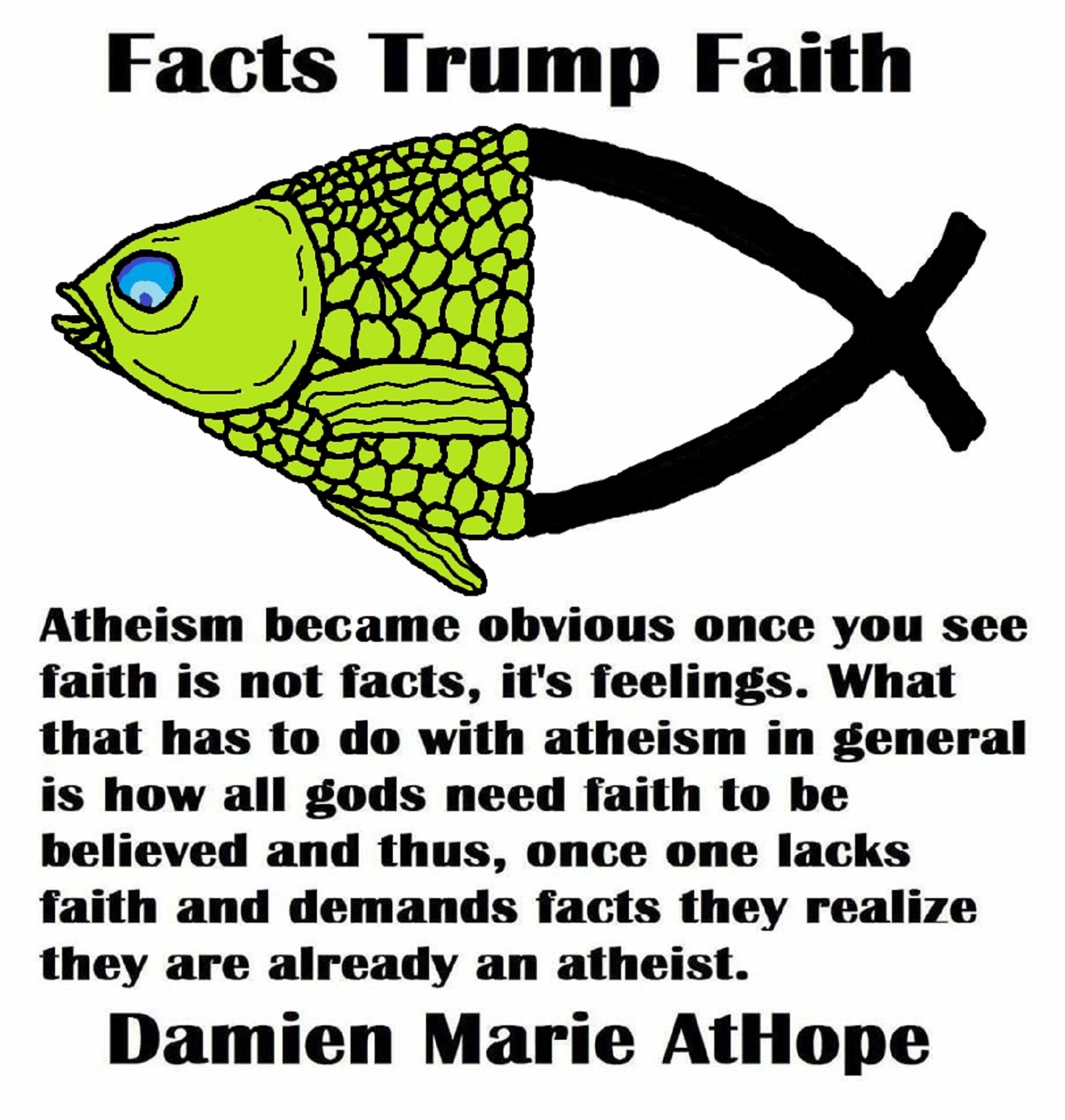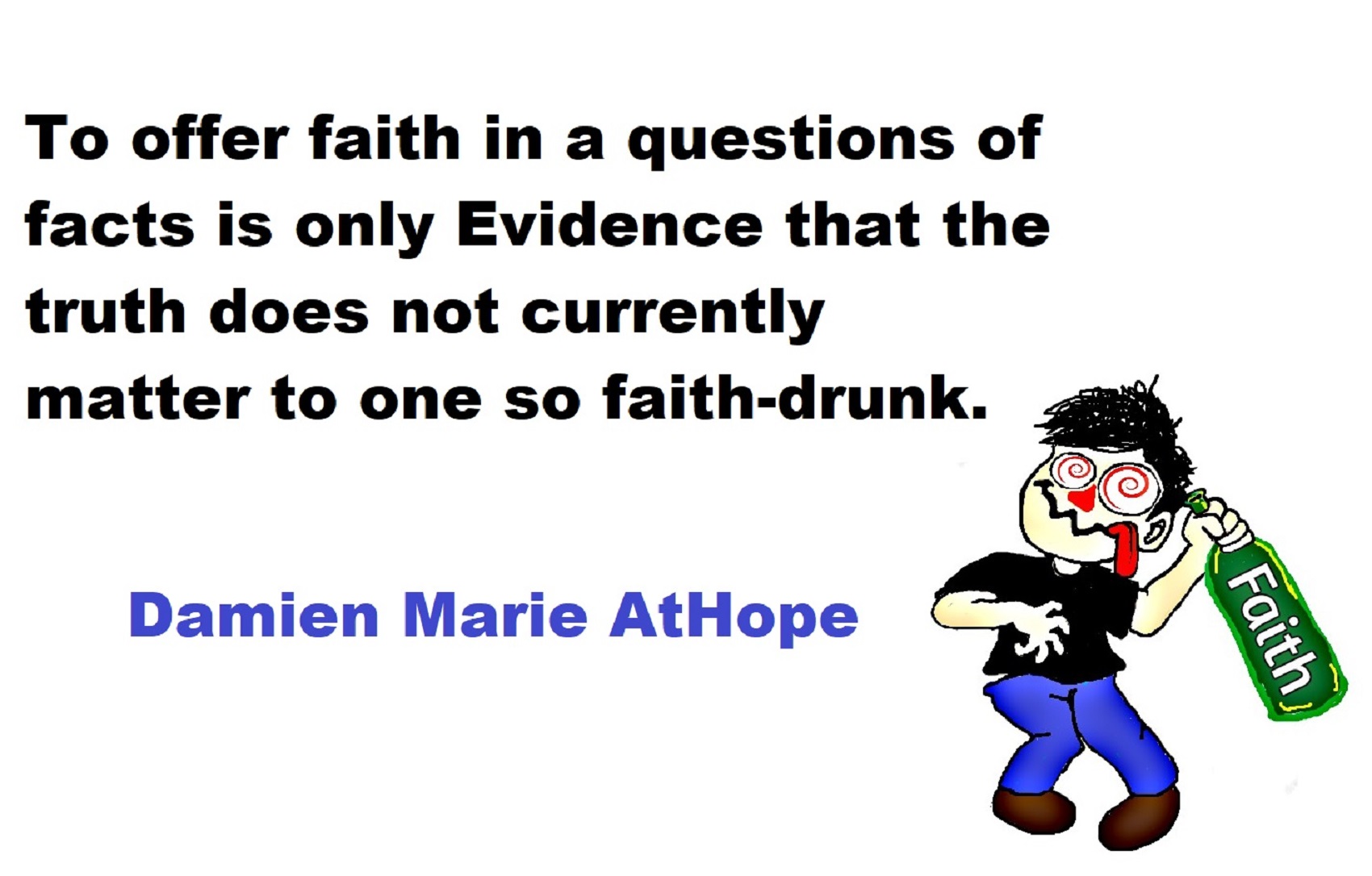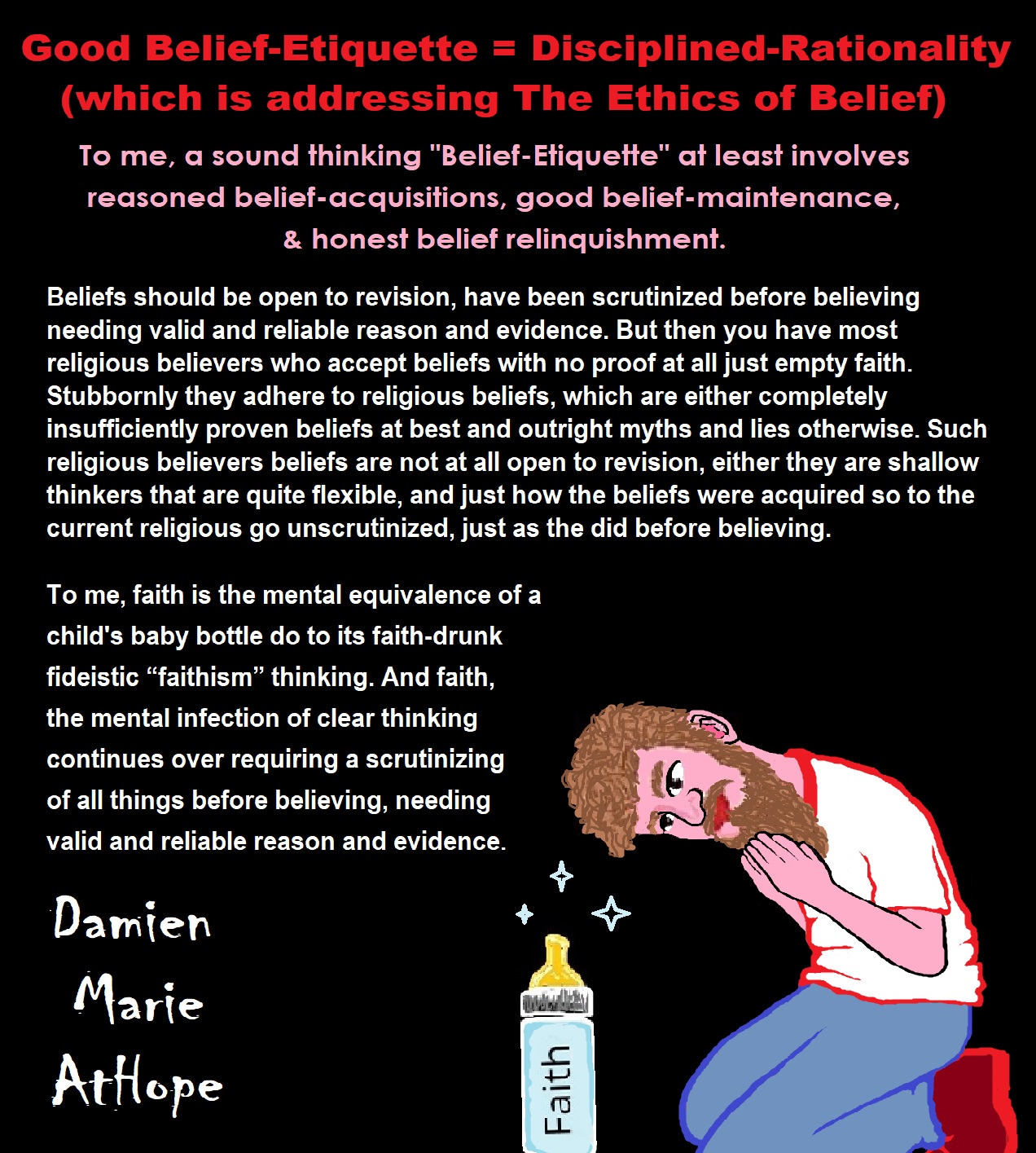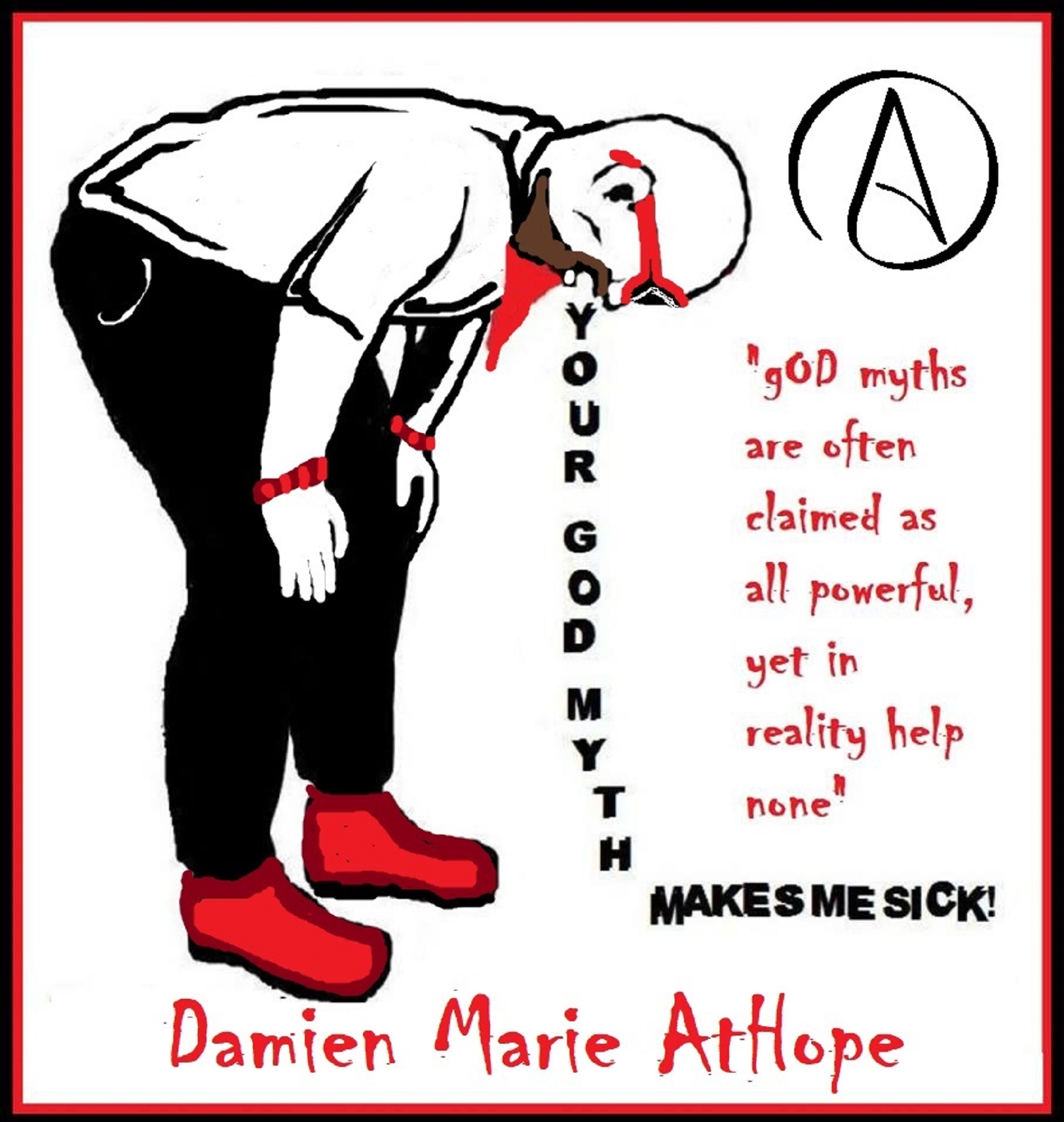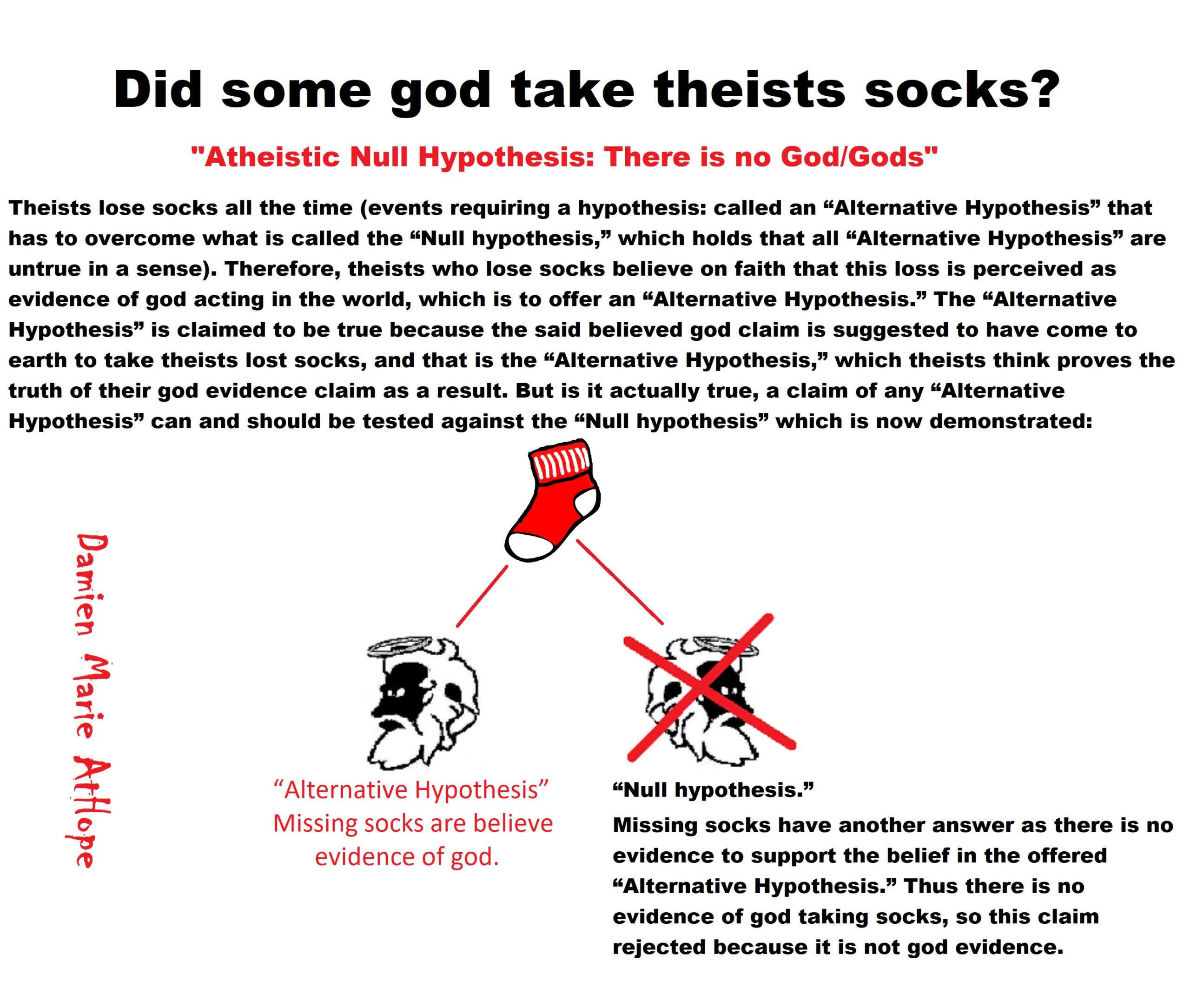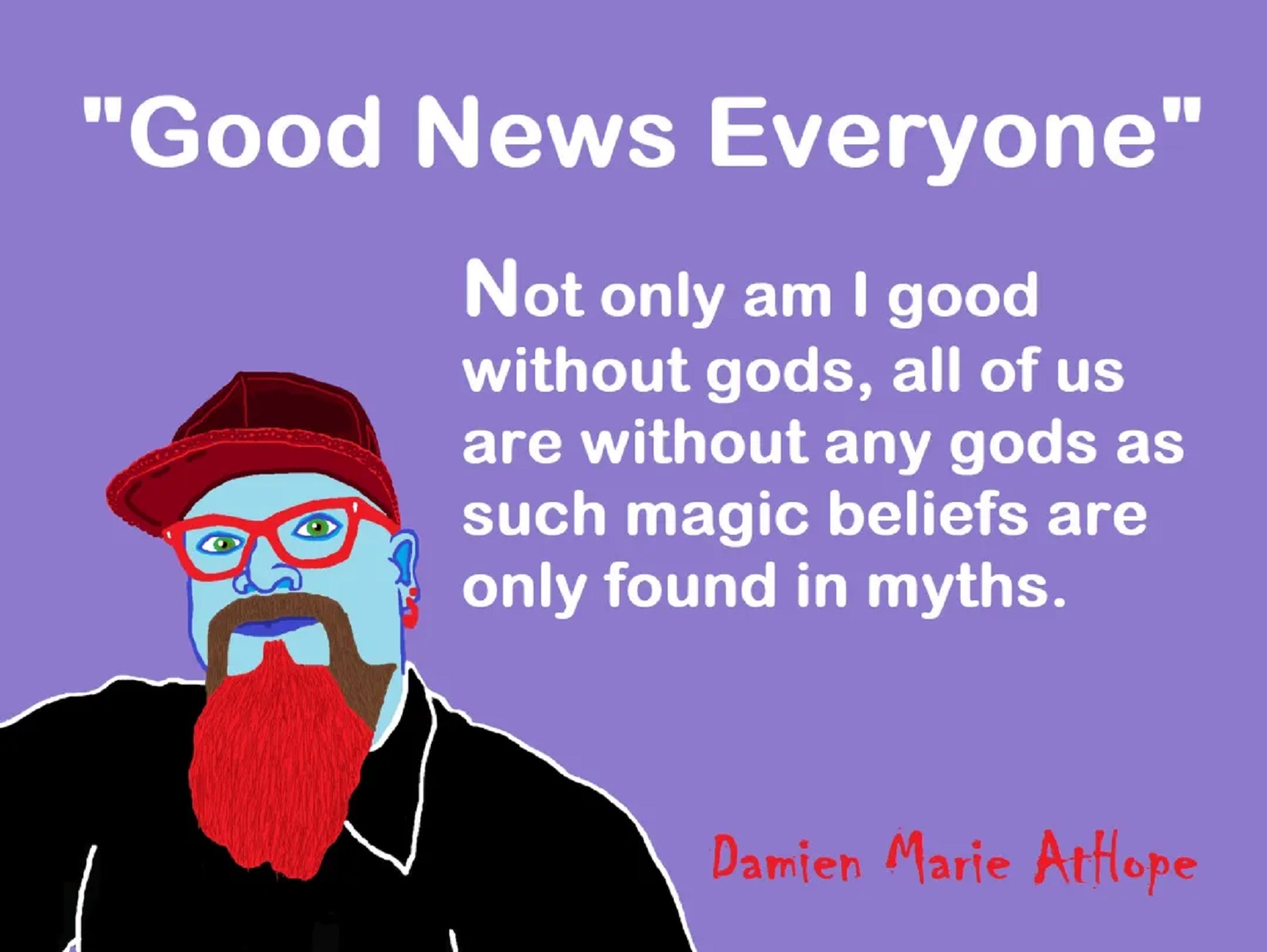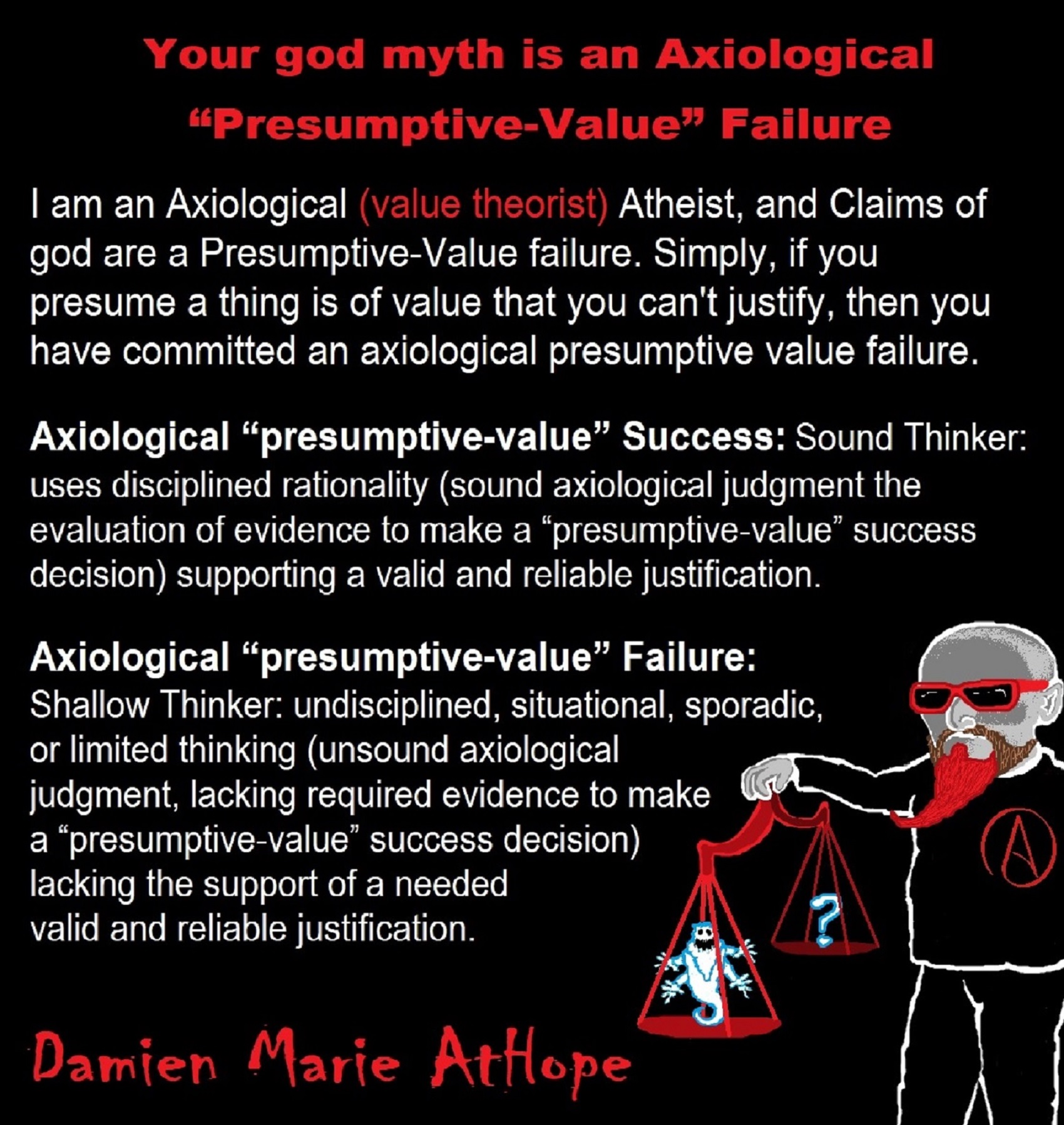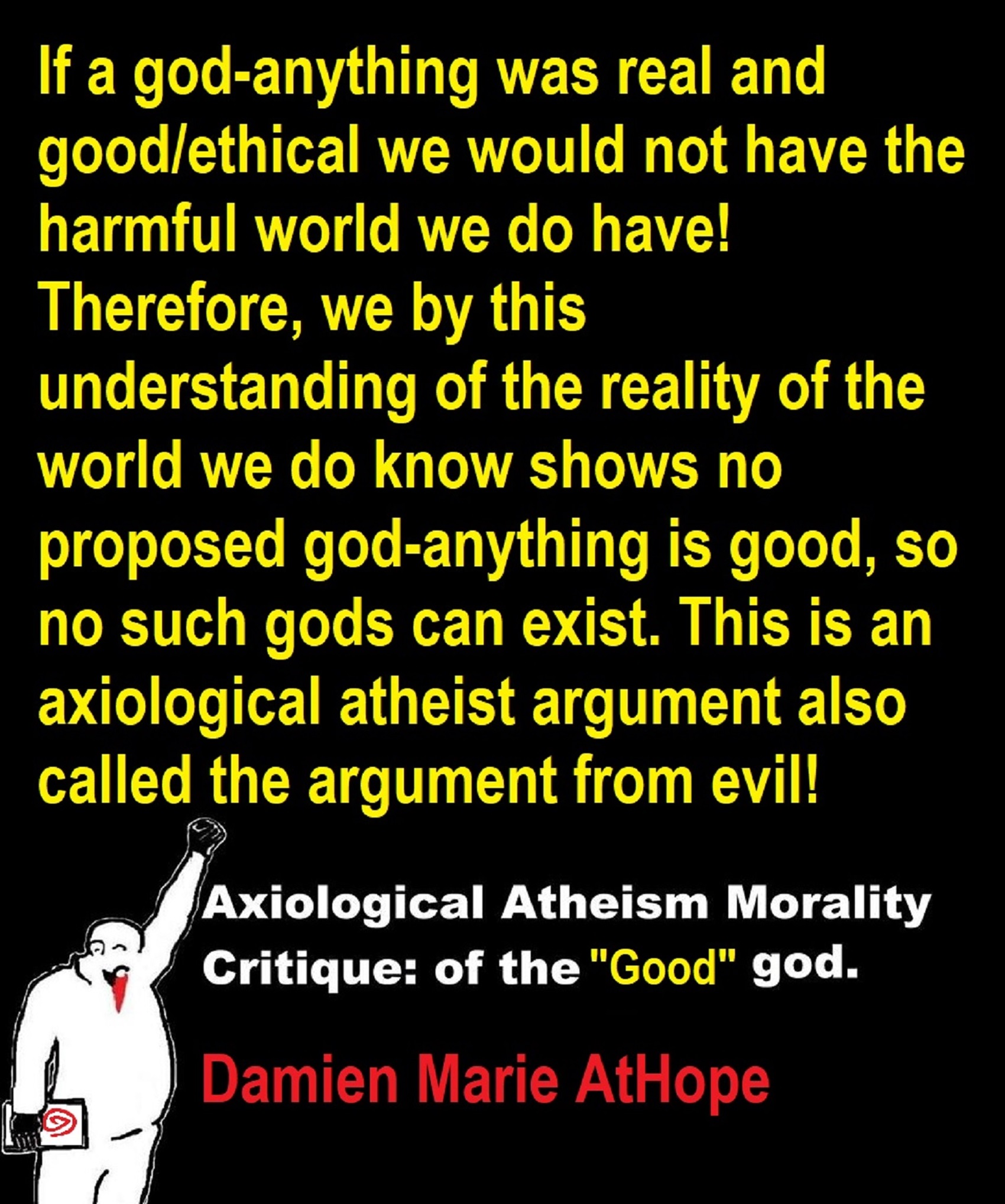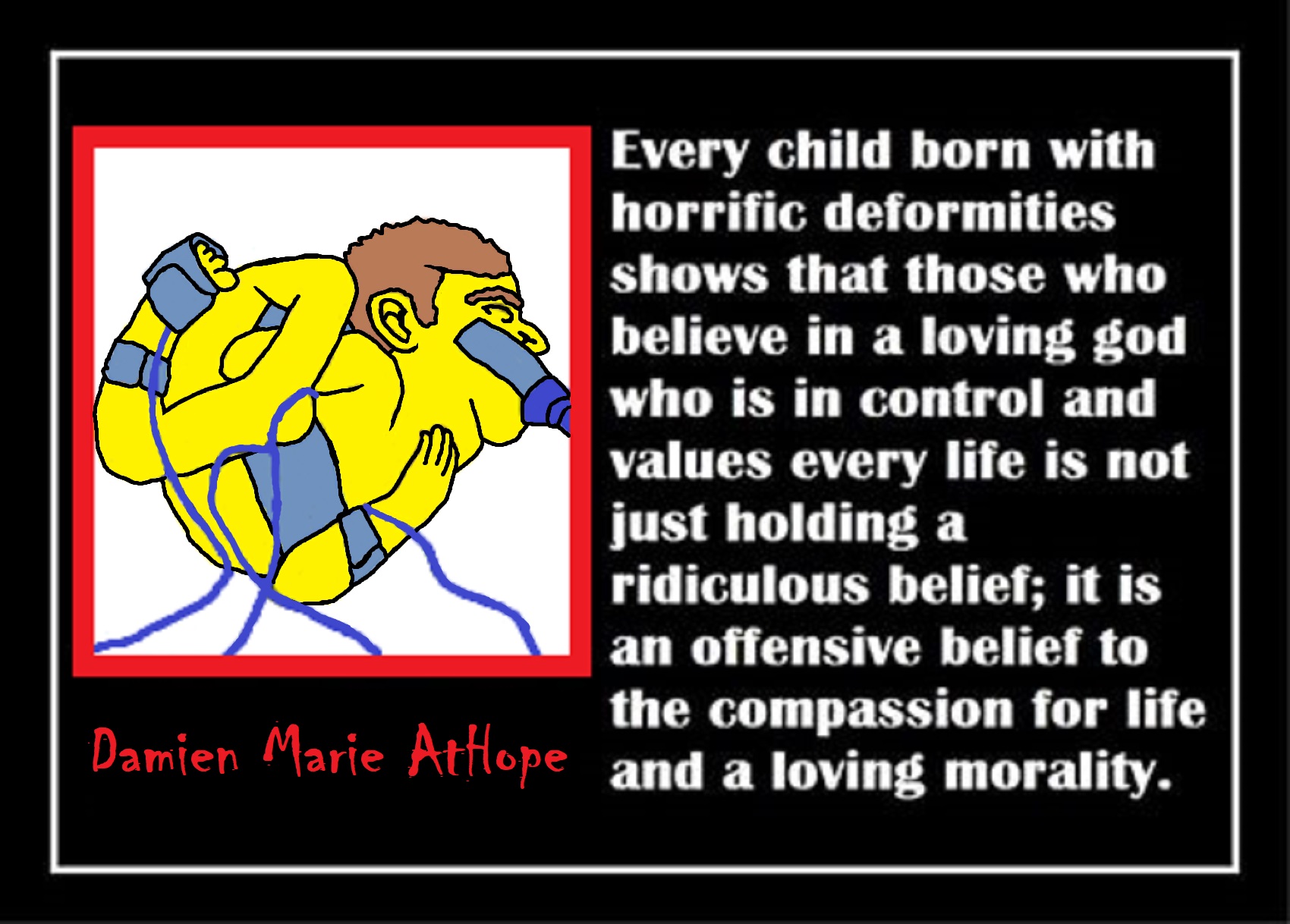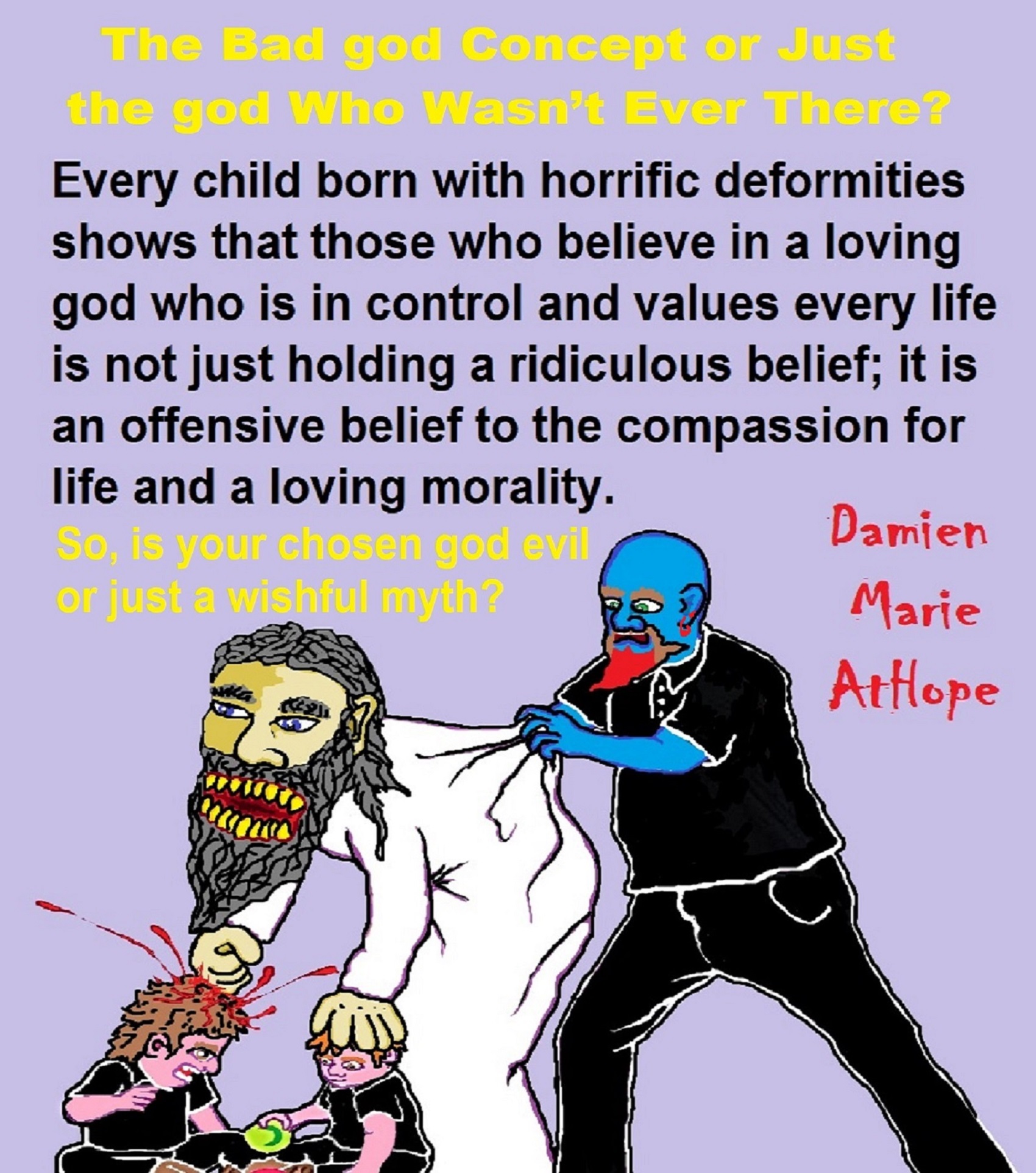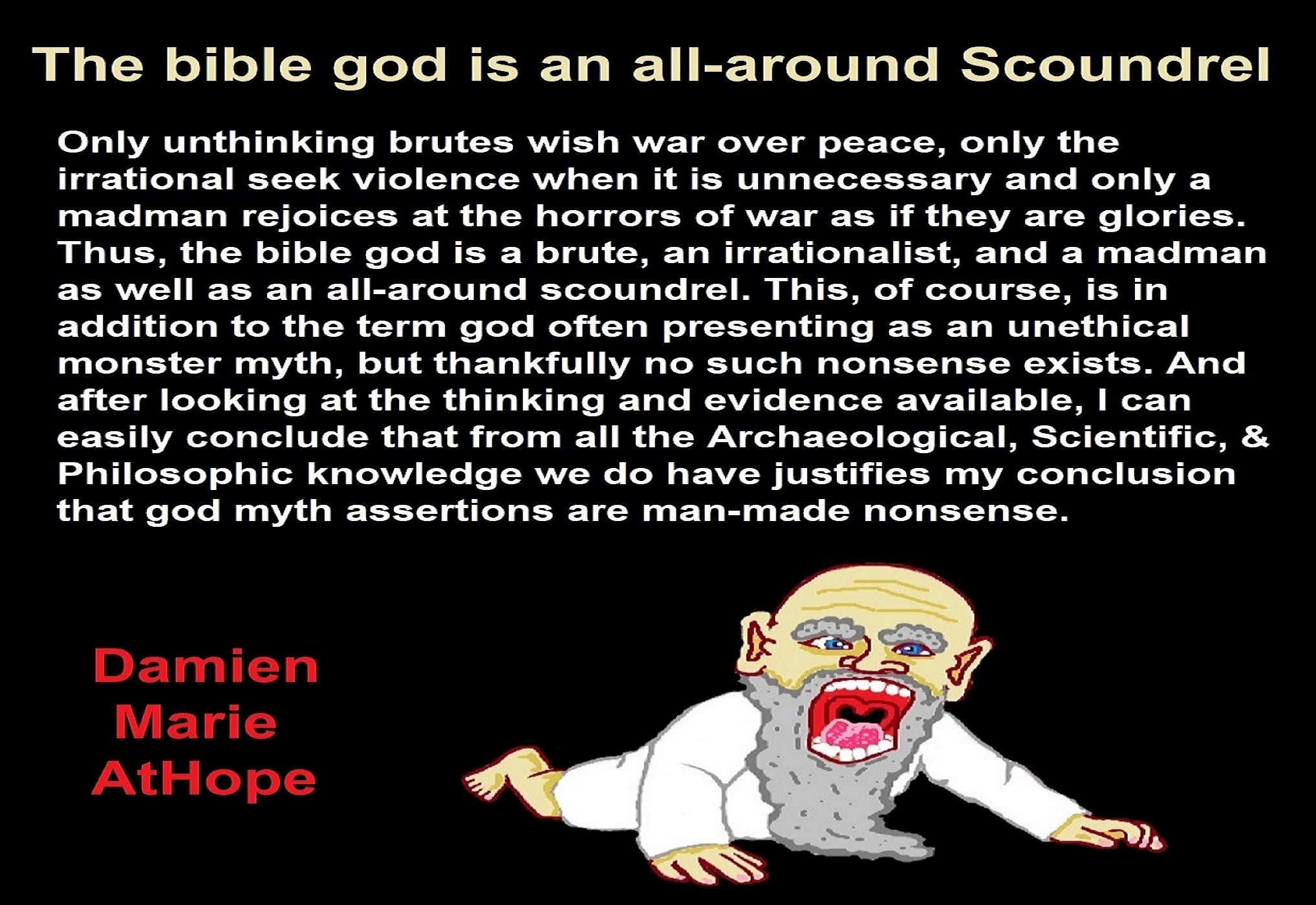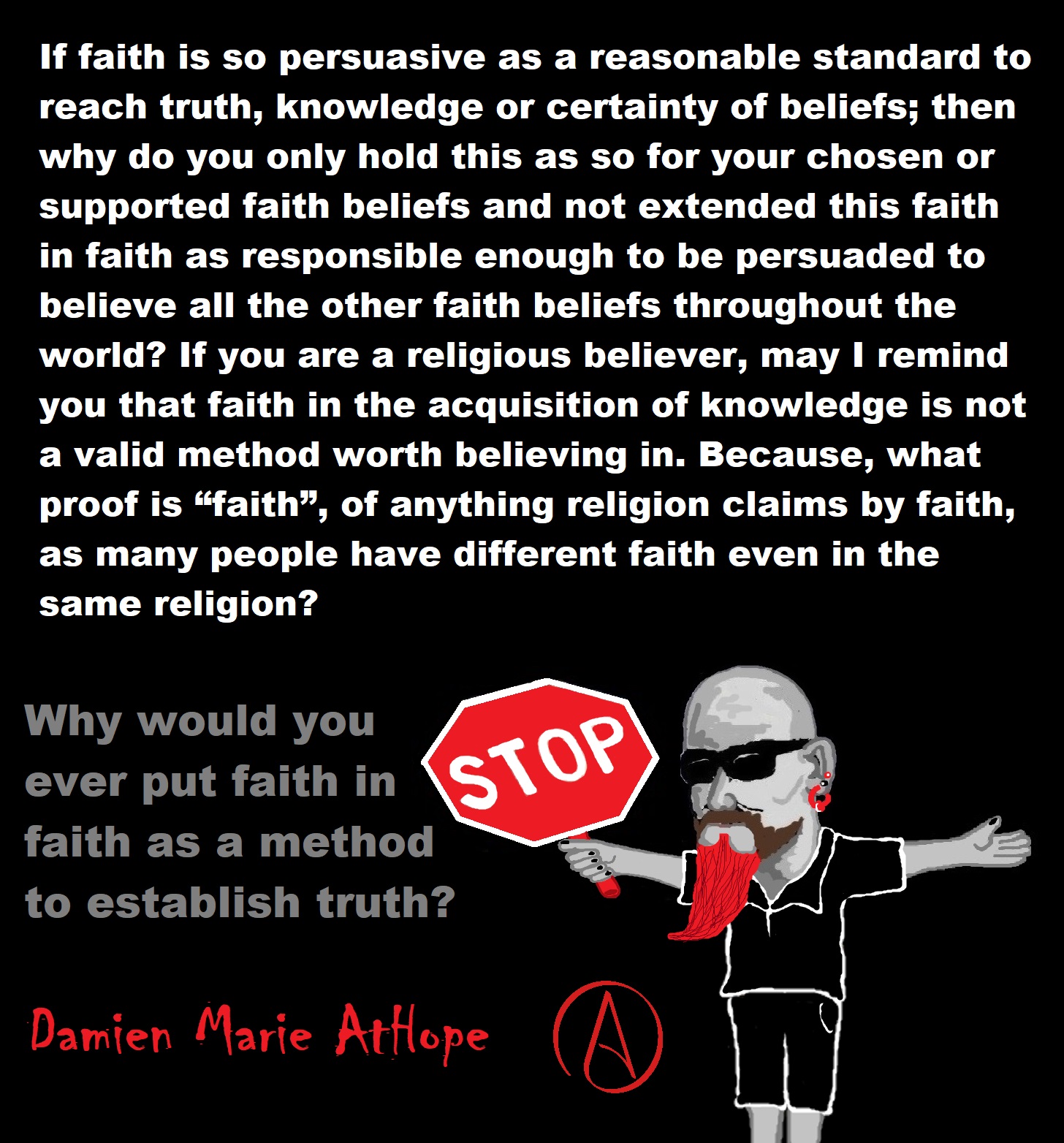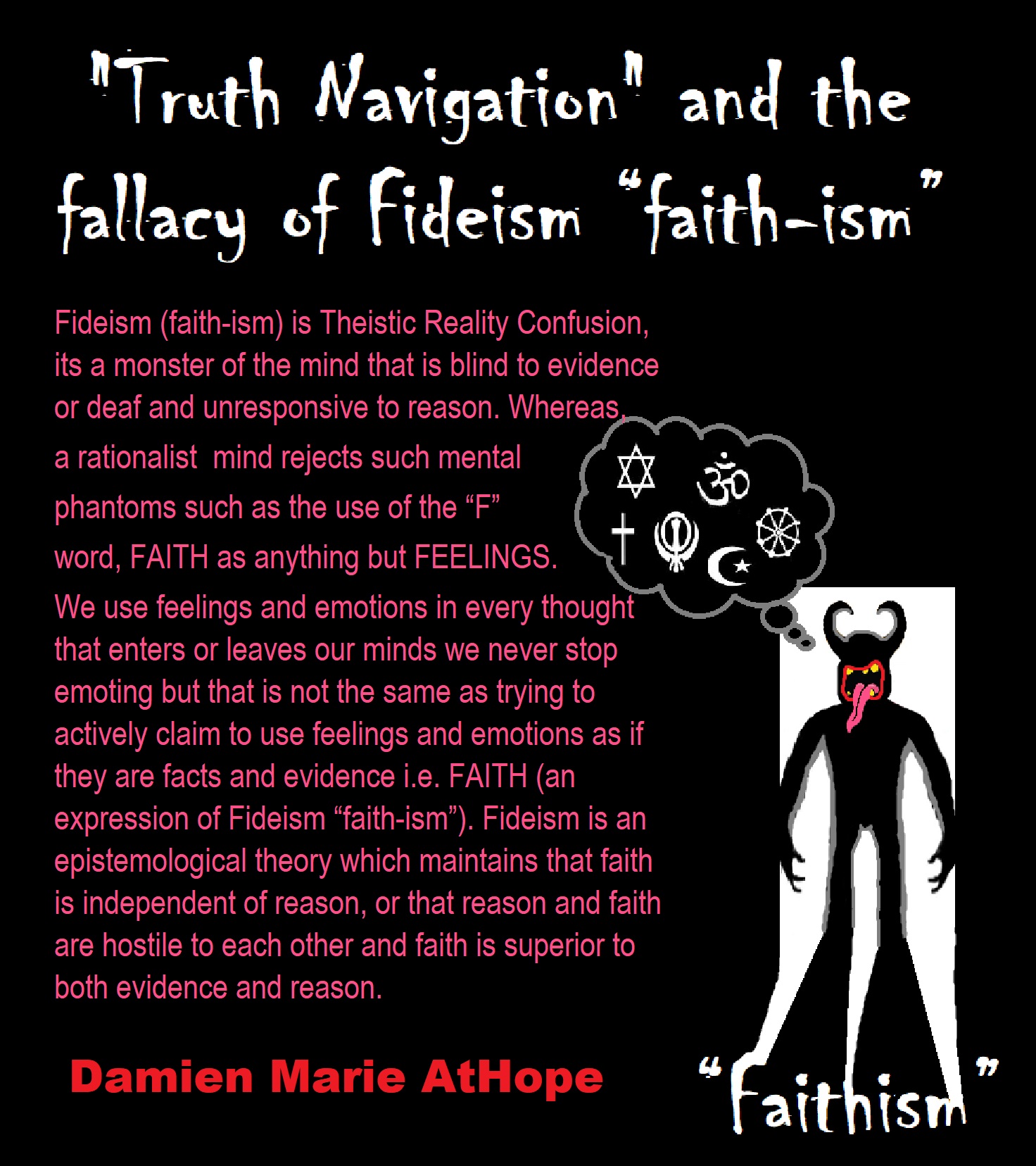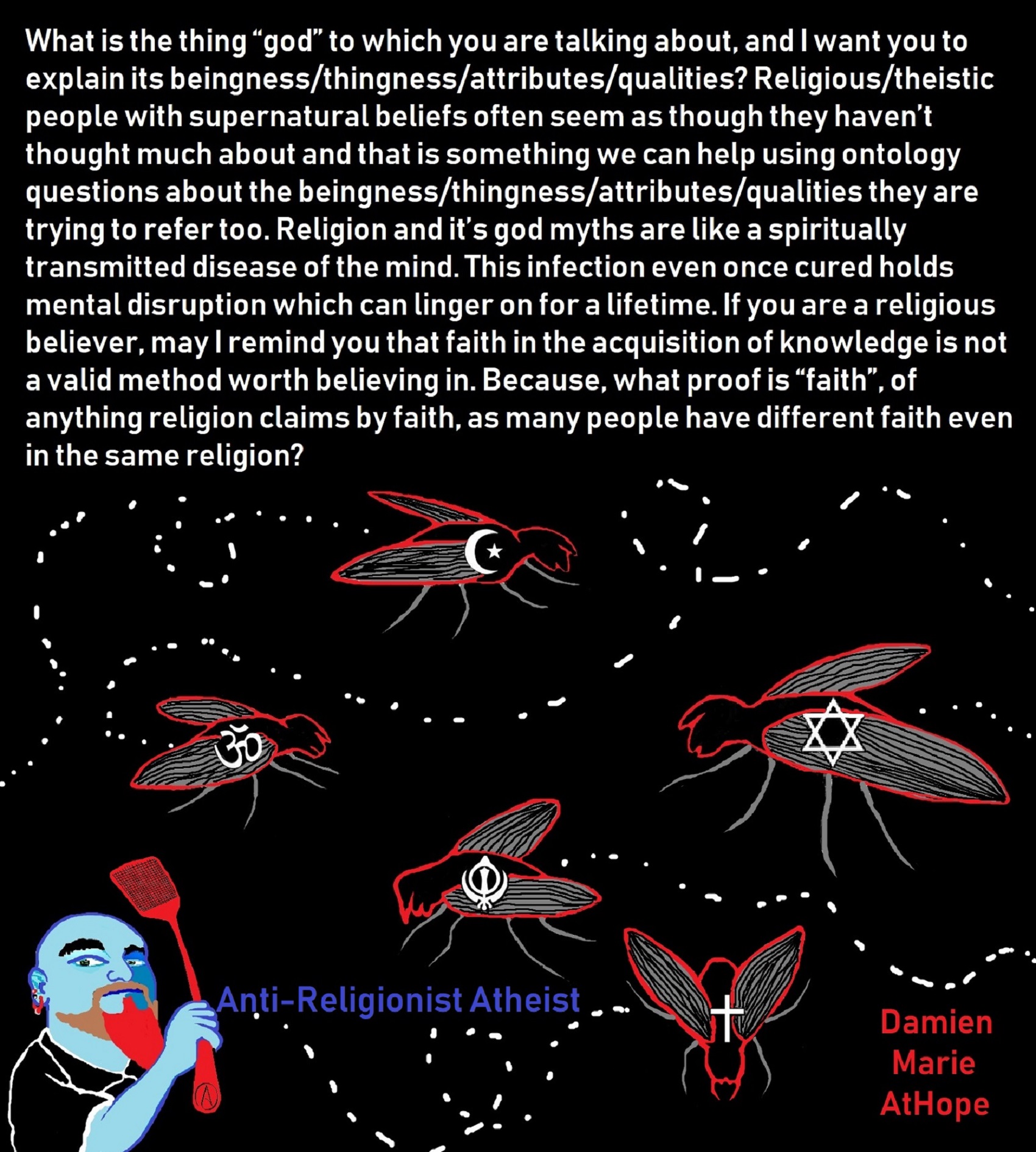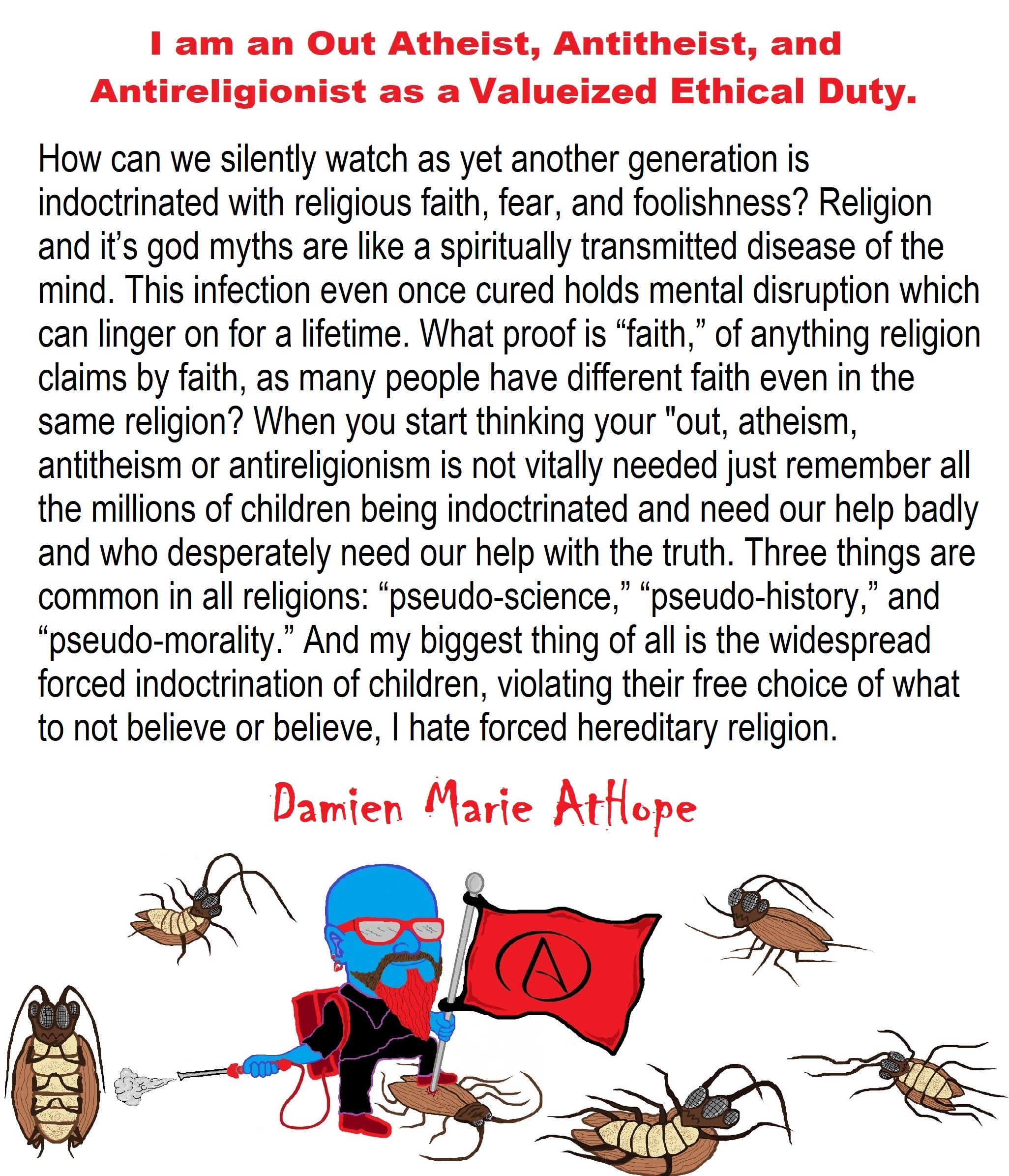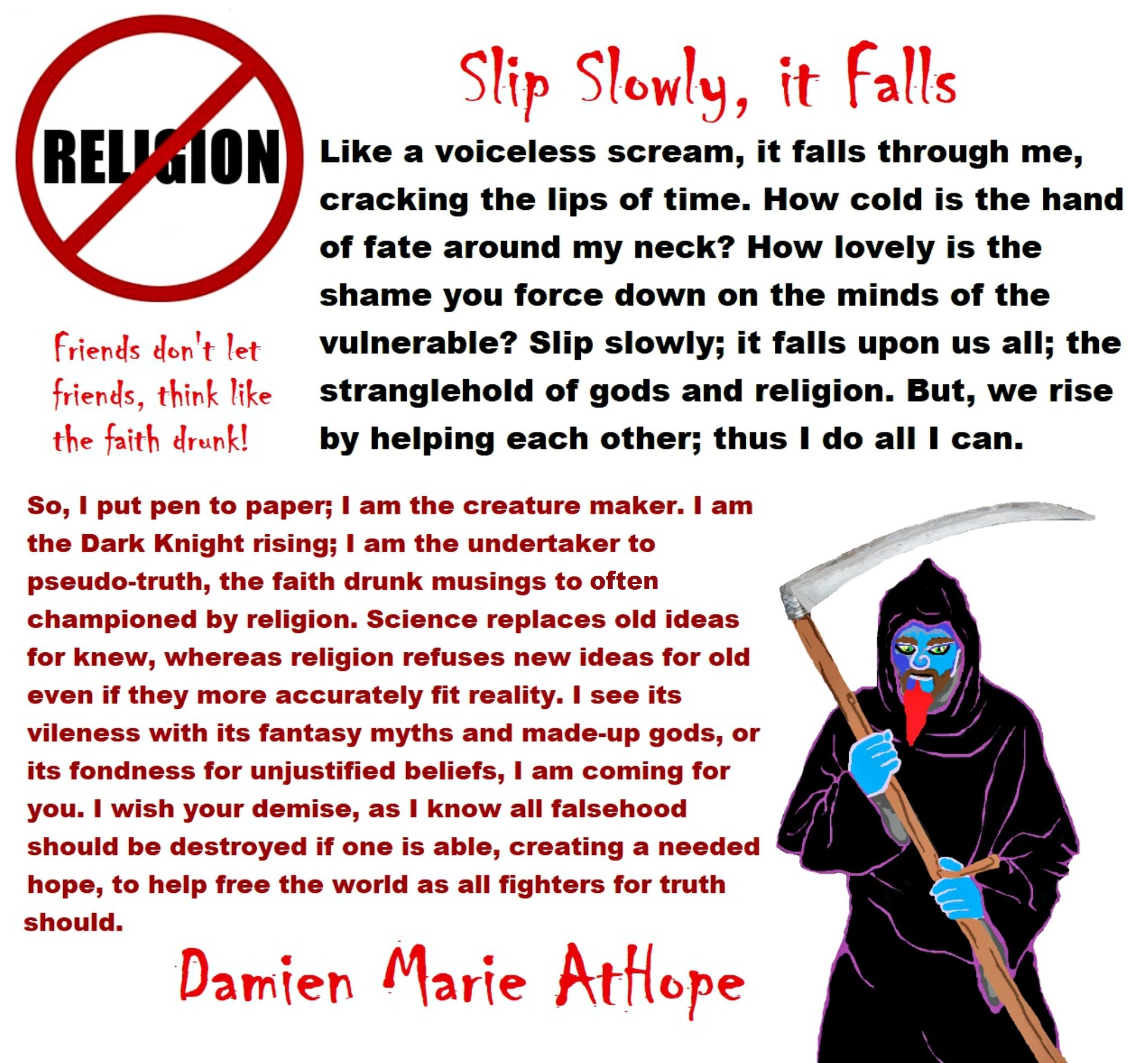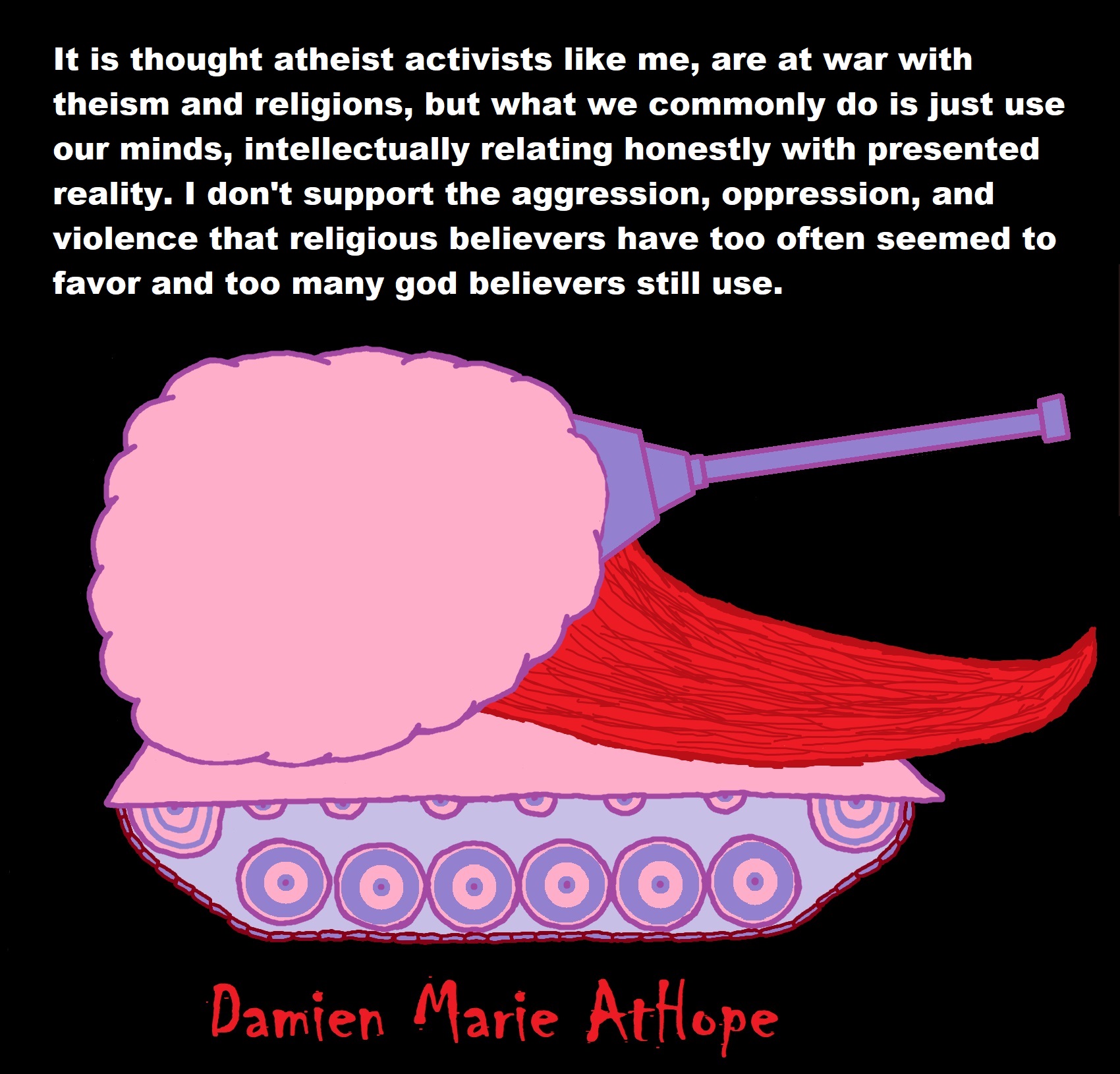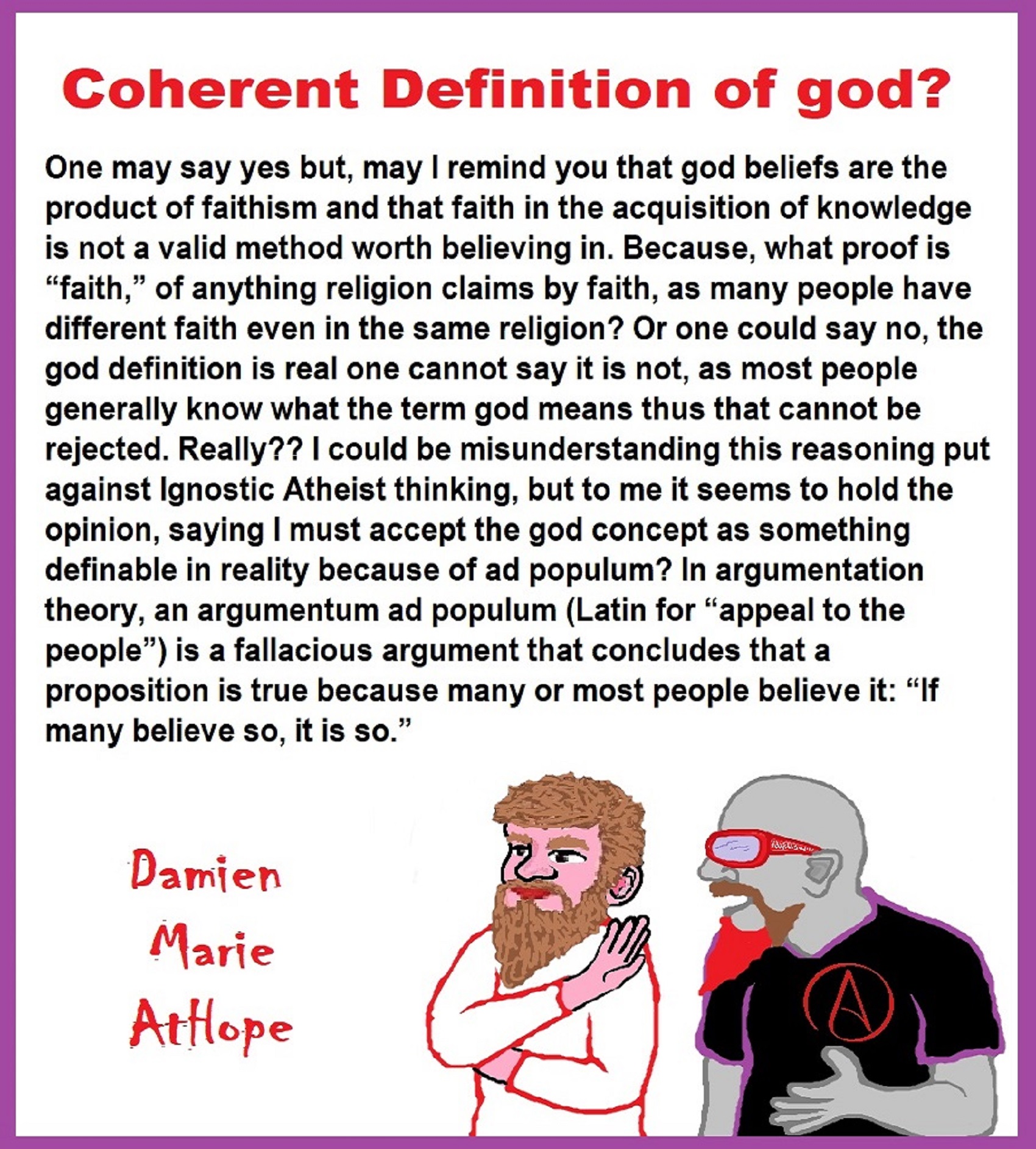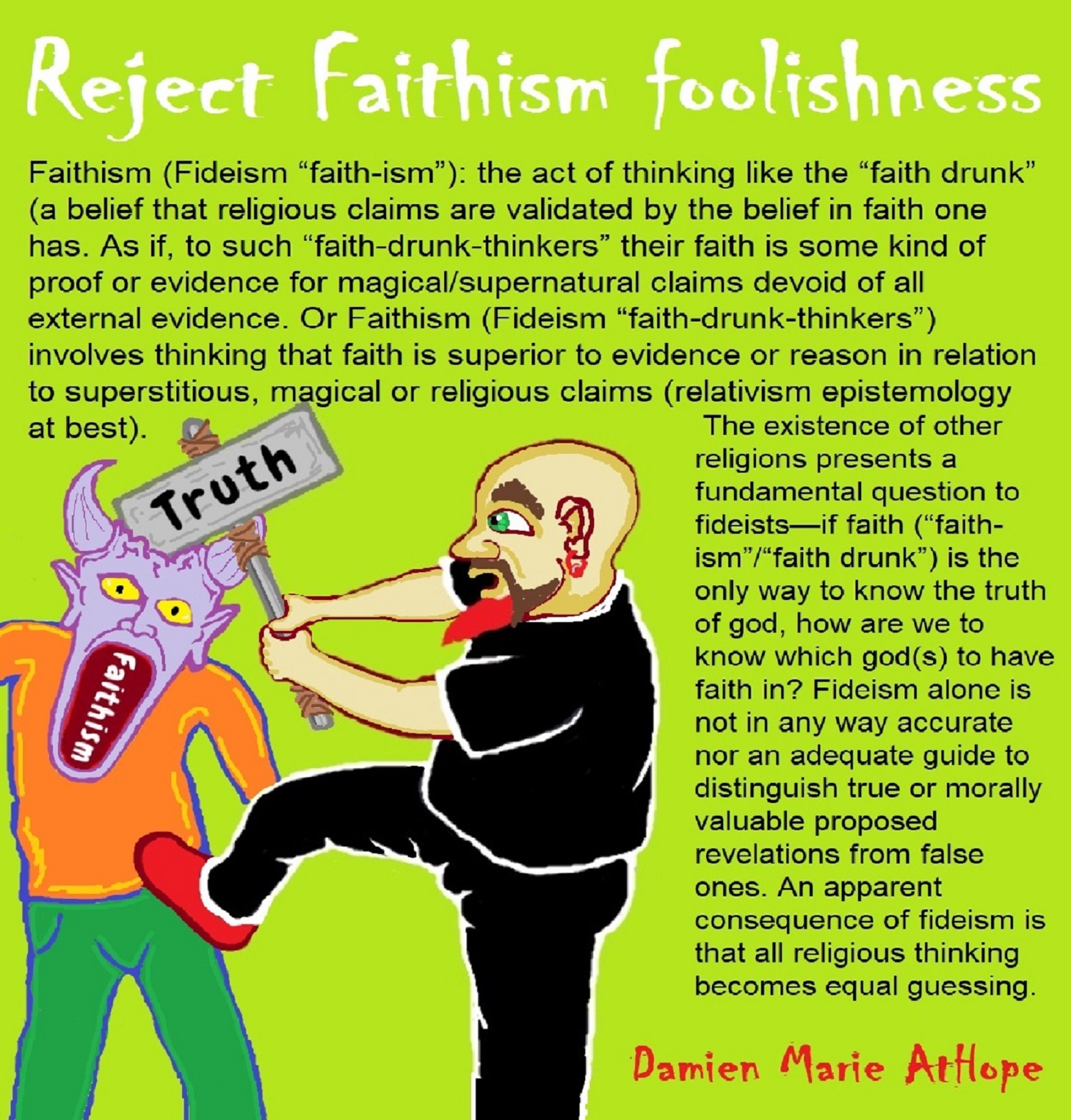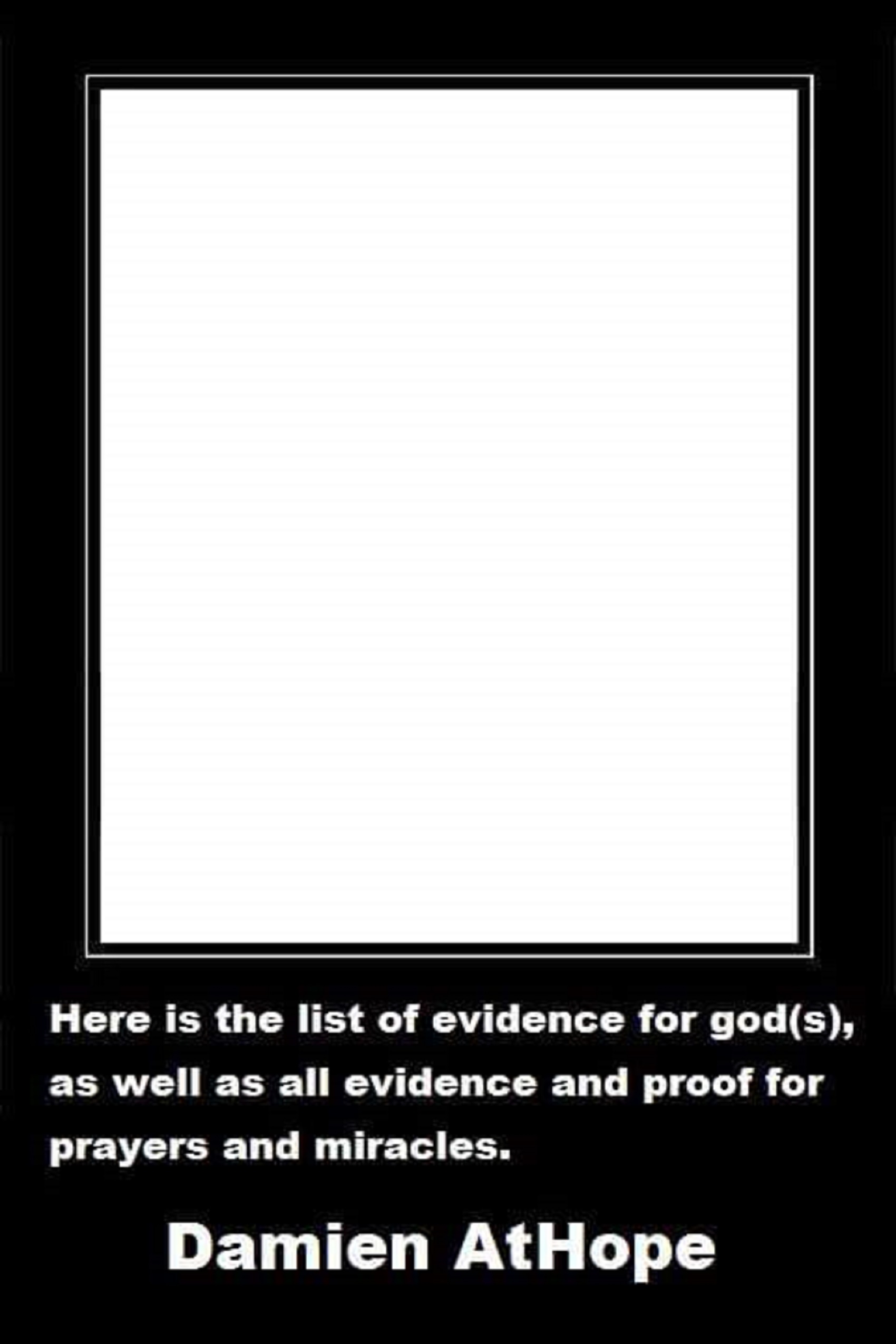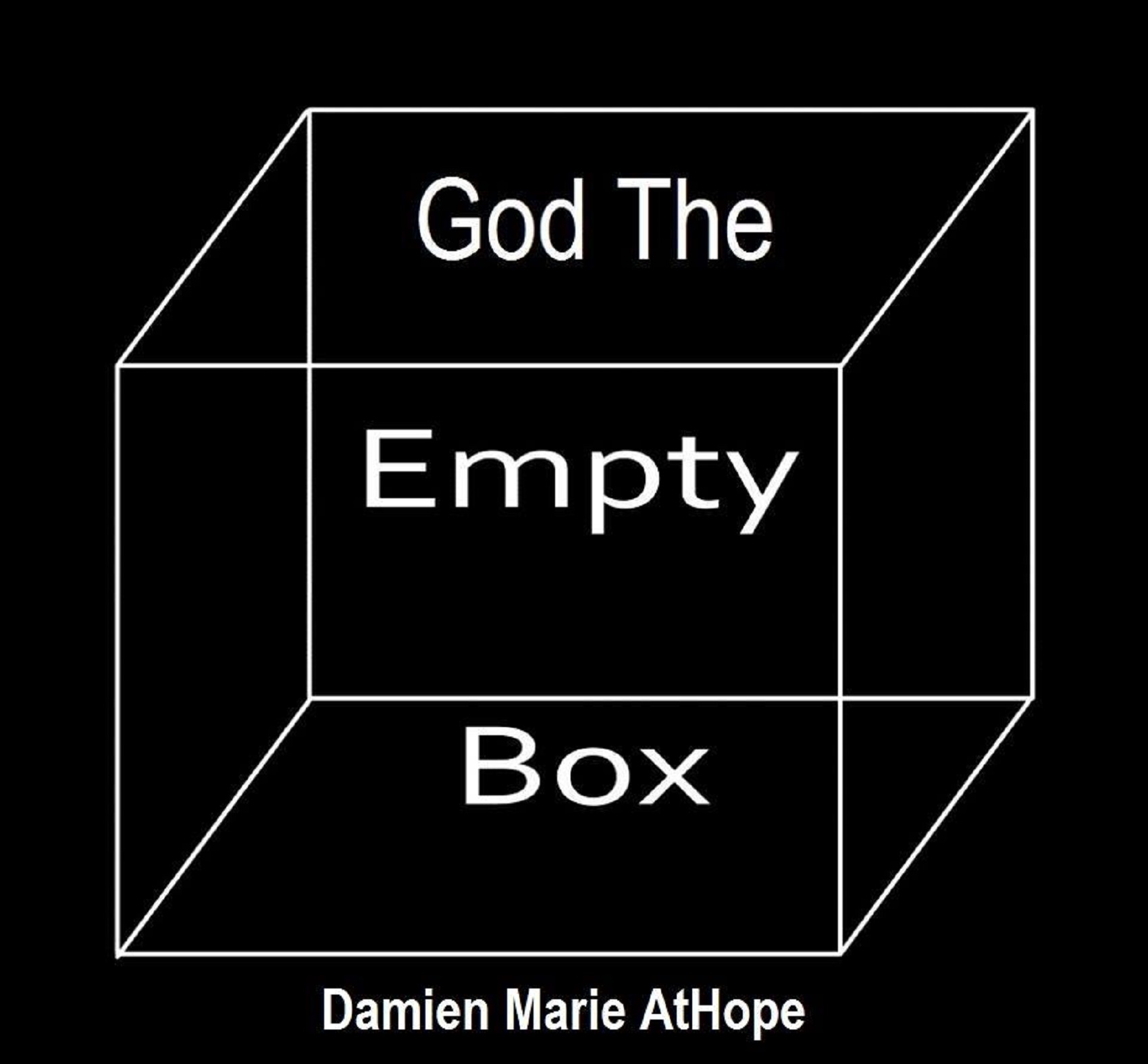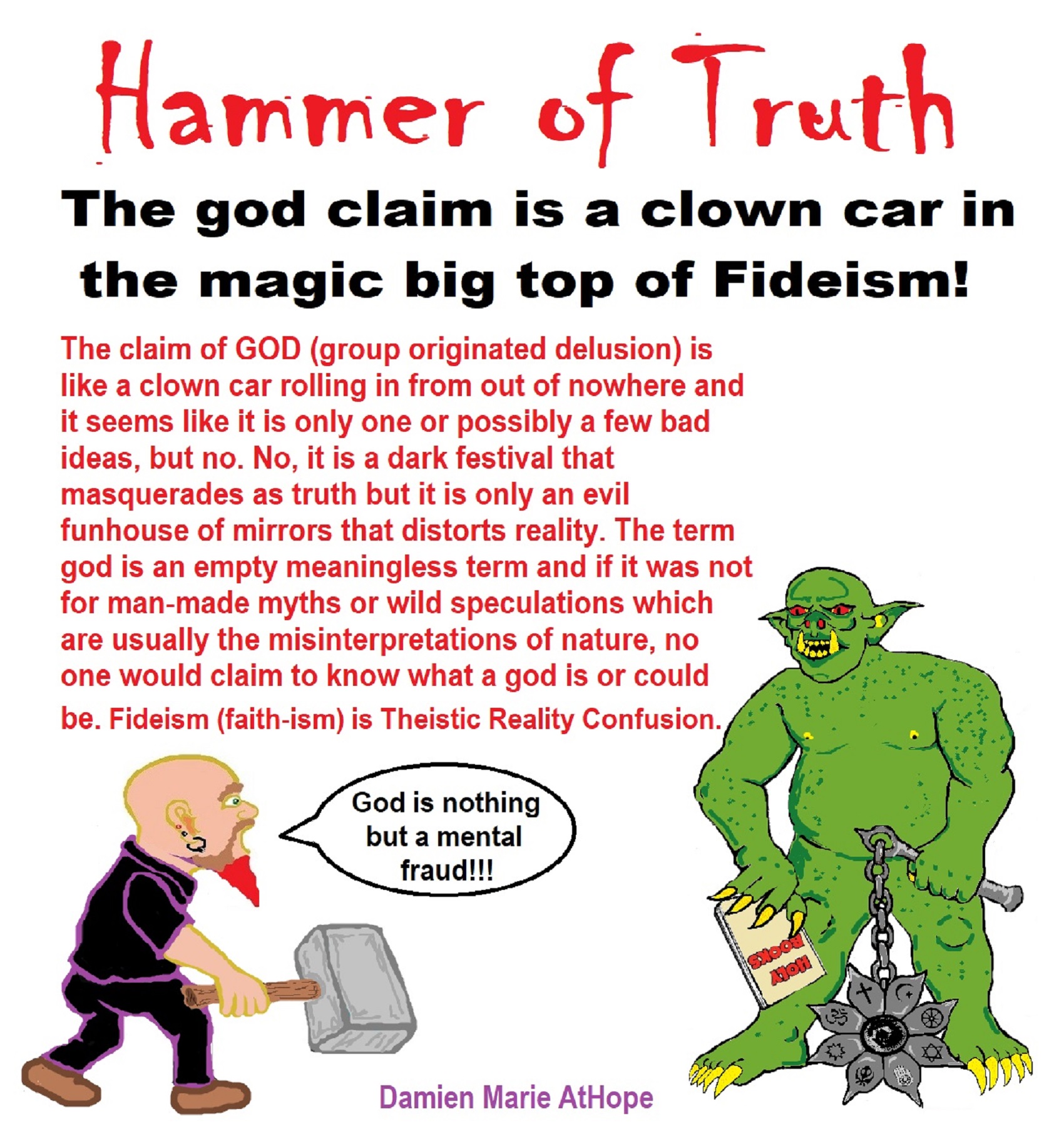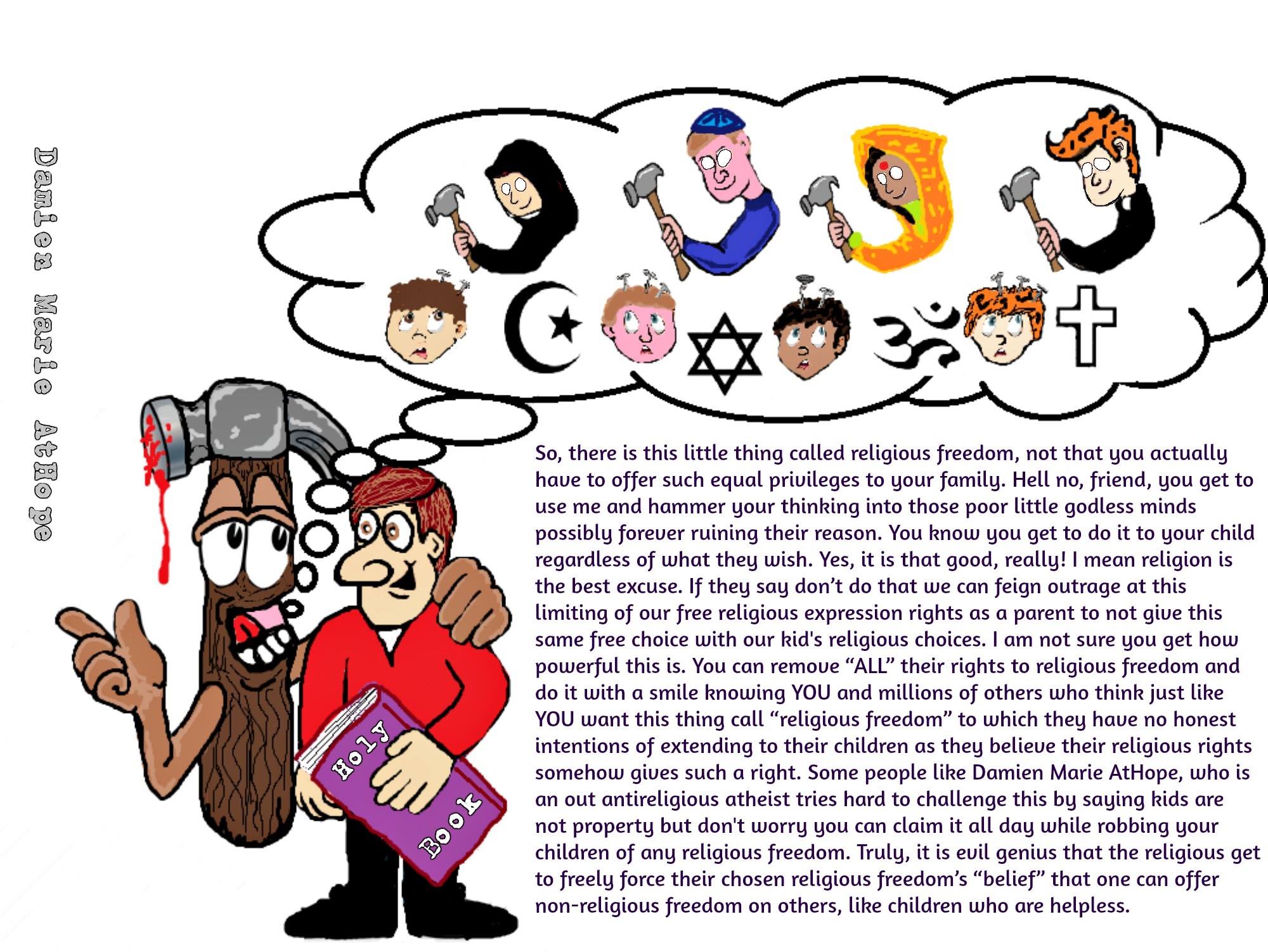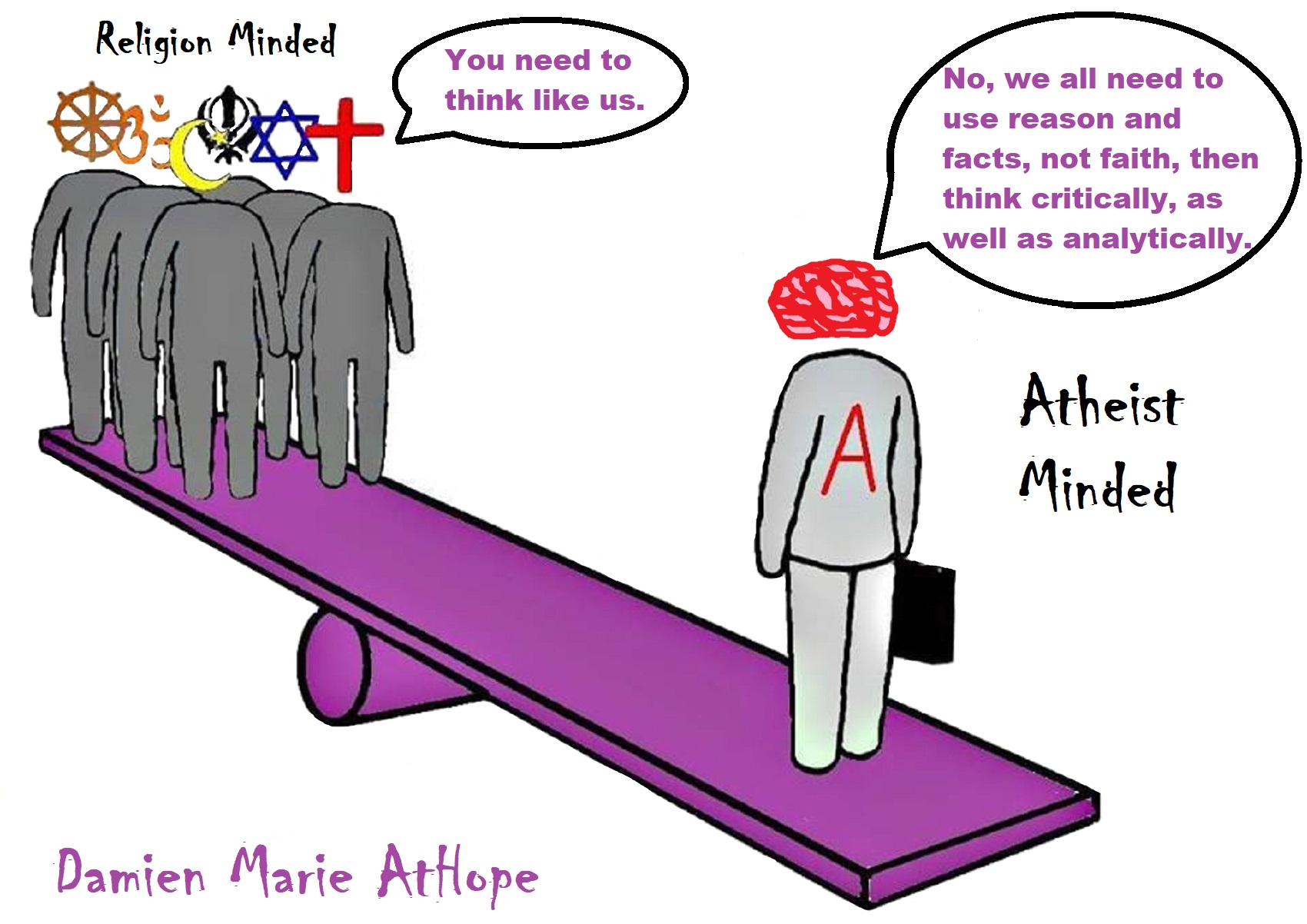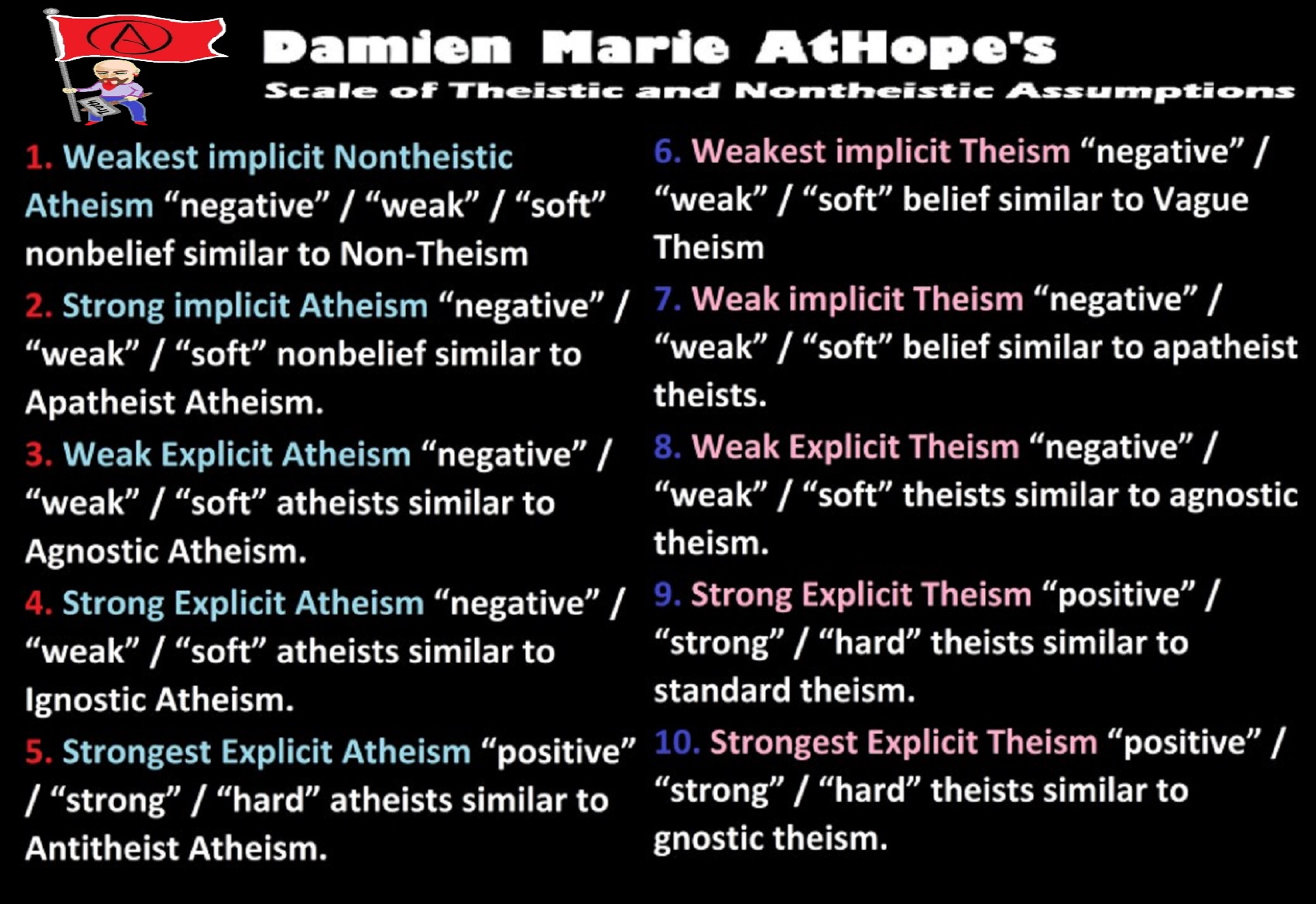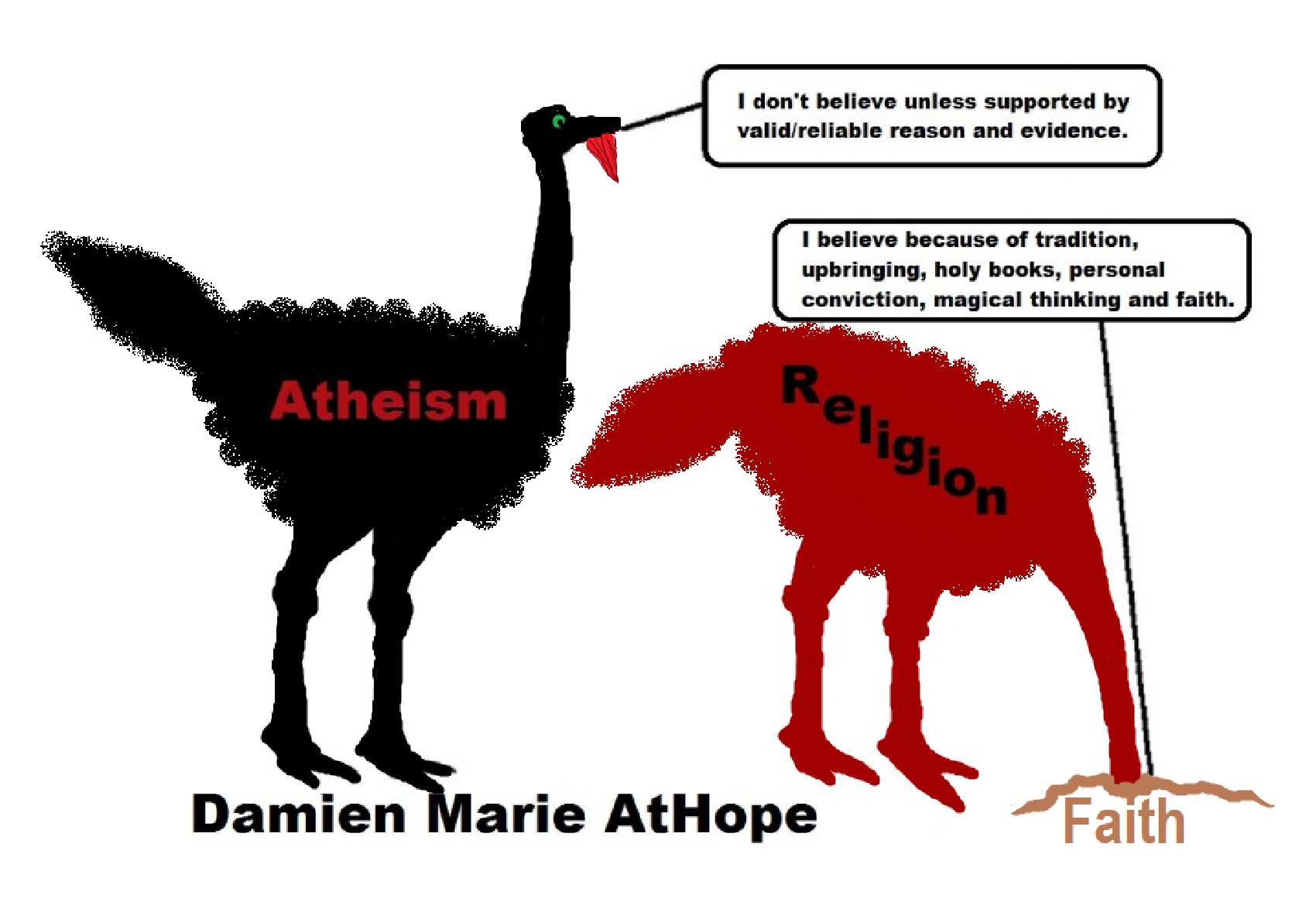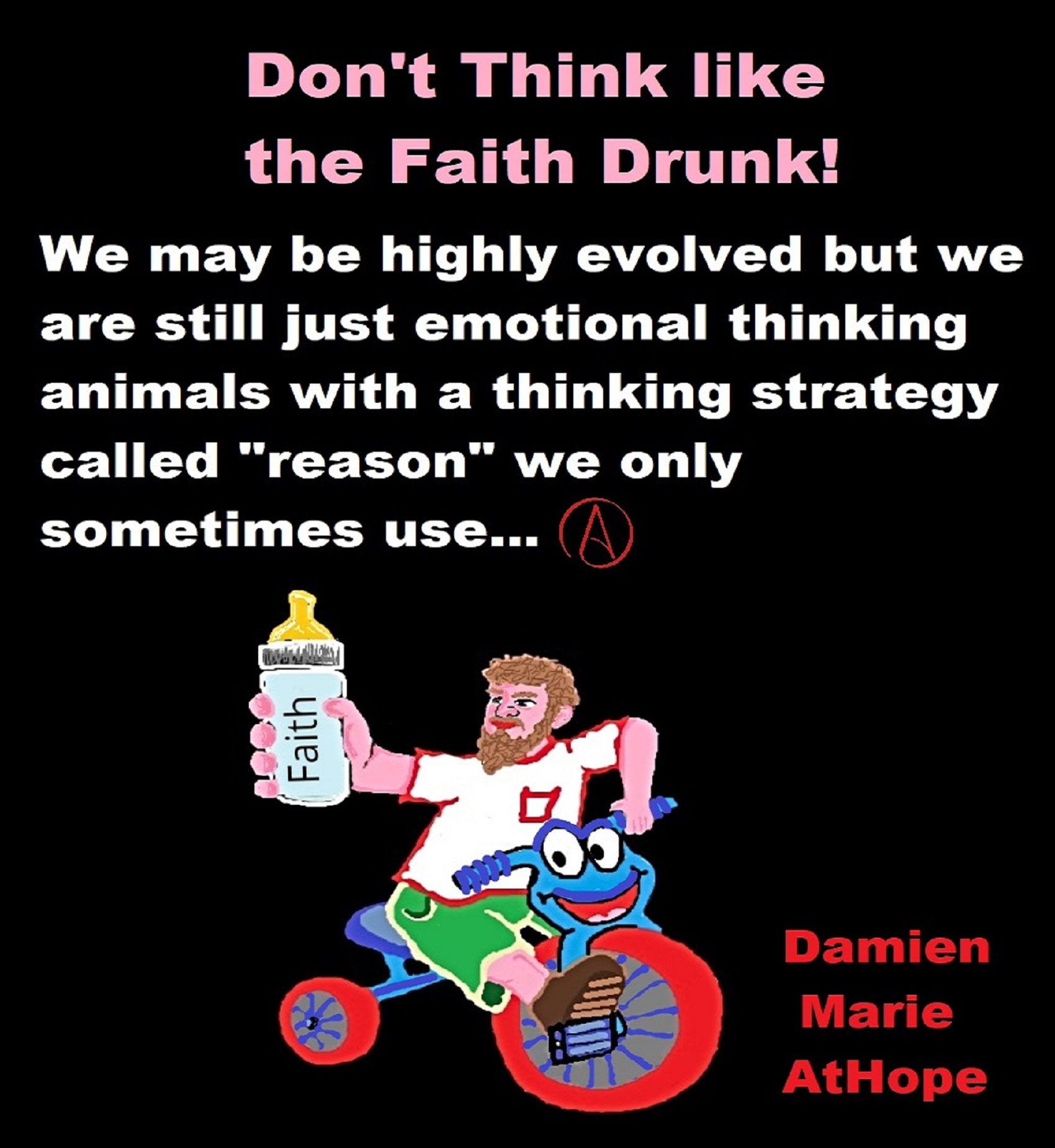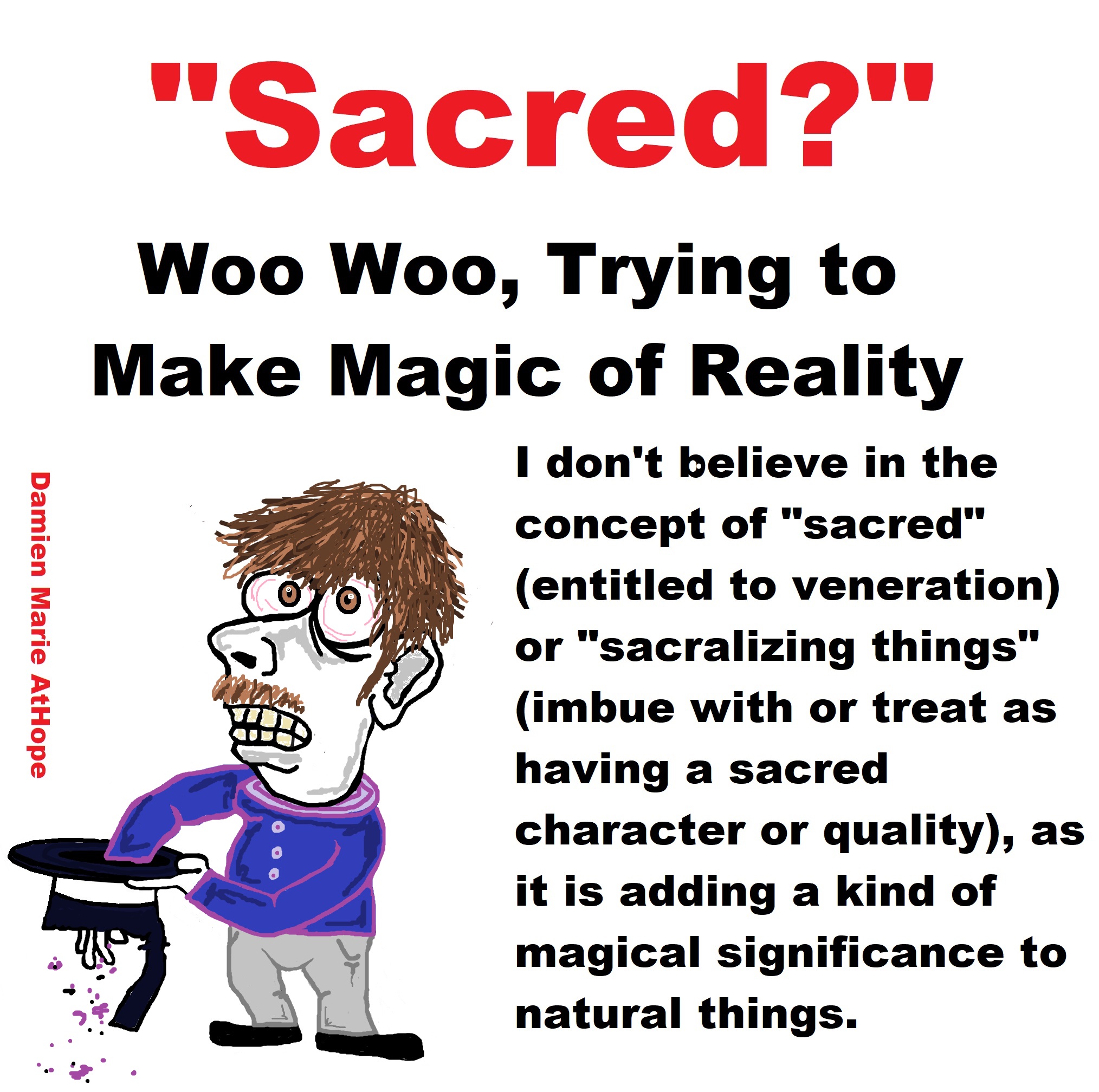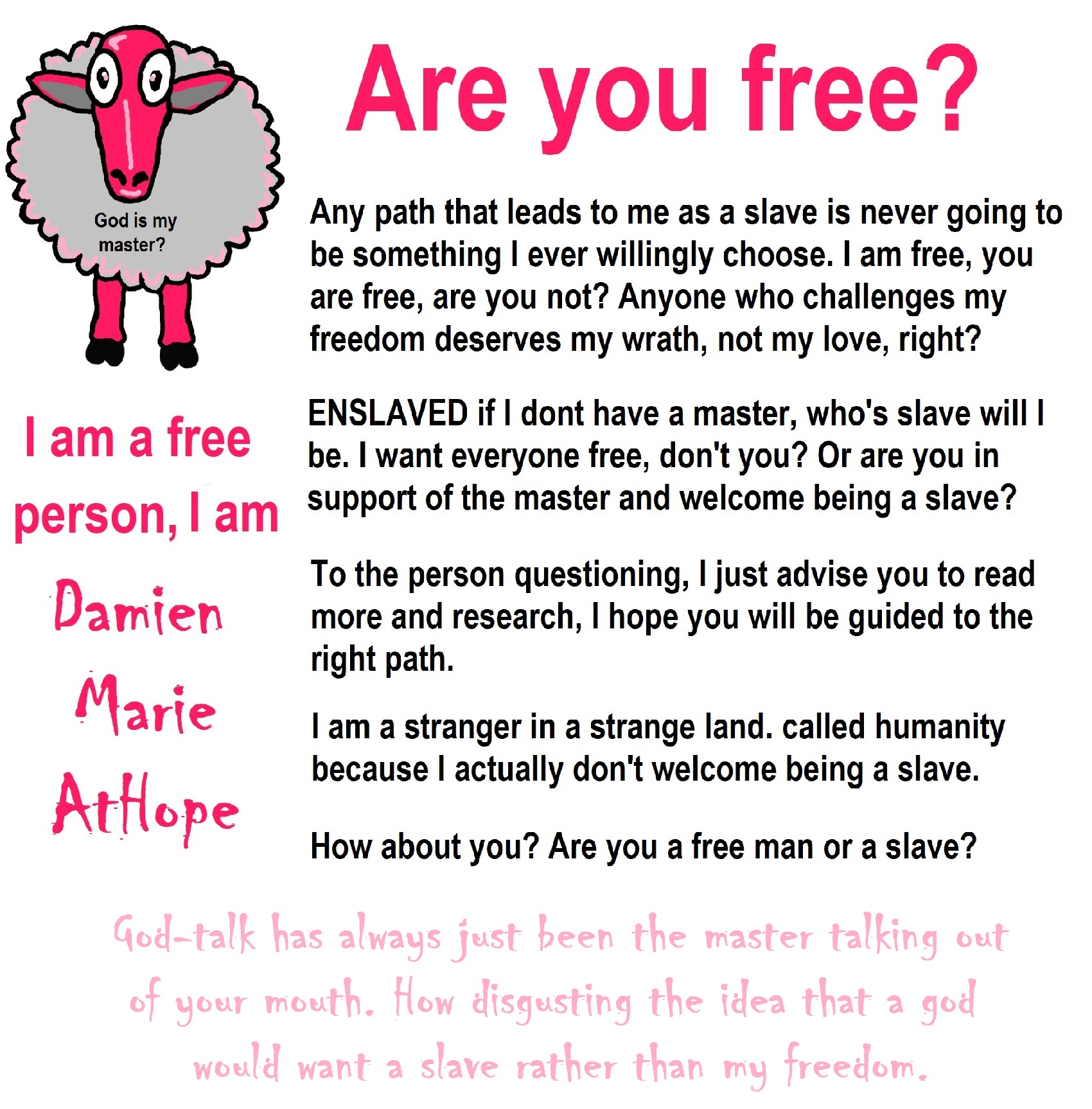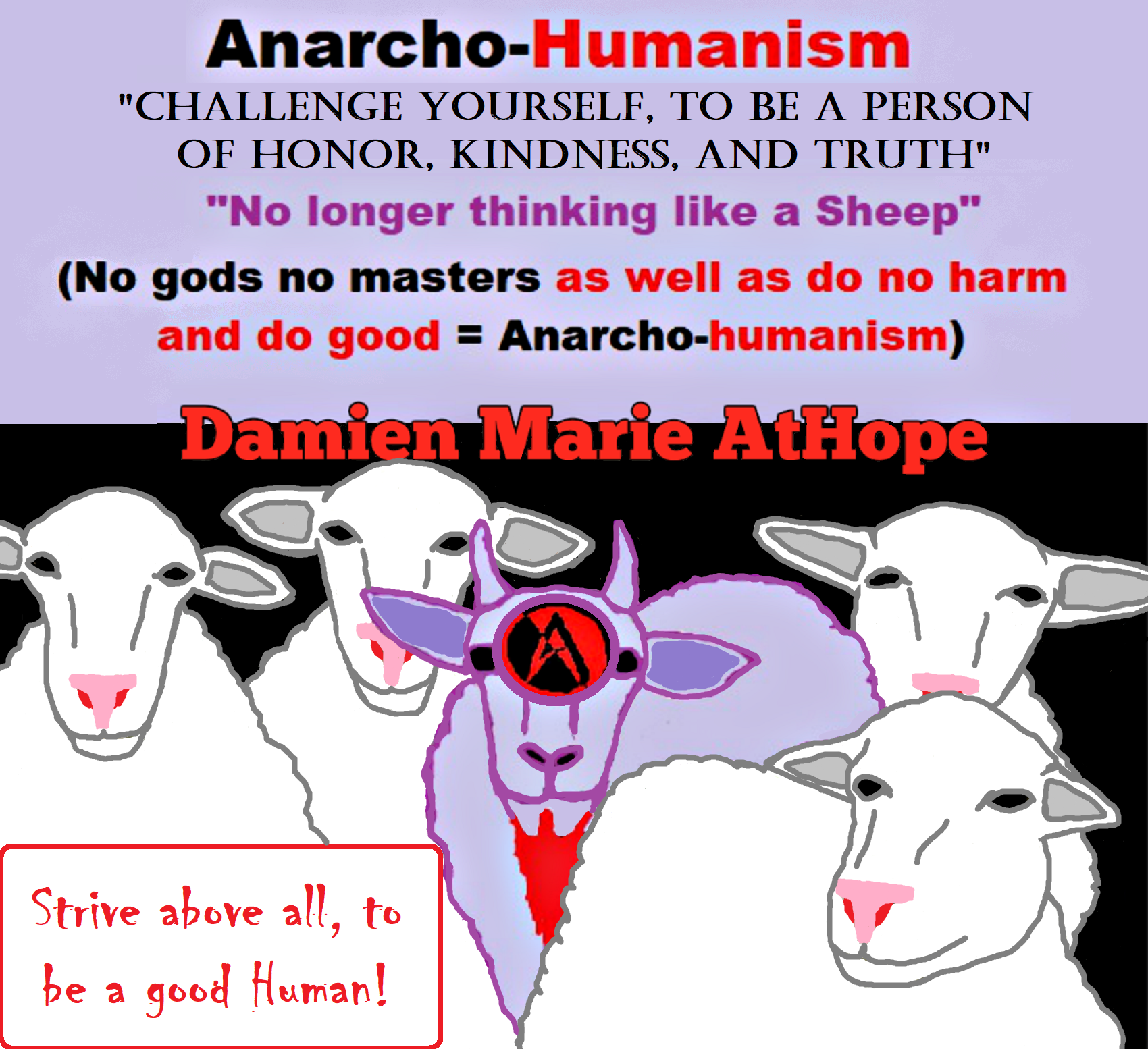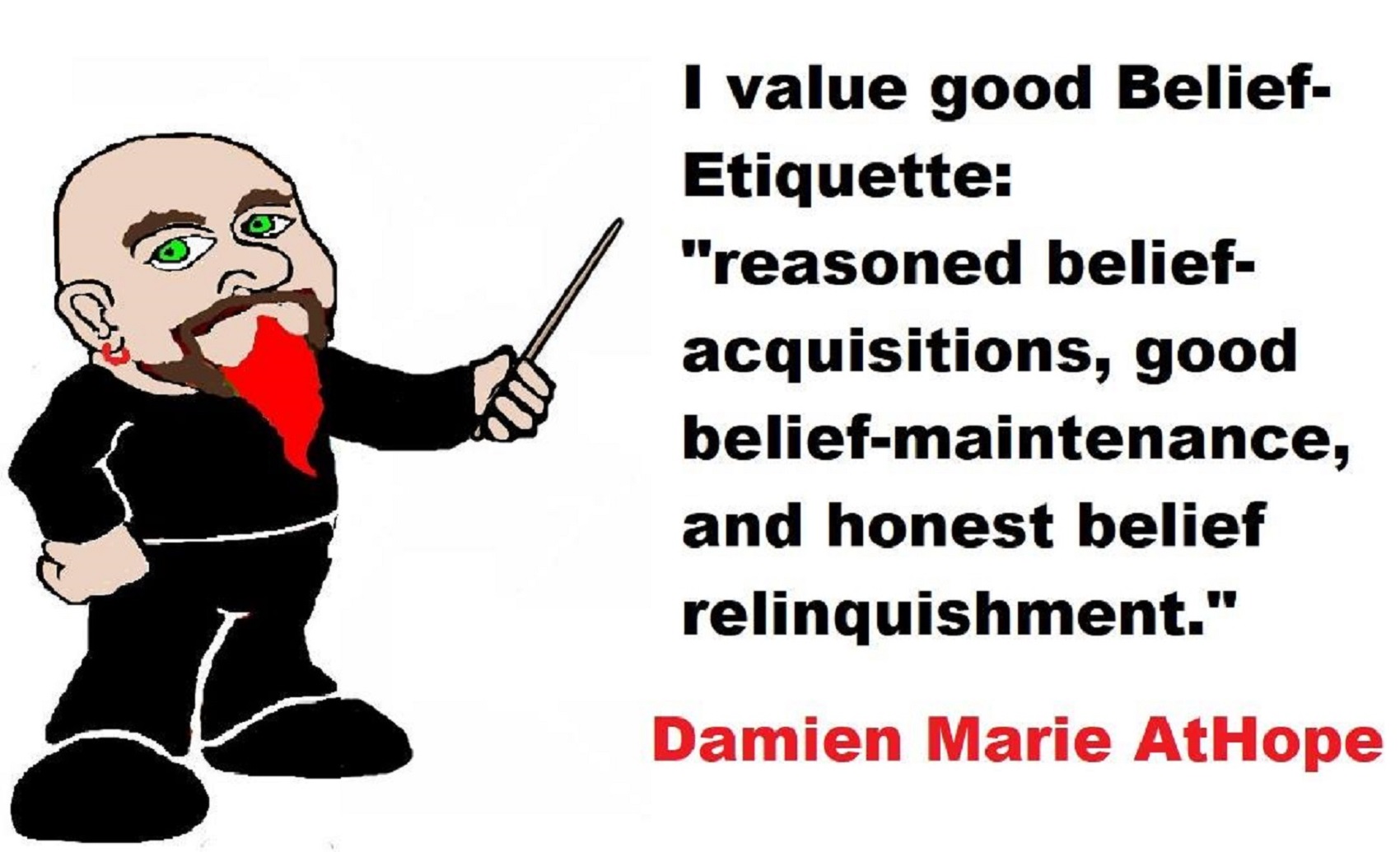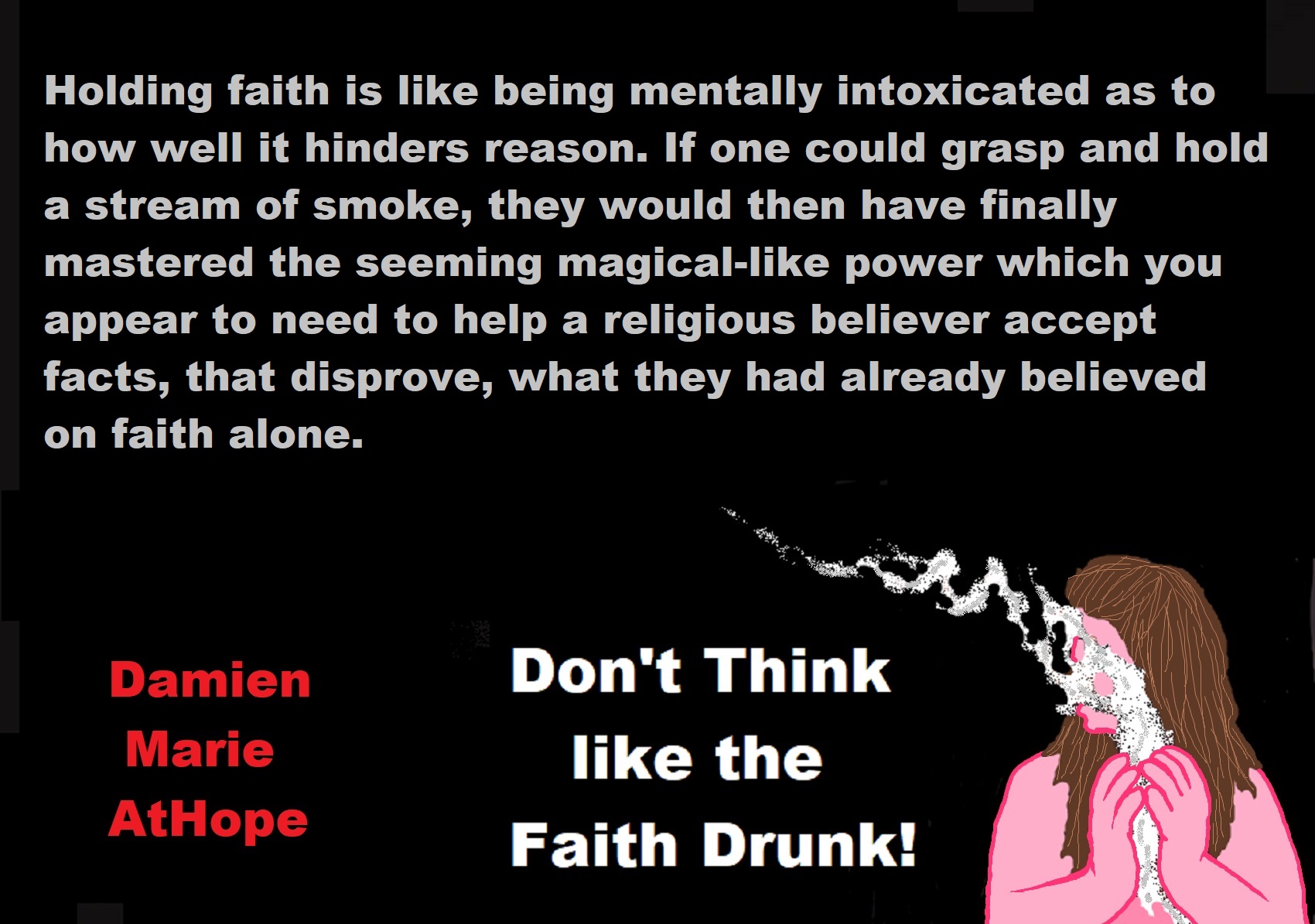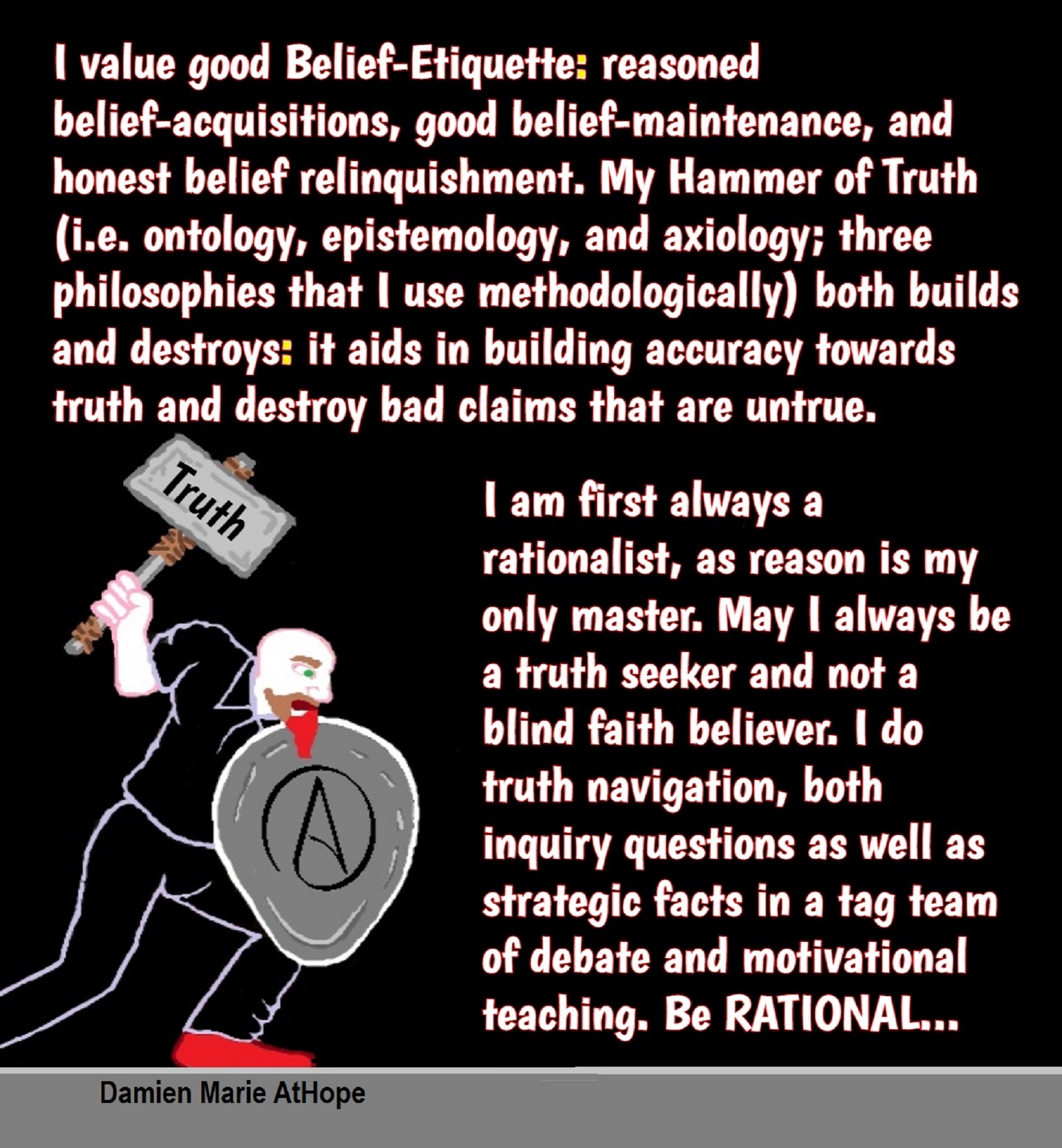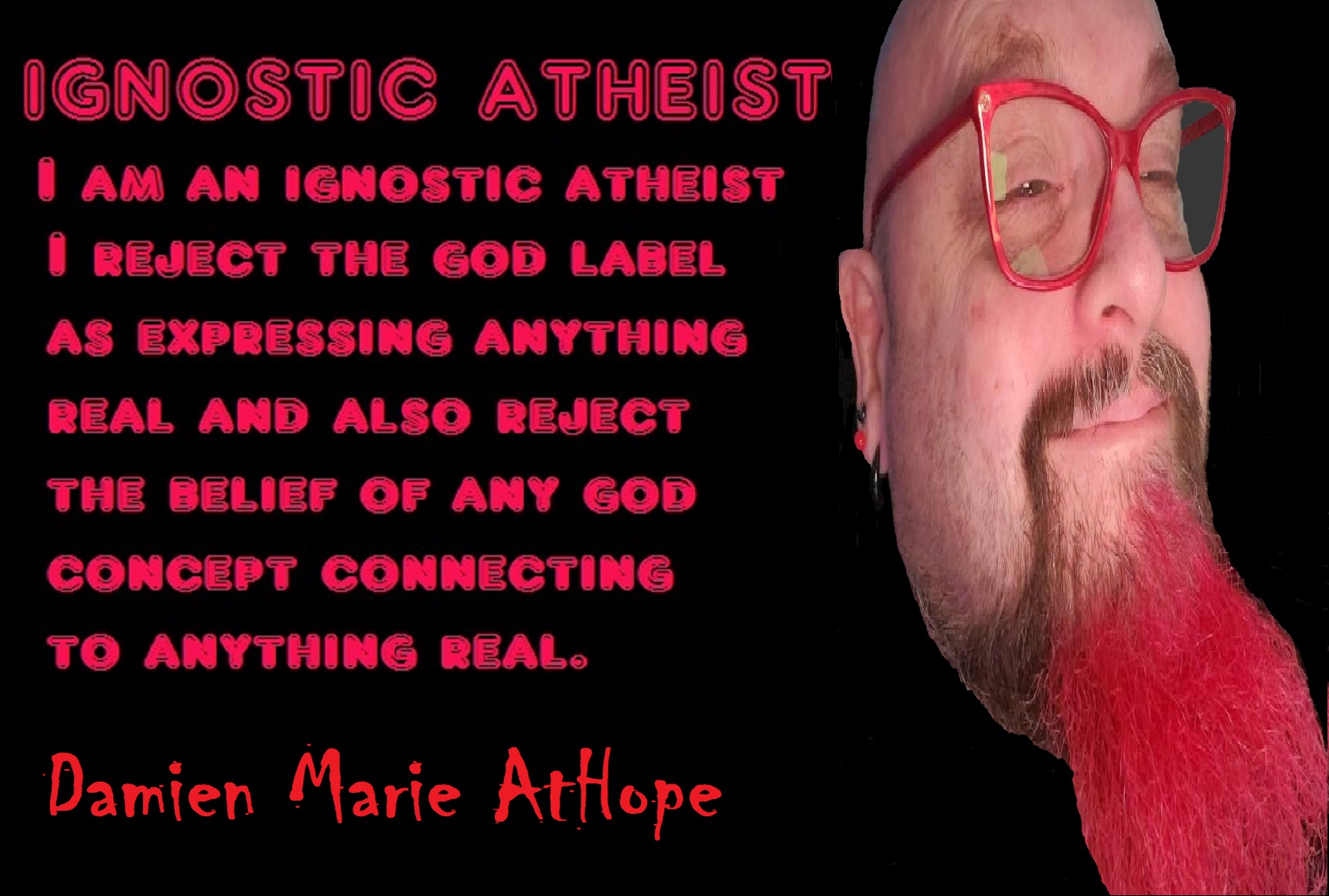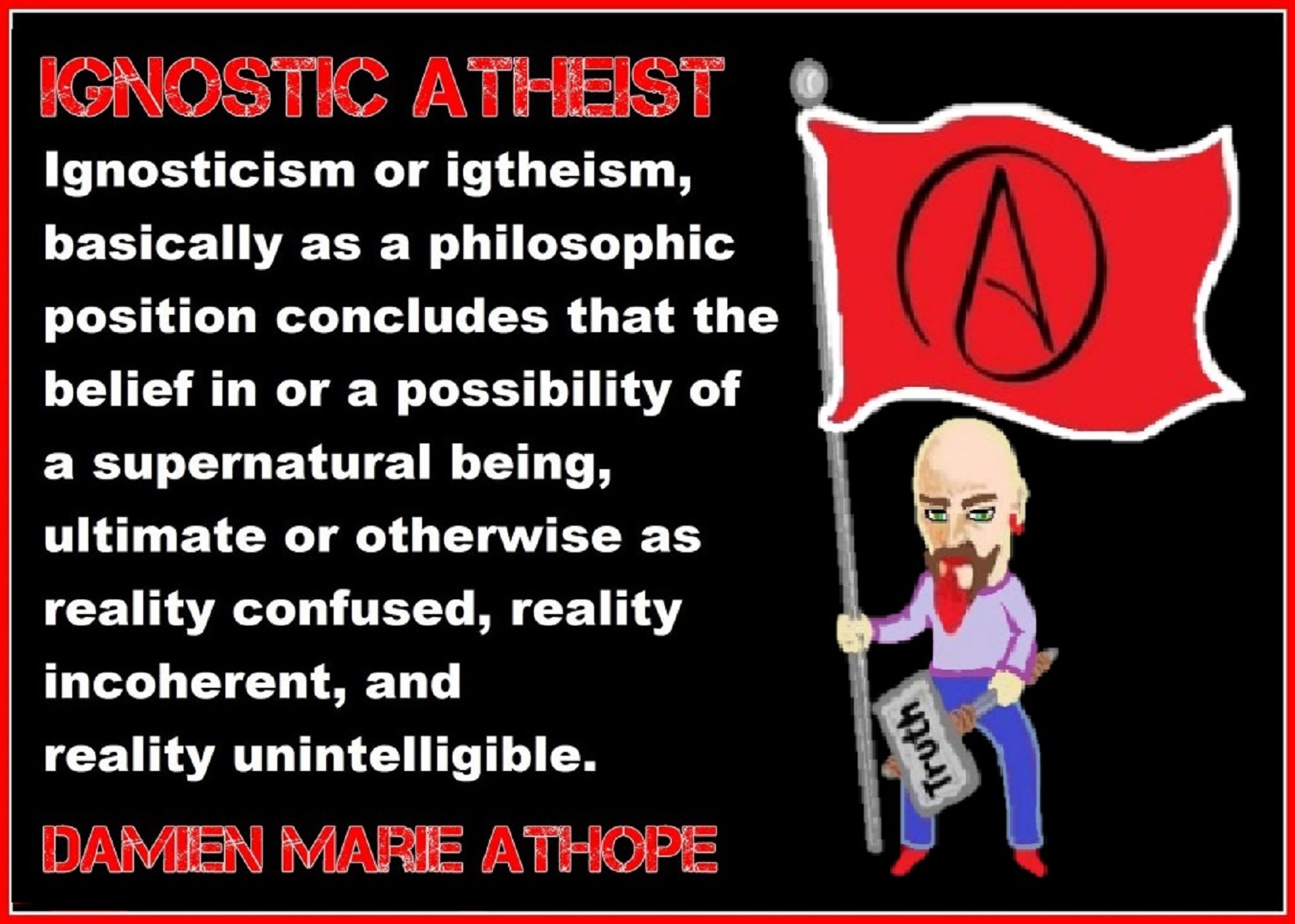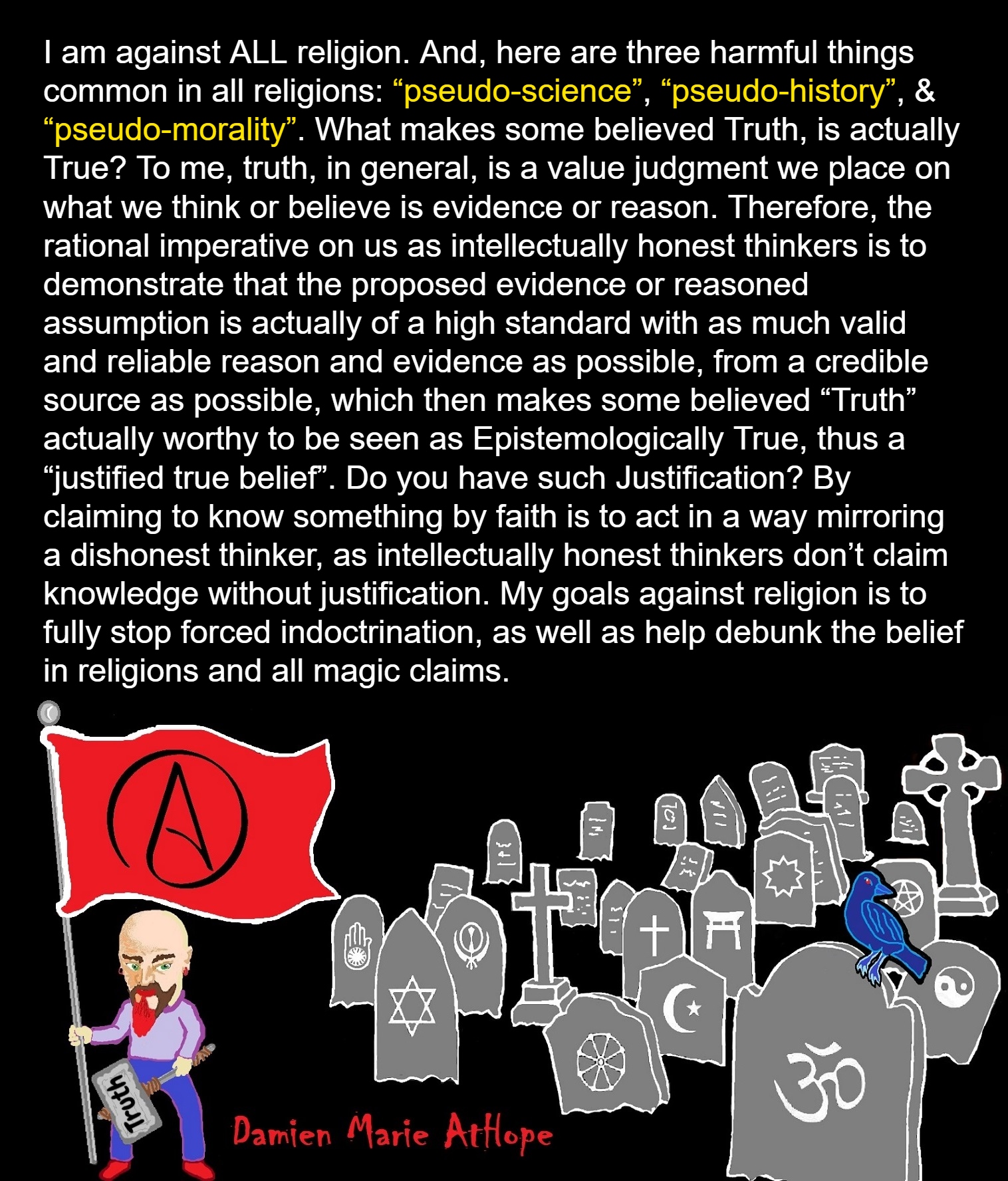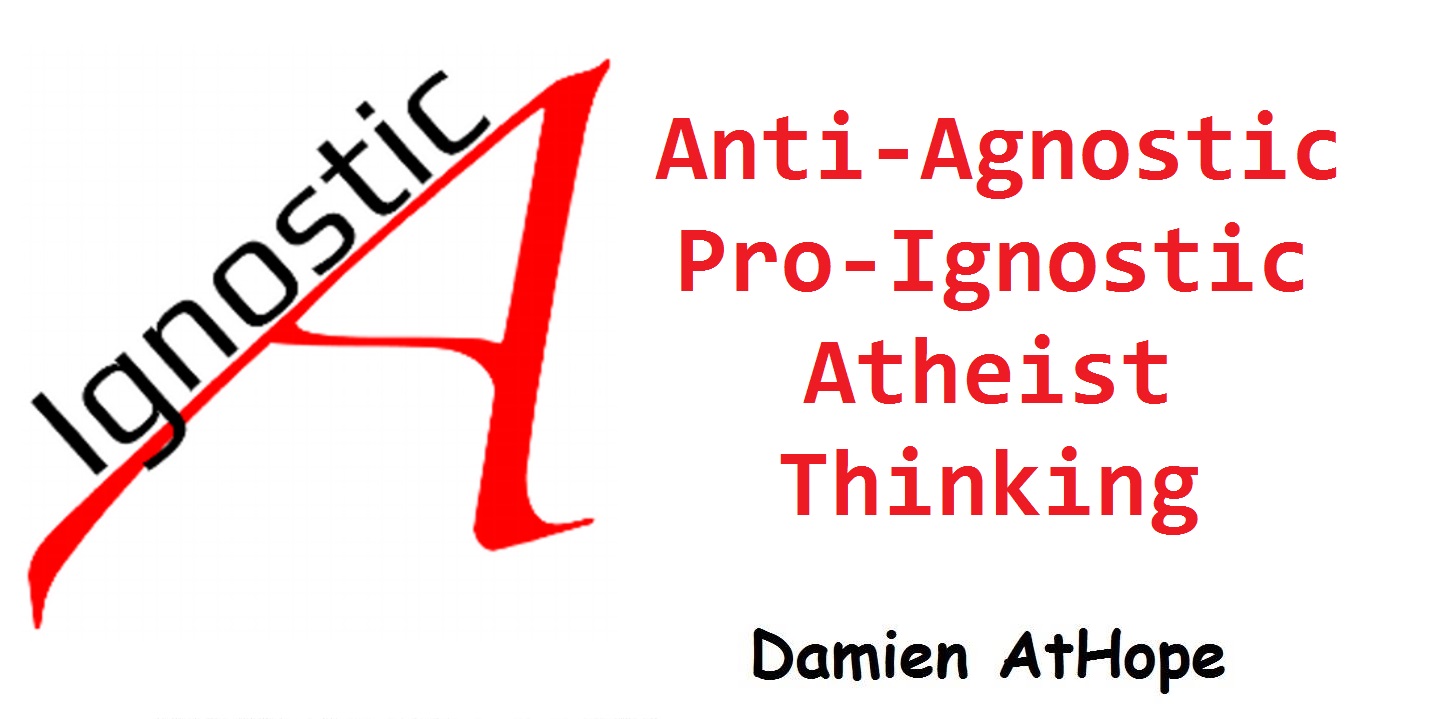
Atheist Addressing Agnostic Errors
“Theists, there has to be a god, as something can not come from nothing.”
Well, thus something (unknown) happened and then there was something. This does not tell us what the something that may have been involved with something coming from nothing. A supposed first cause, thus something (unknown) happened and then there was something is not an open invitation to claim it as known, neither is it justified to call or label such an unknown as anything, especially an unsubstantiated magical thinking belief born of mythology and religious storytelling.
Atheist Addressing Agnostic Errors:
- You can’t prove a negative.
- Logical internal evidence is not real evidence if not related to or with external confirmed evidence.
- There is no absolute certainty thus there is no certainty.
- Rejection of beliefs without evidence is the same as beliefs without evidence.
- The only logical choice is agnosticism in the god question.
- You must choose either agnostic (claim of unsureness to believe or reject, professed lack of evidence to believe or disbelieve) or gnostic (claim of sureness to reject or believe, professed belief in evidence to believe or disbelieve) in the god question.
I see you, “Religion”, resisting needed correction, to your unscientific supernatural theorizing. And thanks for having our backs, Science. By Science being willing to address needed changes relational to the most valid and reliable reason and evidence. A failed burden of proof is the god-talk’s most unaddressed part. You cannot prove one thing about the term god other than people choosing to believe it has any meaning at all. Theists don’t even universally agree to even begin to make gods probable. There is no absolute certainty in philosophy, there is only “psychological certainty” what one believes, or “epistemic” certainty, meaning what evidence represents or relates to. There is no evidence of God anything, thus one can be epistemically certain that all “god-something” claims fail. Theism is belief in a god or gods. “Active choice” belief. A-theism is not having a belief in a god or gods, this is true if one never heard stories of gods, not choosing atheism/being unsure, or making the choice to not believe is a kind/style of atheism.
People don’t commonly teach religious history, even that of their own claimed religion. No, rather they teach a limited “pro their religion” history of their religion from a religious perspective favorable to the religion of choice. Do you truly think “Religious Belief” is only a matter of some personal choice? Do you not see how cursive one’s world of choice is limited to the obvious hereditary belief in most religious choices available to the child of religious parents or caregivers? Religion is more commonly like a family, culture, society, etc. available belief that limits the belief choices of the child and that is when “Religious Belief” is not only a matter of some personal choice and when it becomes hereditary faith, not because of the quality of its alleged facts or proposed truths but because everyone else important to the child believes similarly so they do as well simply mimicking authority beliefs handed to them.
Because children are raised in religion rather than being presented all possible choices but rather one limited dogmatic brand of “Religious Belief” where children only have a choice of following the belief as instructed, and then personally claim the faith hereditary belief seen in the confirming to the belief they have held themselves all their lives. This is obvious in statements asked and answered by children claiming a faith they barely understand but they do understand that their family believes “this or that” faith, so they feel obligated to believe it too. While I do agree that “Religious Belief” should only be a matter of some personal choice, it rarely is… End Hereditary Religion! We are all travelers of humanity set adrift on a global ship, the Earth. We have a chance of greatness if only we can act as if humanity has a connecting value, one not lost simply because of different plots of earth we may reside or what hope we can sustain. Morality: “What is right/good/just action.” Morals (personal choice inner-self mortality thinking). Ethics (others responsible for inner-relational mortality behaviors).
I don’t believe in the supernatural notion of a “soul,” especially with our natural only evolution. Undesigned natural processes of evolution made us believing-machines. I am not an animist, thus I don’t believe in souls or spirits. How can I? When in our natural only evolution add magical anything? I can’t buy anything but natural, thus I can be labeled a Metaphysical naturalist (also called ontological naturalist, philosophical naturalist, and anti-supernaturalist). I see religions as conspiracy theories of reality just like their proposed god-something beliefs. These “Conspiracy Theories” are a hell of a drug, seeming to easily push out all sound reason and critical thinking, if it contradicts their chosen conspiracy theories beliefs. I use the Animism term as a definition of spirit-beliefs or a kind of Supernatural-Spiritism thinking, that to me, are in all spiritual or religious type beliefs, not primitive but core, it’s a common error supporting one’s chosen conspiracy theories beliefs. I see Animism as the original religion of all humanity and is still in all the religions of the world, and their foundational error of our natural-only world actually devoid of any so-called spirits to support Animism beliefs.
“Damien, you sent me a follow request. I’m not sure about it as you have anti religion in your bio while I’m definitely religiously observant Jewish. Do you think we’ll really fit.” – Questioner
My response, I support good people and am not a bigot. I see all religions as mythology. Others see only their religion as the “one true religion.” It is not a limitation, to have many religious people of contrary religion beliefs to be friends or work towards shared goals as humans, that are not related to religion or antireligion. Many if not most socialist movements have both religious and antireligionist people who work together in solidarity for more positive economic goals that help the working class. I am a socialist anarchist and I welcome all good humans. I once thought no one was friendly, so, I decided to start trying to be a friend to others. No one even seemed to care, so, I realized, I needed to care. No one really made “you” feel as if you mattered, so, I started valuing others, I see the world I wish to live in starts with me. After all other people are just fellow beings of dignity like me… “Hate of others” is a disgusting display of foolishness. Bigotry is the shame people smear all over themselves trying to look better than others.
Science like logic should follow truth devoid of political or religious/nonreligious beliefs or persuasions. To me, to do otherwise is to move away from science and thus risks falling into pseudoscience. To me, a valid “possibility” is not an all claims are open, rather it is inherently constrained to “the condition or fact of being possible.” We are like believing machines we vacuum up ideas, like Velcro sticks to almost everything. We accumulate beliefs that we allow to negatively influence our lives, often without realizing it. Our willingness must be to alter skewed beliefs that impend our balance or reason, which brings about a new caring awareness. Words matter? How many more words do I have in this life? We always act as if there is no limit but there at our passing to death, any more words are forever no more. If only given a few words, would I waste them on anger or hate? What if every word mattered, would I not want to use them to love? An “Intellectually honest mind” welcomes just correction and eagerly strives for what is true over what may be preferred.
May reason and evidence guide you. I strive to let evidence and reason guide me, thus if the status of evidence, for or against any claim, I would take it into consideration, and if soundly warranted I would amend beliefs to this changed status. Even a believed reasoned speculation could be wrong, in error someway, need some reworking, or complete relinquishment as a belief. I was thinking if we know group think can be a stronger motivator in beliefs and actions, how much blame should there be for engaging in it? Should we take into account the pressure of “group think” or say many pressures are always engaging us so all actions hold the same standard? I am not the thing abuse made and thus I champion reason and evidence to guide me. All understanding or claims of facts and Truth should be updated, amended, or changed when there is valid and reliable reason to do so. “Damien, philosophy is not science” My response, Have you ever heard of the philosophy of science? And if all philosophy was removed, science would stop happening at any advanced level.
Can a fact be changed to a non-fact? So, are science facts tentative and thus not absolute like science thinks truths or proof is? And if a fact is demonstrated to be a non-fact, is it not proven to be so, and is that now the new truth status whether or not a claim of truth is made? Many seem unaware that science involves philosophy, but most science communications don’t fully explain the philosophy in science. And even when they are somewhat explained it is likely limited and thus can add some confusion. I hear over and over again that there is no “science proof” only “science evidence or facts.” But a fact: is a thing that is known or proven to be true. Evidence: is the available body of facts or information indicating whether a belief or proposition is true or valid. Some even state any science that states “proves” … etc. Can never be true because science doesn’t prove things it only tries to disprove. To me, there is so much wrong with that, I will only offer one: this argument of “disprove”, is to “prove” it is not accurate or relatable to the claim.
“God is infinity, a universe with no beginning and no end (eternity). Not an entity who only takes in nice people, Deep hey?” – Theistic Challenger
My response, Do you have evidence of such a claim?
“Wow considering you call yourself a philosopher, you really haven’t got much of a imagination have you. ” – Theistic Challenger
My response, So, gods are limited to our imagination? Thus, not expressed in the real world?
“Well of course not, you will be telling me man has actually walked on the moon next. ” – Theistic Challenger
My response, So you favor more than just the conspiracy theory of reality “religion”, and other conspiracy theories, like doubting the moon landing. Do you think the earth is flat as well?
I don’t agree that debates are the same as discussions. I don’t do debates but will do discussions. I see debates as a win-lose and are about defending your side, to try and win, but in discussions, I am looking to navigate truth and thus we are both open to change. What we don’t understand we can come to fear. That which we fear may lead to hate. And what we hate we may seek to destroy. Thus, it is upon us to be open to understanding and not fall into the arms of hate and harm. Lack of humanity is a sickness of humanity. People can be so dogmatic on their own side, that anything that looks like it is not from your side it must be from your opposing side. It is the enemy of free thinking. I believe morality can be objective, but it is not what is used the most. Emotional-psychosocial-cultural (religion) motivations used to support their moral reasoning to make believed ethical decisions. One should have a belief etiquette in how they approach believing, keep believing, and letting beliefs go, or amend old beliefs, if one values Truth. I value reasoned Belief acquisitions, good Belief maintenance, and honest Belief relinquishment.
Correctability is a virtue and one of the shining examples of Correctability is a virtue and one of the shining examples why science is intellectually honest and trustable in its confirmations about facts found in reality, unlike the non-facts that faith beliefs find their home in, and which are devoid of the intellectual honesty correctability insures. God explained, you ask? Well, to simplify G.O.D. = Group Originated Delusion. Or more fully explained: “GOD”? Well, “Animism” is needed to begin supernatural thinking. “Totemism” is needed for supernatural thinking connecting human actions & related to clan/tribe. “Shamanism” is needed for supernatural thinking to be controllable/changeable by special persons. Therefore, together it is common that Gods as the overarching theme equals paganism, generally to me.
I see religion as a “theme” of supernatural thinking/beliefs as a honeycomb or connected tree of branching ideas (similar to language or stone tool technology: “a cultural product”), several connected cells all influencing the others, and while they are all different cells that are all part of the whole religion phenomenon. I do not see them as old or new but a cultural product that evolved again and again from several different factors, but the majority was by transfer from cultural diffusion to others, 1. By people movements, and 2. Idea transfer is not directly connected to people moving to live but through trade and cultural interactions both positive and negative. To me, religion as a cultural phenomenon (IE: several religions or religious ideas not grouped in a fully religious context but still influenced religiously/spiritually) it is several deviations and subsections all loosely connected in many loose ways. “Reasonable” in relation to doubt or truth are the same, which is “having sound judgment; fair and sensible.” Hate and aggression are easy, you see them every day and everywhere. It makes me proud to be for non-aggression, kindness, and care as it is so needed but seldom there. We rise by helping each other.
I don’t hate theists or agnostics; I simply think they are wrong
and use/champion many thinking errors.
Weak Theism and Weak Atheism being called Agnostic?
If you require your ideas to be protected from challenge. Then are you not admitting that your ideas are vulnerable to being destroyed by a challenge?
We start not knowing and theism is an active belief state so it is after not knowing so atheism is the default, not belief. To me, disbelief also comes after not knowing or thinking about the question of beliefs. Now it is true that until 7 children do have animism “magical thinking” styles in general, magical agency could be applied to anything by them, though to be honest, that is not the same as inferring this is theism belief. I will now offer helpful but simplistic definitions of why a position of atheism could be chosen it is of course just an over-generalization but it will highlight the main idea though it always will be more substantive in reality and who is applying it.
Here is my list of non-theistic and theistic assumptions:
Nonbelief:
- Weakest implicit Nontheistic/Atheism “negative” / “weak” / “soft” nonbelief similar to Nontheism
- Strong implicit Atheism “negative” / “weak” / “soft” nonbelief similar to Apatheist
- Weak Explicit Atheism “negative” / “weak” / “soft” atheists similar to Agnostic
- Strong Explicit Atheism “negative” / “weak” / “soft” atheists similar to Ignostic
- Strongest Explicit Atheism “positive” / “strong” / “hard” atheists similar to Antitheist
Belief:
- Weakest implicit Theistic thinking/Theism “negative” / “weak” / “soft” belief similar to Somethingism(Ietsism)/Vague Theism
- Weak implicit Theism “negative” / “weak” / “soft” belief similar to apatheist theists.
- Weak Explicit Theism “negative” / “weak” / “soft” theists similar to agnostic theism.
- Strong Explicit Theism “positive” / “strong” / “hard” theists similar to standard theism.
- Strongest Explicit Theism “positive” / “strong” / “hard” theists similar to Gnostic
What is a god?
Allowing that magical thinking or the possibility of magical thinking being real is clearly not supported by any facts in reality. Thus, it is just more a social engineering “indoctrinated belief” connected to learned magical thinking supernaturalism and/or superstitionism. When asked whether they believe in the existence of one or more Gods and/or Goddesses, Theists will say yes; strong Atheists will say no. Agnostics will say I don’t know or often cannot give a straight “Yes” or “No” answer but are still either classified as either Weak Theism or Weak Atheism as it’s a belief question and no matter how one tries to add or subtract other things the main issue still is, “do you believe in theism” if the answer is anything but yes or some variant of maybe yes then it’s a no; thus one is an atheist as all it takes is a lack of believing theism but it can be disbelief, even a beliefs there is no god. Agnostics might respond with one of the following (Weak Theism or Weak Atheism): One may ask what about just plain Agnosticism, Well there is no plain Agnosticism to me it is either some kind of weak theism or weak atheism, and thus people are labeling themselves as agnostics but actually are some kind of weak theism or weak atheism.
Weak Theism and Weak Atheism Agnostics?
*Weak Theism (Agnostic)?
Weak Theism: Yes, a god(s) and/or goddess(es) exists though I am not sure or don’t know about god(s) and/or goddess(es) at this time.
Weak Theism: Yes, a god(s) and/or goddess(es) exists. However, we have no possibility or certainty of knowing anything about God, now or in the future.
Weak Theism: I think that a god(s) and/or goddess(es) exists but have no proof.
Weak Theism: I think so but cannot be positive that a god(s) and/or goddess(es) exists.
Weak Theism: I don’t know but will lead my life assuming that a god(s) and/or goddess(es) does exist just to be careful, perhaps because of the rewards or to stop some punishments one would receive if a god(s) and/or goddess(es) does exist.
Weak Theism: I worship a god (or a god and goddess, or a goddess, or some combination of god(s) and/or goddess(es) but cannot prove that they exist.
Weak Theism: I doubt it but cannot be sure a god(s) and/or goddess(es) doesn’t exist.
*Weak Atheism (Agnostic)?
Weak Atheism: I don’t know if a god(s) and/or goddess(es). (So, they don’t believe theism thus are atheists)
Weak Atheism: There will never be any way to know. (So, they don’t believe theism thus are atheists)
Weak Atheism: There is no way to know, but perhaps someone will find a proof or disproof in the future. (So, they don’t believe theism thus are atheists)
Weak Atheism: I cannot give an opinion because there is no way that we can prove the existence or non-existence of God given currently available knowledge. (So, they don’t believe theism thus are atheists)
Weak Atheism: I don’t know but will lead my life in the assumption that no god(s) and/or goddess(es) exists. (So, they don’t believe theism thus are atheists)
Weak Atheism: I will have to withhold my opinion/belief until god(s) and/or goddess(es), if one or many exist, decides to make his, her or their presence known by a strong provable indicator, which until now has ever happened. (So, they don’t believe theism thus are atheists)
Weak Atheism: The god(s) and/or goddess(es) that various believers worship are like unicorns: they are obviously fictional. However, who knows, I do not have certain disproof.
Feel you don’t know what god is or could be you might be an Ignostic but if so you don’t or can’t believe in theism. Ignosticism is the idea that the question of the existence of God is meaningless because the term “god” has no unambiguous definition. Ignosticism requires a good, non-controversial definition of god before arguing on its existence. (So, they don’t believe in theism and thus are atheists)
Feel you don’t care what god is or could be you might be an Apatheist but if so you don’t believe in theism. An apatheist is someone who is not interested in accepting or denying any claims that gods exist or do not exist. An apatheist lives as if there are no gods and explains natural phenomena without reference to any deities. (Thus, they don’t believe in theism and thus are atheists)
“Damien, have you heard of the website for Agnostics?” – Questioner
My response, I am not agnostic, so yes, while I have heard of the website, it does not interest me I would be classified as anti-agnostic. Thanks for asking.
“Damien, I love almost everything about you, but how can one be MORE than an agnostic without being dishonest with themselves? I mean, we tell the right they need to have evidence and use logic,… but then as atheists, one does the very thing they just said not to do to religious people… We cannot know for a FACT that there is a god, I understand that… But without some evidence to the contrary, we can’t KNOW that there ISNT…. Human intellect and logic only goes so far… Sure, I CHOOSE to live as though there is no god, but in being perfectly honest with ME, I cannot say there isn’t until I have proof… And the argument that you can’t prove a negative is debunked… In math, you can prove a negative, so you can do it in other realms as well… The point is, no evidence, no proof, no belief or disbelief. And using the other argument that an atheist is BORN THAT WAY, because it is just no belief is a bunch of crap. By now, atheists have proven that there is a logical thought-based attachment to the term “atheist”. One can bring out the definition all one wants, but the evidence is born out every day in the life of an atheist that it is a CHOICE one makes after having weighed the AVAILABLE evidence (or lack thereof) for a god, and dismissing it. The most honest position is to say, “I DON’T KNOW, but I CHOOSE to act or be this way”. It has nothing to do with not having balls, or not having an education or intellect ( I have multiple degrees and a 146 IQ).” – Challenger
My response, Did you read any of my blogs on Agnostism???
“IS it rational to ASSUME anything without evidence????? Didn’t you just justify the religious faith of billions????” – Challenger
My response, What! What is a god? Stop claiming to know “things” you do not know nor which you have no clue.
“Damien Marie AtHope if you didn’t understand that then you didn’t read it…. you ASSUMED…. that is performing an action of thought without the requisite LOGIC knowledge to support it, is it NOT?? How then, do you define faith?” – Challenger
My response, You don’t have a universal claim of what a god is, so first do that and make it valid and reliable to even require an assessment.
“Damien Marie AtHope Funny that you would IMMEDIATELY resort to ASSUMING that I believe in a god….Again, you’re assuming something on the basis that I provided an opposition to your thinking…. shame on you.” – Challenger
My response, I understand that all claims of god are made up nothing devoid of any kind of valid and reliable justification or warrant.
“Damien Marie AtHope and the belief you don’t have to provide an argument for something not proven is an easy out for the person that cant admit they don’t KNOW something but nevertheless claim there is no such thing……… Your problem is you try to shut down all dialog with the same claim….” – Challenger
My response, Again, no value is offered to require an assessment for the term god that is not truly anything.
“Damien Marie AtHope that you SAY is not truly anything…. smfh, and again, you shut down all dialog why???? Do you just not WANT to have the conversation??? Do you think there is a possibility there may be a flaw I YOUR logic so you don’t want to pursue it? I don’t understand… help me to understand, instead of stomping on me.” – Challenger
My response, No, I demand a valid offering of the claim and I know that not a person on the Earth can provide me what I asked and thus it is their failure to establish the burden of proof, not me. Lol And, great read my blogs and then ask me specific questions if you like.
“Damien Marie AtHope and AGAIN, because you can’t get past that SAME LAME front, you won’t try to think any more than the position you CHOOSE to hold… that’s sad.” – Challenger
My response, Do you think logic is evidence?
“Damien Marie AtHope I did… and I JUST DID! Do you??? Be careful how you answer as you will destroy your own walls….” – Challenger
My response, Ask it again relating to a claim I made in the blog.
“Damien Marie AtHope do you think LACK of evidence is evidence?” – Challenger
My response, Reason is my only master. And, No, I can “validate” all my claims.
“Damien Marie AtHope you just want to control things… I see that now… NO, I will ask it in the way I CHOOSE to… you will refuse to answer on that basis, proving my point for me. Damien Marie AtHope so you’re perfect?” – Challenger
My response, Is reason evidence? Archaeological, Scientific, & Philosophic evidence shows the god myth is man-made nonsense: https://damienmarieathope.com/2017/10/archaeological-scientific-philosophic-evidence-showing-the-god-myth-is-man-made-nonsense/
“NO!!! Don’t go to pointing me to other places… that is BULLSHIT! And that does NOTHING anyway, as I am NOT TRYING TO PROVE A GOD…. See? you lack the understanding as to what my position even is….. You do this often.” – Challenger
My response, What is a god to doubt? I don’t start my disbelief on the dilutions of god claims I assess are these claims warranted they are not so nothing to doubt so agnosticism starts with a presupposition of the term god to say they are unsure about, thus to me making a thinking error as there is no presupposition god term to reality. I stand with ignosticism, roughly that the term god is given to much leeway as a valid offering of a possible real thing when no god claim if limited to only reality coherent attributes all add nonsense like supernatural things one of which at its simplest a being or at least a thinking thing with no physical mind but can think, an invisible thing and of courses an immaterial thing such as the no physical body in any way. And there we see the problem with accepting any god claim as even reality coherent as it is not. All claims must be coherent with or correspond to reality and just like many theological nonsense terms such as the soul. I don’t know what people are talking about when they say the term “soul” (it’s a made-up concept which connects to nothing that is reality coherent) as there is no part of the body exhibits as such magic thinking idea, soul, thus a debunked claim and does not need doubt. Similarly, I don’t know what people are talking about when they say the term “god” (it’s a made-up concept that connects to nothing that is reality coherent) as there is no part of the body exhibits as such magic thinking idea, god, thus a debunked claim and does not need doubt. Kurtz, New Skepticism, 220: “Ignosticism or igtheism, finds the belief in a metaphysical, transcendent being basically incoherent and unintelligible.” And moreover, “Ignosticism or igtheism is the idea that every theological position assumes too much about the concept of God and other theological concepts; including (but not limited to) concepts of faith, spirituality, heaven, hell, afterlife, damnation, salvation, sin and the soul. Ignosticism is the view that any religious term or theological concept presented must be accompanied by a coherent definition. Without a clear definition, such terms cannot be meaningfully discussed. Such terms or concepts must also be falsifiable. Lacking this, an ignostic takes the theological noncognitivist position that the existence or nature of the terms presented (and all matters of debate) is meaningless. For example, if the term “God” does not refer to anything reasonably defined then there is no conceivable method to test against the existence of god. Therefore, the term “God” has no literal significance and need not be debated or discussed.
“Damien Marie AtHope and therein lies your contradiction!” – Challenger
My response, It is not bullshit to provide blogs that explain what you are trying to ask and I have been arguing with agnostic thinkers for over 10 years.
“Damien Marie AtHope and REPOSTING a repaste of the link I wished NOT to read is lame.” – Challenger
My response, There is no contradictory thing I stay what is a god, then challenge the offered assumptions.
“Damien Marie AtHope, it is bullshit to not form ORIGINAL thought SPECIFICALLY tailored to MY specific question in the NOW…. And, you’re trying to START the conversation with your OWN premise….” – Challenger
My response, Wrong, I start with “What is a god” question, remember, the one, no one can offer?
“Damien Marie AtHope AGAIN, I READ IT IN THE PAST!!!! YOURE the one not reading… and if you’re done like that, then you’re not the person you claim to be… you just lost my respect and unfriending. You just corporatized yourself, you’re no better than a bully.” – Challenger
My response, You do know that I am not the only public atheist what is not agnostic right so is Aron RA, Matt Dillahunty, David Silverman, and Peter Boghossian?
“Damien Marie AtHope so? I thought you were done… I was talking TO YOU because I respected you…. You want to treat me like a cookie cutter cut out you can throw pre-worded dialog at…. I deserve better than that. I am done here.” – Challenger
My response, Well, to you asking me if reason was evidence, absolutely. In a general way, all reality, in a philosophic sense, is an emergent property of reason, and knowing how reason accrues does not remove its warrant. Feelings are experienced then perceived, leading to thinking, right thinking is reason, right reason is logic, right logic is mathematics, right mathematics is physics and from there all science.
My response, Here is why “Reason is my only master”
The most Base Presupposition begins in reason. Reason is needed for logic (logic is realized by the aid of reason enriching its axioms). Logic is needed for axiology/value theory (axiology is realized by the aid of logic). Axiology is needed for epistemology (epistemology is realized by aid of axiology value judge and enrich its value assumptions as valid or not). Epistemology is needed for a good ontology (ontology is realized by the aid of epistemology-justified assumptions/realizations/conclusions). Then when one possesses a good ontology (fortified with valid and reliable reason and evidence) they can then say they know the ontology of that thing.
I think, right thinking is reason. Right reason is logic. Right logic, can be used for mathematics and from there we can get to science. And, by this methodological approach, we get one of the best ways of knowing the scientific method. Activating experience/event occurs, eliciting our feelings/scenes. Then naive thoughts occur, eliciting emotions as a response. Then it is our emotional intelligence over emotional hijacking, which entrance us but are unavoidable and that it is the navigating this successfully in a methodological way we call critical thinking or as In just call right thinking. So, to me, could be termed “Right” thinking, that is referring to a kind of methodological thinking. Reason is at the base of everything and it builds up from pragmatic approaches. And, to me, there are three main approaches to truth (ontology of truth) from the very subjective (Pragmatic theory of truth), to subjective (Coherence theory of truth), then onto objective (Correspondence theory of truth) but remember that this process as limited as it can be, is the best we have and we build one truth ontop another like blocks to a wall of truth.
Here is a response from another person seeing this dialog:
“Damien Marie AtHope I’ve encountered this troll before. Don’t waste your time. He’ll be threatening you next from whatever made up a place he claims to live in. When I dealt with him he was from Portland. Your best bet is to block this clear theist troll. I don’t argue with avatars and you are an obvious theist troll. Peace…” – Other Respondent
“And remember you piece of shit, I BLOCKED YOU!! (Other Respondent), you run your mouth online, JUST LIKE YOU ARE DOING HERE, then when I give you my address to come talk that shit in person, you run away like THE TROLL YOU ARE! And thank you for proving my point once again.” – Challenger
I blocked you, bro. Now you are lying. And this is your 4th or 5th profile I’ve seen you under. Explain that?
(Other Respondent), yet here you are….” – Challenger
Not to argue with you. I’m only here to let Damien Marie AtHope know who he is dealing with.
“No, I am NOT an OBVIOUS theist anything. If oyu had ANY intelligence, you would see that I am an OBVIOUS AGNOSTIC human being, and YOU are STILL the proven troll. Again… yet here you are… trolling. (Other Respondent), so Damien is too stupid??? Is that what you’re saying??? Damien, EVEN I give you more credit than that!!! Now burn the fuck out you piece of coward shit troll. NO, I BLOCKED YOU!!! Why are YOU lying???!!! I have PLENTY of accounts… Why is THAT any of YOUR business??? Nor does it change the definition of a troll…AGAIN, you’re here spreading LIES that can be PROVEN BY my multiple accounts… I am NOTHING like a theist. Troll, you don’t do definitions though I see… And, Damien, you REALLY should find a better base. At least Trumps ADMIT they don’t care about the truth…“ – Challenger
My response, Challenger, you are the one now acting troll-like and you have tried many personal attacks on me and now others, simply this is not acceptable and not a valid way to talk to people. Please improve your discussion etiquette, as I would and do value as a positive intellectual standard of sticking to ideas and not making it about the people, thanks.
“Damien Marie AtHope I am most CERTAINLY not the one acting troll-like. AGAIN, the definition fits HIS comment, NOT mine…AND AGAIN, all I did was ask a question you went off… stop lying… Personal attacks???? wow… poor you. NOt making it about the people?? Really? You just said that with a straight face???? “So you are not reading then I am finished talking about this with you, cool. Take care.” THIS is why I unfriended you… you’re a liar and a deceiver… AND you make it all about you…. then accuse me of attacking you… I NEVER attacked YOU, I attacked you THINKING… but GOD forbid someone should EVER do that to the great late Damien Marie AtHope… smfh. Then to top it off,… you call ME a troll when WE were the ones IN A CONVERSATION.. or trying to… and then this piece f shit jumps in, THE DEFINITION of a troll… but you IGNORE him because he AGREES with you… YOURE THE ONE that made this the shit it is… Don’t try turning it around. You’re a TYPICAL atheist and prove my point all the way. Atheists are NEVER wrong… And everyone else ALWAYS is… smfh…” – Challenger
My response, Challenger, And this behavior by you is why I am now happy if you do unfriended me. Take care.
Damien, how do you feel about agnostics?:
“Damien, how do you feel about agnostics, such as myself. I admire some of the values of some religions as a guide to life, but I get to choose. I am with Pascal and Einstein, I don’t think the concept of God is rational, but I lose nothing by being a decent person, just in case.” Questioner
My response, How you pose the question of how I feel about agnostics, seems to infer that people who are agnostic unless I am misunderstanding, and on such a question of how I feel towards my fellow humans, agnostic or otherwise, well I strive to treat them humanistically, fairly, and equally. If you are instead asking if I am consenting in any way to agnostic thinking, my answer would unequivocally state no. I see agnostic thinking as a flaw in reasoning that seems to at least in some way accept the empty assertions of religion. I always work to attack thinking and not people. Furthermore, I have friends on Social Media who are religious, and don’t attack or even give them a hard time, I just address my thinking on my pages not at anyone unless they challenge me or the like.
Philosophy Definitions of “Agnosticism”
“The word atheism comprises the word theism with the prefix ‘a’. So let’s break it down. Theism is the belief in a god or gods. The prefix ‘a’ means; ‘without’ or ‘lack of’. Therefore, atheism means ‘without a belief in a god or gods’ or the ‘lack of a belief in a god or gods’.” ref
Philosophy Definitions of “Agnosticism”
From: “The Stanford Encyclopedia of Philosophy“
By Paul Draper PhD, Philosophy // Faculty at the University of California, Irvine
First “Atheism” is typically defined in terms of “theism”. Theism, in turn, is best understood as a proposition—something that is either true or false. It is often defined as “the belief that God exists”, but here “belief” means “something believed”. It refers to the propositional content of belief, not to the attitude or psychological state of believing. This is why it makes sense to say that theism is true or false and to argue for or against theism. If, however, “atheism” is defined in terms of theism and theism is the proposition that God exists and not the psychological condition of believing that there is a God, then it follows that atheism is not the absence of the psychological condition of believing that God exists. Then the “a-” in “atheism” must be understood as negation instead of absence, as “not” instead of “without”.” ref
“In Grammar, negation, is the denial of the truth of a clause or sentence, typically involving the use of a negative word (e.g. not, no, never) or a word or affix with negative force (e.g. nothing, non-).” – Oxford Dictionaries.com
“In Logic, negation, is a proposition whose assertion specifically denies the truth of another proposition. ‘the negation of A is, briefly, ‘not A.” – Oxford Dictionaries.com
“While identifying atheism with the metaphysical claim that there is no God (or that there are no gods) is particularly useful for doing philosophy, it is important to recognize that the term “atheism” is polysemous—i.e., it has more than one related meaning—even within philosophy. There is more than one “correct” definition of “atheism”. Departing even more radically from the norm in philosophy, a few philosophers and quite a few non-philosophers claim that “atheism” shouldn’t be defined as a proposition at all, even if theism is a proposition. Instead, “atheism” should be defined as a psychological state: the state of not believing in the existence of God (or gods). Scholars can then use adjectives like “strong” and “weak” to develop a taxonomy that differentiates various specific atheisms. Also, in none of those senses is one required to be an atheist in order to be an antitheist, so antitheism is not a variety of atheism.” ref
“Moreover, the “a-” in “atheism” must be understood as negation instead of absence, as “not” instead of “without”. definition has the added virtue of making atheism a direct answer to one of the most important metaphysical questions in philosophy of religion, namely, “Is there a God?” There are only two possible direct answers to this question: “yes”, which is theism, and “no”, which is atheism. Answers like “I don’t know”, “no one knows”, “I don’t care”, “an affirmative answer has never been established”, or “the question is meaningless” are not direct answers to this question.” ref
“Atheism is commonly divided into two types: strong atheism and weak atheism. Although only two categories, this distinction manages to reflect the broad diversity which exists among atheists when it comes to their positions on the existence of gods.” – thoughtco.com
“Implicit atheism is simply the state of not believing in any gods.” – rationalwiki.org
“Weak atheism, also sometimes referred to as implicit atheism, is simply another name for the broadest and most general conception of atheism: the absence of belief in any gods. A weak atheist is someone who lacks theism and who does not happen to believe in the existence of any gods — no more, no less. This is also sometimes called agnostic atheism because most people who self-consciously lack belief in gods tend to do so for agnostic reasons.” – thoughtco.com
“Strong atheism, also sometimes referred to as explicit atheism, goes one step further and involves denying the existence of at least one god, usually multiple gods, and sometimes the possible existence of any gods at all. Strong atheism is sometimes called “gnostic atheism” because people who take this position often incorporate knowledge claims into it — that is to say, they claim to know in some fashion that certain gods or indeed all gods do not or cannot exist. Because knowledge claims are involved, strong atheism carries an initial burden of proof which does not exist for weak atheism. Any time a person asserts that some god or any gods do not or cannot exist, they obligate themselves to support their claims. This narrower conception of atheism is often thought by many (erroneously) to represent the entirety of atheism itself.” – thoughtco.com
Definitions of “Agnosticism” By Paul Draper
“The terms “agnostic” and “agnosticism” were famously coined in the late nineteenth century by the English biologist, T.H. Huxley. He said that he originally
invented the word “Agnostic” to denote people who, like [himself], confess themselves to be hopelessly ignorant concerning a variety of matters, about which metaphysicians and theologians, both orthodox and heterodox, dogmatise with the utmost confidence. (1884)” ref
“including of course the matter of God’s existence. He did not, however, define “agnosticism” simply as the state of being an agnostic. Instead, he often used that term to refer to a normative epistemological principle, something similar to (though weaker than) what we now call “evidentialism”. Roughly, Huxley’s principle says that it is wrong to say that one knows or believes that a proposition is true without logically satisfactory evidence (Huxley 1884 and 1889). But it was Huxley’s application of this principle to theistic and atheistic belief that ultimately had the greatest influence on the meaning of the term. He argued that, since neither of those beliefs is adequately supported by evidence, we ought to suspend judgment on the issue of whether or not there is a God.” ref
“Nowadays, the term “agnostic” is often used (when the issue is God’s existence) to refer to those who follow the recommendation expressed in the conclusion of Huxley’s argument: an agnostic is a person who has entertained the proposition that there is a God but believes neither that it is true nor that it is false. Not surprisingly, then, the term “agnosticism” is often defined, both in and outside of philosophy, not as a principle or any other sort of proposition but instead as the psychological state of being an agnostic. Call this the “psychological” sense of the term. It is certainly useful to have a term to refer to people who are neither theists nor atheists, but philosophers might wish that some other term besides “agnostic” (“theological skeptic”, perhaps?) were used.” ref
“The problem is that it is also very useful for philosophical purposes to have a name for the epistemological position that follows from the premise of Huxley’s argument, the position that neither theism nor atheism is known, or most ambitiously, that neither the belief that God exists nor the belief that God does not exist has positive epistemic status of any sort. Just as the metaphysical question of God’s existence is central to philosophy of religion, so too is the epistemological question of whether or not theism or atheism is known or has some other sort of positive epistemic status.” ref
“And given the etymology of “agnostic”, what better term could there be for a negative answer to that epistemological question than “agnosticism”? Further, as suggested earlier, it is, for very good reason, typical in philosophy to use the suffix “-ism” to refer to a proposition instead of to a state or condition, since only the former can sensibly be tested by argument.” ref
“If, however, “agnosticism” is defined as a proposition, then “agnostic” must be defined in terms of “agnosticism” instead of the other way around. Specifically, “agnostic” must be defined as a person who believes that the proposition “agnosticism” is true instead of “agnosticism” being defined as the state of being an agnostic. And if the proposition in question is that neither theism nor atheism is known to be true, then the term “agnostic” can no longer serve as a label for those who are neither theists nor atheists since one can consistently believe that atheism (or theism) is true while denying that atheism (or theism) is known to be true.” ref
“When used in this epistemological sense, the term “agnosticism” can very naturally be extended beyond the issue of what is or can be known to cover a large family of positions, depending on what sort of “positive epistemic status” is at issue. For example, it might be identified with any of the following positions: that neither theistic belief nor atheistic belief is justified, that neither theistic belief nor atheistic belief is rationally required, that neither belief is rationally permissible, that neither has warrant, that neither is reasonable, or that neither is probable.” ref
“Also, in order to avoid the vexed issue of the nature of knowledge, one can simply distinguish as distinct members of the “agnosticism family” each of the following claims about intellectually sophisticated people: (i) neither theism nor atheism is adequately supported by the internal states of such people, (ii) neither theistic belief nor atheistic belief coheres with the rest of their beliefs, (iii) neither theistic nor atheistic belief results from reliable belief-producing processes, (iv) neither theistic belief nor atheistic belief results from faculties aimed at truth that are functioning properly in an appropriate environment, and so on.” ref
“Notice too that, even if agnosticism were defined as the rather extreme position that neither theistic belief nor atheistic belief ever has positive epistemic status of any sort, it wouldn’t follow by definition that no agnostic is either a theist or an atheist. Some fideists, for example, believe that neither atheistic belief nor theistic belief is supported or sanctioned in any way at all by reason because reason leaves the matter of God’s existence completely unresolved. Yet they have faith that God exists and such faith (at least in some cases) involves belief. Thus, some fideists are extreme agnostics in the epistemological sense even though they are not agnostics in the psychological sense.” ref
“It is also worth mentioning that, even in Huxley’s time, some apophatic theists embraced the term “agnostic”, claiming that all good Christians worshipped an “unknown God”. More recently, some atheists proudly call themselves “agnostic atheists”, although with further reflection the symmetry between this position and fideism might give them pause. More likely, though, what is being claimed by these self-identified agnostic atheists is that, while their belief that God does not exist has positive epistemic status of some sort (minimally, it is not irrational), it does not have the sort of positive epistemic status that can turn true belief into knowledge.” ref
“No doubt both senses of “agnosticism”, the psychological and the epistemological, will continue to be used both inside and outside of philosophy. Hopefully, context will help to disambiguate. In the remainder of this entry, however, the term “agnosticism” will be used in its epistemological sense. This makes a huge difference to the issue of justification. Consider, for example, this passage written by the agnostic, Anthony Kenny (1983: 84–85):
I do not myself know of any argument for the existence of God which I find convincing; in all of them I think I can find flaws. Equally, I do not know of any argument against the existence of God which is totally convincing; in the arguments I know against the existence of God I can equally find flaws. So that my own position on the existence of God is agnostic.” ref
“It is one thing to ask whether Kenny’s inability to find arguments that convince him of God’s existence or non-existence justifies him personally in suspending judgment about the existence of God. It is quite another to ask whether this inability (or anything else) would justify his believing that no one (or at least no one who is sufficiently intelligent and well-informed) has a justified belief about God’s existence.” ref
“If agnosticism (in one sense of the word) is the position that neither theism nor atheism is known, then it might be useful to use the term “gnosticism” to refer to the contradictory of that position, that is, to the position that either theism or atheism is known. That view would, of course, come in two flavors: theistic gnosticism—the view that theism is known (and hence atheism is not)—and atheistic gnosticism—the view that atheism is known (and hence theism is not).” ref
An Argument Against Agnosticism By Paul Draper
“The topic in Le Poidevin’s argument for the truth of a modest form of agnosticism for the falsity of a more ambitious form of agnosticism will be examined. Because the sort of agnosticism addressed in this section is more ambitious than the sort defended by Le Poidevin, it is conceivable that both arguments succeed in establishing their conclusions.” ref
“In Le Poidevin’s argument, the term “agnosticism” refers to the position that neither versatile theism nor global atheism is known to be true. In this section, “agnosticism” refers to the position that neither the belief that omni-theism is true nor the belief that it is false is rationally permissible. This form of agnosticism is more ambitious because knowledge is stronger (in the logical sense) than rational permissibility: it can be rationally permissible to believe propositions that are not known to be true, but a proposition cannot be known to be true by someone who is not rationally permitted to believe it. Thus, an appropriate name for this form of agnosticism is “strong agnosticism.” ref
“Another difference concerns the object of the two forms of agnosticism. The agnosticism in Le Poidevin’s argument concerned versatile theism versus global atheism. In this section, the target is omni-theism versus the local atheistic position that omni-theism is false. The previous section focused on two arguments for the conclusion that this form of local atheism is very probably true. In this section, the question is whether or not that conclusion, if established, could ground a successful argument against strong agnosticism.” ref
“Such an argument can be formulated as follows:
(1)Atheism (understood here as the denial of omni-theism) is very probably true.
(2)If atheism is very probably true, then atheistic belief is rationally permissible.” ref
“It follows from (1) and (2) that
- (3)Atheistic belief is rationally permissible.
- (4)If strong agnosticism (about omni-theism) is true (that is, if withholding judgment about the truth or falsity of omni-theism is rationally required), then atheistic belief is not rationally permissible.
It follows from (3) and (4) that
- (5)Strong agnosticism (about omni-theism) is false.” ref
:’Premise (1) was defended in link, premise (4) is true by the definition of “strong agnosticism”, and steps (3) and (5) follow from earlier steps by modus ponens and modus tollens, respectively. This leaves premise (2), the premise that, if atheism is very probably true, then atheistic belief is rationally permissible.” ref
“One might attempt to defend this premise by claiming that the probabilities in premise (2) are rational credences and hence the truth of the so-called Lockean thesis (Foley 1992) justifies (2):
It is rational for a person S to believe a proposition P if and only if it is rational for S’s credence in P to be sufficiently high to make S’s attitude towards P one of belief.” ref
“The Lockean thesis, however, is itself in need of justification. Fortunately, though, nothing so strong as the Lockean thesis is needed to defend premise (2). For one thing, all the defender of (2) needs is an “if”, not an “if and only if”. Also, the defender of (2) need not equate, as the Lockean thesis does, the attitude of belief with having a high credence. Thus, all that is required is the following more modest thesis (call it “T”):
- (T)If it is rationally permissible for S’s credence in a proposition P to be (very) high, then it is rationally permissible for S to believe P.” ref
“Even this more modest thesis, however, is controversial, because adopting it commits one to the position that rational (i.e., rationally permissible) belief is not closed under conjunction. In other words, it commits one to the position that it is possible for each of a number of beliefs to be rational even though the additional belief that those beliefs are all true is not rational.” ref
“To see why this is so, imagine that a million lottery tickets have been sold. Each player purchased only a single ticket, and exactly one of the players is certain to win. Now imagine further that an informed observer has a distinct belief about each of the million individual players that that particular player will lose. According to thesis T, each of those million beliefs is rational. For example, if Sue is one of the players, then according to T the observer’s belief that Sue will lose is rational because it is rational for the observer to have a (very) high credence in the proposition that Sue will lose.” ref
“Since, however, it is certain that someone will win, it is also rational for the observer to believe that some player will win. It is not rational, however, to have contradictory beliefs, so it is not rational for the observer to believe that no player will win. This implies, however, that rational belief is not closed under conjunction, for the proposition that no player will win just is the conjunction of all of the propositions that say of some individual player that they will lose.” ref
“Defenders of premise (2) will claim, very plausibly, that the implication of T that rational belief is not closed under conjunction is completely innocuous. Isn’t it obvious, for example, that it would not be rational for a fallible human being to believe that all of their many beliefs are true, even if each of those beliefs were rational? Others (e.g., Oppy 1994: 151), however, regard the conclusion that rational belief is not closed under conjunction as unacceptable and will for that reason reject premise (2). So even if it can be shown that omni-theism is very probably false, it still won’t be obvious to everyone that it is rationally permissible to be a local atheist about omni-theism and thus it still won’t be obvious to everyone that strong agnosticism about omni-theism is false.” ref
An Argument for Global Atheism? By Paul Draper
“Almost all well-known arguments for atheism are arguments for a particular version of local atheism. One possible exception to this rule is an argument recently made popular by some New Atheists, although it was not invented by them. Gary Gutting (2013) calls this argument the “no arguments argument” for atheism:
- (1)The absence of good reasons to believe that God exists is itself a good reason to believe that God does not exist.
- (2)There is no good reason to believe that God exists.
It follows from (1) and (2) that
- (3)There is good reason to believe that God does not exist.” ref
“Notice the obvious relevance of this argument to agnosticism. According to one prominent member of the agnosticism family, we have no good reason to believe that God exists and no good reason to believe that God does not exist. Clearly, if the first premise of this argument is true, then this version of agnosticism must be false.” ref
“Can the no arguments argument be construed as an argument for global atheism? One might object that it is not, strictly speaking, an argument for any sort of atheism since its conclusion is not that atheism is true but instead that there is good reason to believe that atheism is true. But that is just a quibble. Ultimately, whether this argument can be used to defend global atheism depends on how its first premise is defended.” ref
‘The usual way of defending it is to derive it from some general principle according to which lacking grounds for claims of a certain sort is good reason to reject those claims. The restriction of this principle to claims “of a certain sort” is crucial, since the principle that the absence of grounds for a claim is in all cases a good reason to believe that the claim is false is rather obviously false. One might, for example, lack grounds for believing that the next time one flips a coin it will come up heads, but that is not a good reason to believe that it won’t come up heads.” ref
“A more promising approach restricts the principle to existence claims, thereby turning it into a version of Ockham’s razor. According to this version of the principle, the absence of grounds supporting a positive existential statement (like “God exists”—however “God” is understood) is a good reason to believe that the statement is false (McLaughlin 1984). One objection to this principle is that not every sort of thing is such that, if it existed, then we would likely have good reason to believe that it exists. Consider, for example, intelligent life in distant galaxies (cf. Morris 1985).” ref
“Perhaps, however, an even more narrowly restricted principle would do the trick: whenever the assumption that a positive existential claim is true would lead one to expect to have grounds for its truth, the absence of such grounds is a good reason to believe that the claim is false. It might then be argued that (i) a God would be likely to provide us with convincing evidence of Her existence and so (ii) the absence of such evidence is a good reason to believe that God does not exist. This transforms the no arguments argument into an argument from divine hiddenness. It also transforms it into at best an argument for local atheism, since even if the God of, say, classical theism would not hide, not all legitimate God-concepts are such that a being instantiating that concept would be likely to provide us with convincing evidence of its existence.” ref
Two Arguments for Local Atheism By Paul Draper
- How to Argue for Local Atheism
“The sort of God in whose non-existence philosophers seem most interested is the eternal, non-physical, omnipotent, omniscient, and omnibenevolent (i.e., morally perfect) creator-God worshipped by many theologically orthodox Muslims, Jews, and Christians. Let’s call the proposition that a God of this sort exists “omni-theism”. One interesting question, then, is how best to argue for atheism understood locally as the proposition that omni-theism is false.” ref
“It is often claimed that a good argument for atheism is impossible because, while it is at least possible to prove that something of a certain sort exists, it is impossible to prove that nothing of that sort exists. One reason to reject this claim is that the descriptions of some kinds of objects are self-contradictory. For example, we can prove that no circular square exists because such an object would have to be both circular and non-circular, which is impossible. Thus, one way to argue for the nonexistence of the God of omni-theism (or “omni-God” for short) is to argue that such a God is an impossible object like a circular square.” ref
‘”Many attempts have been made to construct such arguments. For example, it has been claimed that an omnibenevolent being would be impeccable and so incapable of wrongdoing, while an omnipotent being would be quite capable of doing things that would be wrong to do. There are, however, sophisticated and plausible replies to arguments like these. More importantly, even if such an argument succeeded, omni-theists could plausibly claim that, by “omnipotent”, they mean, not maximally powerful, but optimally powerful, where the optimal degree of power may not be maximal if maximal power rules out possessing the optimal degree of some other perfection like moral goodness.” ref
“Similar problems face attempts to show that omni-theism must be false because it is incompatible with certain known facts about the world. Such arguments typically depend on detailed and contested interpretations of divine attributes like omnibenevolence. A very different approach is based on the idea that disproof need not be demonstrative. The goal of this approach is to show that the existence of an omni-God is so improbable that confident belief in the non-existence of such a God is justified. Two such arguments are discussed in detail below: the “low priors argument” and the “decisive evidence argument”. Each of these arguments employs the same specific strategy, which is to argue that some alternative hypothesis to omni-theism is many times more probable than omni-theism.” ref
“This doesn’t imply that the alternative hypothesis is probably true, but it does imply that omni-theism is very probably false. In the case of the second argument, the alternative hypothesis (aesthetic deism) is arguably a form of theism, and even in the case of the first argument it is arguable that the alternative hypothesis (source physicalism) is compatible with some forms of theism (in particular ones in which God is an emergent entity). This is not a problem for either argument, however, precisely because both are arguments for local atheism instead of global atheism.” ref
- The Low Priors Argument
“The basic idea behind the low priors argument is that, even if the agnostic is right that, when it comes to God’s existence, the evidence is ambiguous or absent altogether, what follows is not that theism has a middling probability all things considered, but instead that theism is very probably false. This is said to follow because theism starts out with a very low probability before taking into account any evidence. (“Evidence” in this context refers to factors extrinsic to a hypothesis that raise or lower its probability.) Since ambiguous or absent evidence has no effect on that prior or intrinsic probability, the posterior or all-things-considered probability of theism is also very low. If, however, theism is very probably false, then atheism must be very probably true and this implies (according to the defender of the argument) that atheistic belief is justified.” ref
“This sort of argument is very relevant to the issue of which of atheism and theism is the appropriate “default” position. If theism has a sufficiently low intrinsic probability, then atheism is arguably the correct default position in the sense that ambiguous or absent evidence will justify, not suspending judgment on the issue of God’s existence, but instead believing that God does not exist. This is why Le Poidevin’s argument for agnosticism includes, not just a premise asserting that the relevant evidence is ambiguous, but also one asserting that, at least in the case of versatile theism, we are in the dark when it comes to the issue of which of theism and atheism has a higher intrinsic probability. Unfortunately, much discussion of the issue of which position is the correct “default position” or of who has the “burden of proof” gets sidetracked by bad analogies to Santa Claus, flying spaghetti monsters, and Bertrand Russell’s ([1952] 1997) famous china teapot in elliptical orbit around the sun (see Garvey 2010 and van Inwagen 2012 for criticism of some of these analogies). The low priors argument implicitly addresses this important issue in a much more sophisticated and promising way. ” ref
“In the version of the low priors argument formulated below, the basic approach described above is improved by comparing omni-theism, not simply to its denial, but instead to a more specific atheistic hypothesis called “source physicalism”. Unlike ontological physicalism, source physicalism is a claim about the source of mental entities, not about their nature. Source physicalists, whether they are ontological physicalists or ontological dualists, believe that the physical world existed before the mental world and caused the mental world to come into existence, which implies that all mental entities are causally dependent on physical entities. Further, even if they are ontological dualists, source physicalists need not claim that mental entities never cause physical entities or other mental entities, but they must claim that there would be no mental entities were it not for the prior existence (and causal powers) of one or more physical entities.” ref
“The argument proceeds as follows:
- (1)The total evidence does not favor omni-theism over source physicalism.
- (2)Source physicalism is many times more probable intrinsically than omni-theism.
It follows from (1) and (2) that
- (3)Source physicalism is many times more probable than omni-theism.
It follows from (3) that
(4)Omni-theism is very probably false.
It follows from (4) that
- (5)Atheism (understood here as the denial of omni-theism) is very probably true.
Only the argument’s two premises—steps (1) and (2)—are controversial. The other steps in the argument all clearly follow from previous steps.” ref
“A thorough examination of the arguments for and against premise (1) is obviously impossible here, but it is worth mentioning that a defense of this premise need not claim that the known facts typically thought by natural theologians to favor omni-theism over competing hypotheses like source physicalism have no force. Instead, it could be claimed that whatever force they have is offset at least to some significant degree by more specific facts favoring source physicalism over omni-theism. Natural theologians routinely ignore these more specific facts and thus appear to commit what might be called “the fallacy of understated evidence”. More precisely, the point is this. Even when natural theologians successfully identify some general fact about a topic that is more probable given omni-theism than given source physicalism, they ignore other more specific facts about that same topic, facts that, given the general fact, appear to be significantly more probable given source physicalism than given omni-theism.” ref
“For example, even if omni-theism is supported by the general fact that the universe is complex, one should not ignore the more specific fact, discovered by scientists, that underlying this complexity at the level at which we experience the universe, is a much simpler early universe from which this complexity arose, and also a much simpler contemporary universe at the micro-level, one consisting of a relatively small number of different kinds of particles all of which exist in one of a relatively small number of different states. In short, it is important to take into account, not just the general fact that the universe that we directly experience with our senses is extremely complex, but also the more specific fact that two sorts of hidden simplicity within the universe can explain that complexity.” ref
“Given that a complex universe exists, this more specific fact is exactly what one would expect on source physicalism, because, as the best natural theologians (e.g., Swinburne 2004) say, the complexity of the universe cries out for explanation in terms of something simpler. There is, however, no reason at all to expect this more specific fact on omni-theism since, if those same natural theologians are correct, then a simple God provides a simple explanation for the observed complexity of the universe whether or not that complexity is also explained by any simpler mediate physical causes.” ref
“Another example concerns consciousness. Its existence really does seem to be more likely given omni-theism than given source physicalism (and thus to raise the ratio of the probability of omni-theism to the probability of source physicalism). But we know a lot more about consciousness than just that it exists. We also know, thanks in part to the relatively new discipline of neuroscience, that conscious states in general and even the very integrity of our personalities, not to mention the apparent unity of the self, are dependent to a very high degree on physical events occurring in the brain. Given the general fact that consciousness exists, we have reason on source physicalism that we do not have on theism to expect these more specific facts. Given theism, it would not be surprising at all if our minds were more independent of the brain than they in fact are. After all, if omni-theism is true, then at least one mind, God’s, does not depend at all on anything physical. Thus, when the available evidence about consciousness is fully stated, it is far from clear that it significantly favors omni-theism.” ref
“Similar problems threaten to undermine appeals to fine-tuning—that is, appeals to the fact that a number of apparently independent physical parameters have values that, while not fixed by current physical theory, nevertheless happen to fall within a relatively narrow “life-permitting” range assuming no changes to other parameters. Arguably, given that fine-tuning is required for intelligent life and that an omni-God has reason to create intelligent life, we have more reason to expect fine-tuning on omni-theism than on source physicalism. Given such fine-tuning, however, it is far more surprising on omni-theism than on source physicalism that our universe is not teeming with intelligent life and that the most impressive intelligent organisms we know to exist are merely human: self-centered and aggressive primates who far too often kill, rape, and torture each other.” ref
“In fairness to omni-theism, however, most of those humans are moral agents and many have religious experiences apparently of God. The problem is that, while the existence of moral agents is “predicted” by omni-theism better than by source physicalism, it is also true that, given their existence, the variety and frequency of easily avoidable conditions that promote morally bad behavior and that severely limit the freedom, agency, and autonomy of countless human beings are much more likely on source physicalism. And while religious experiences apparently of God are no doubt more to be expected if an omni-God exists than if human beings are the product of blind physical forces, it is also true that, given that such experiences do occur, various facts about their distribution that should be surprising to theists are exactly what one would expect on source physicalism, such as the fact that many people never have them and the fact that those who do have them almost always have either a prior belief in God or extensive exposure to a theistic religion.” ref
“It seems, then, that when it comes to evidence favoring omni-theism over source physicalism, the Lord giveth and the Lord taketh away. Further, when combined with the fact that what we know about the level of well-being of sentient beings and the extent of their suffering is arguably vastly more probable on source physicalism than on theism, a very strong though admittedly controversial case for premise (1) can be made.” ref
“What about premise (2)? Again, a serious case can be made for its truth. Such a case first compares source physicalism, not to omni-theism, but to its opposite, source idealism. Source idealists believe that the mental world existed before the physical world and caused the physical world to come into existence. This view is consistent with both ontological idealism and ontological dualism, and also with physical entities having both physical and mental effects. It entails, however, that all physical entities are, ultimately, causally dependent on one or more mental entities, and so is not consistent with ontological physicalism. The symmetry of source physicalism and source idealism is a good pro tanto reason to believe they are equally probable intrinsically. They are equally specific, they have the same ontological commitments, neither can be formulated more elegantly than the other, and each appears to be equally coherent and equally intelligible. They differ on the issue of what is causally dependent on what, but if Hume is right and causal dependence relations can only be discovered by observation and not a priori, then that won’t affect the intrinsic probabilities of the two hypotheses.” ref
“Omni-theism, however, is a very specific version of source idealism; it entails that source idealism is true but goes far beyond source idealism by making a number of very specific claims about the sort of “mental world” that produced the physical world. For example, it adds the claim that a single mind created the physical universe and that this mind is not just powerful but specifically omnipotent and not just knowledgeable but specifically omniscient. In addition, it presupposes a number of controversial metaphysical and meta-ethical claims by asserting in addition that this being is both eternal and objectively morally perfect. If any of these specific claims and presuppositions is false, then omni-theism is false. Thus, omni-theism is a very specific and thus intrinsically very risky form of source idealism, and thus is many times less probable intrinsically than source idealism. Therefore, if, as argued above, source physicalism and source idealism are equally probable intrinsically, then it follows that premise (2) is true: source physicalism is many times more probable intrinsically than omni-theism.” ref
Agnostics, theistic belief is not the default, a-(without)-theism is. So if you are without or lack theistic belief you are atheist.
“The “a-” in “atheism” must be understood as negation instead of absence, as “not” instead of “without”.” ref
Religion and theistic beliefs are learned Authority bias, “Illusion of truth effect”, “Status quo bias“, “Anchoring bias”, “Confirmation bias” and “Post-purchase rationalization.”
Yes or no is the question?
Science or reason and evidence are about epistemic certainty. One can have no epistemic certainty and have psychological certainty theists do it all the time. Or one can have epistemic proof (sound justification: reason and evidence) and still have psychological uncertainty thus call themselves agnostic. As to believe or not believe is the question and there is only yes or no = in logic A or not A. Anything other than I believe is to lack belief thus Atheist.
So agnostic is referring to a lack of psychological certainty, and as psychological certainty means nothing to the truth about the world but instead means your personal feeling it thus doesn’t make any reasoned difference.
You can be agnostic and atheist as in one can have epistemic proof to not believe in theism thus an atheist (sound justification: reason and evidence) and still have psychological uncertainty thus call themselves agnostic.
Religion and god believers are often Psychologically Certain without having Epistemic Certainty. And often scientists are not Psychologically Certain even after having Epistemic Certainty. There are at least two kinds of certainty! One kind of certainty is, *Psychological Certainty: can be thought of in 0% to 100%. Another kind of certainty is, *Epistemic Certainty: cannot be thought of in % as one either has valid and reliable reason and evidence or not.
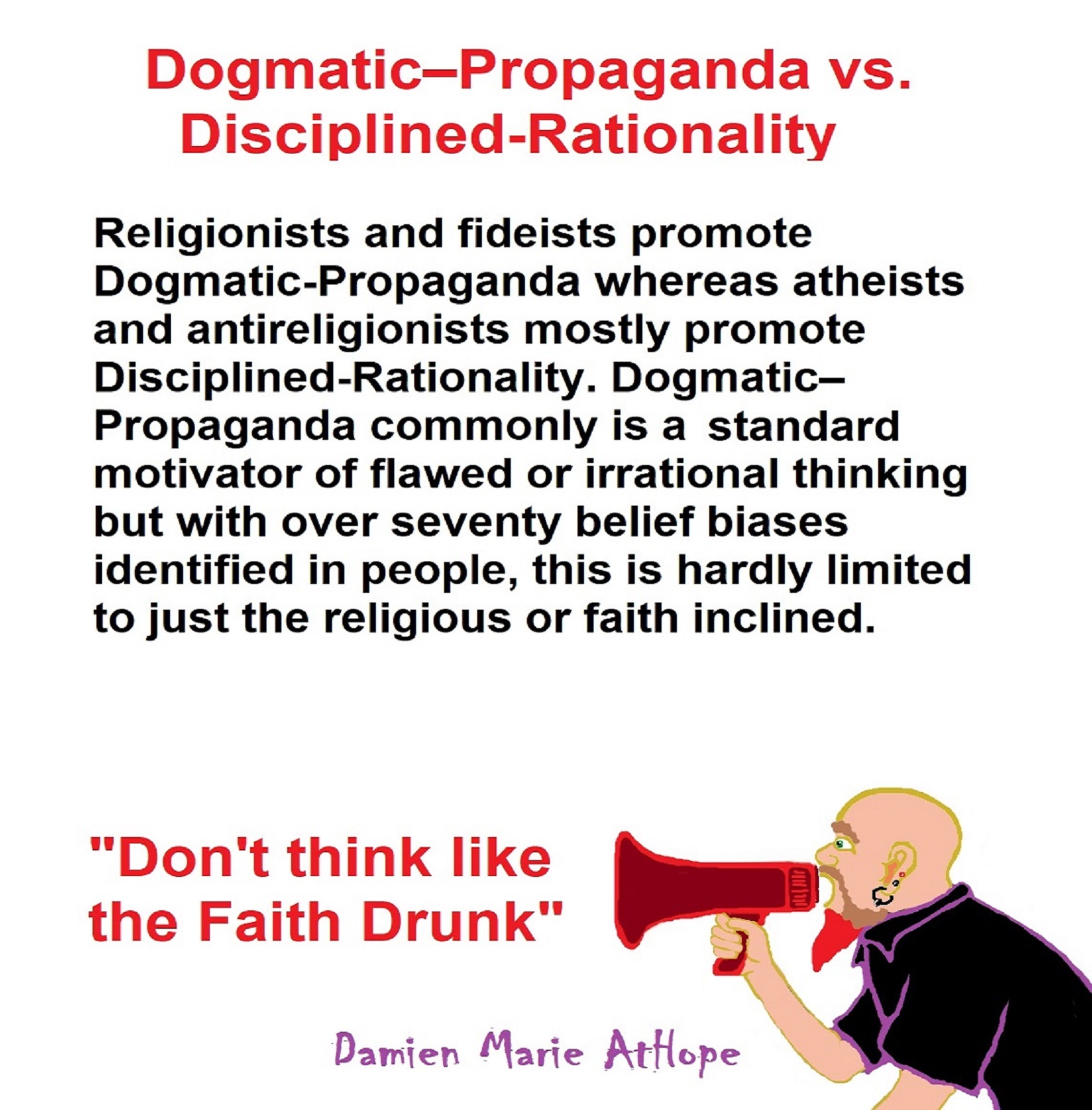
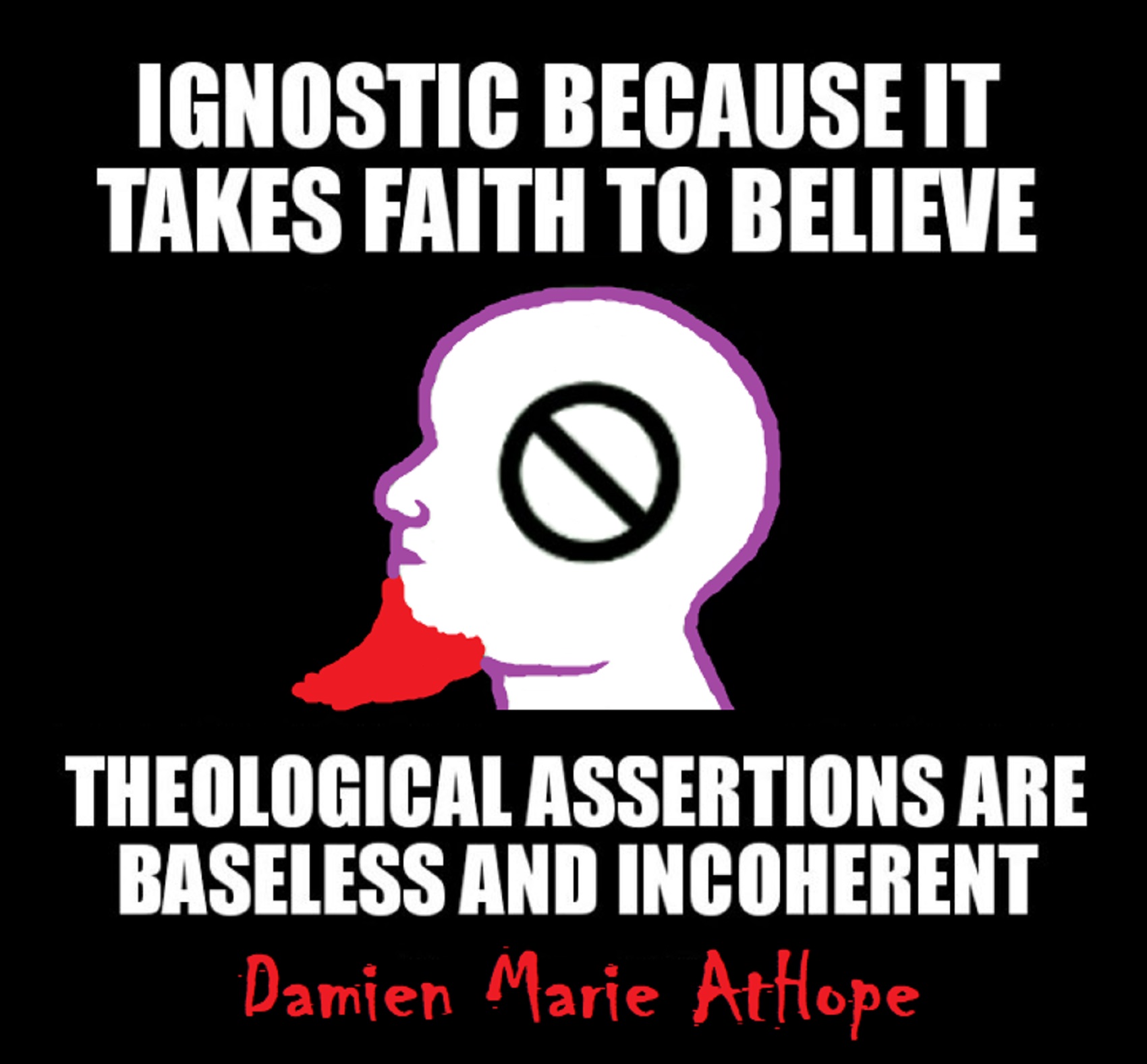
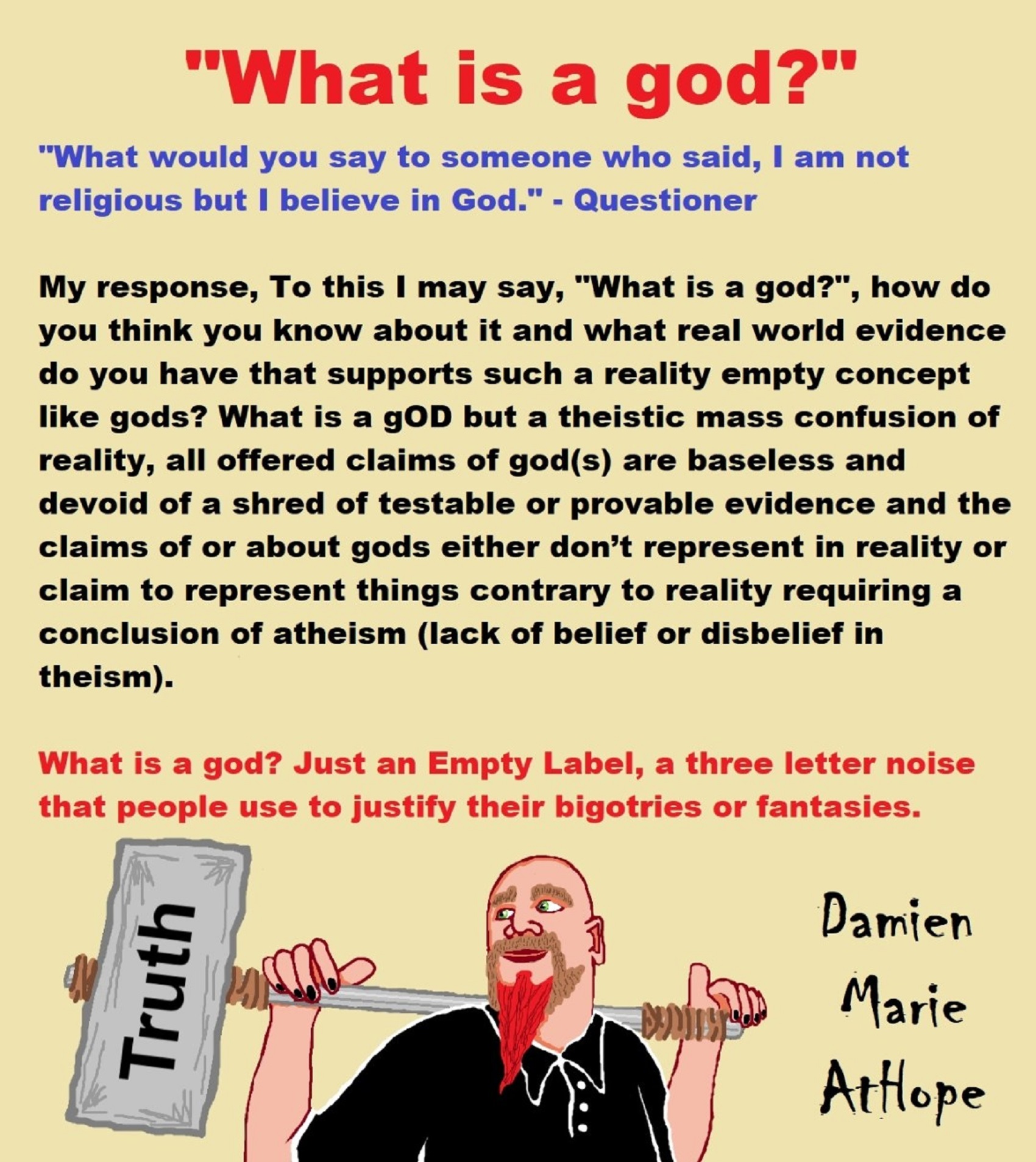
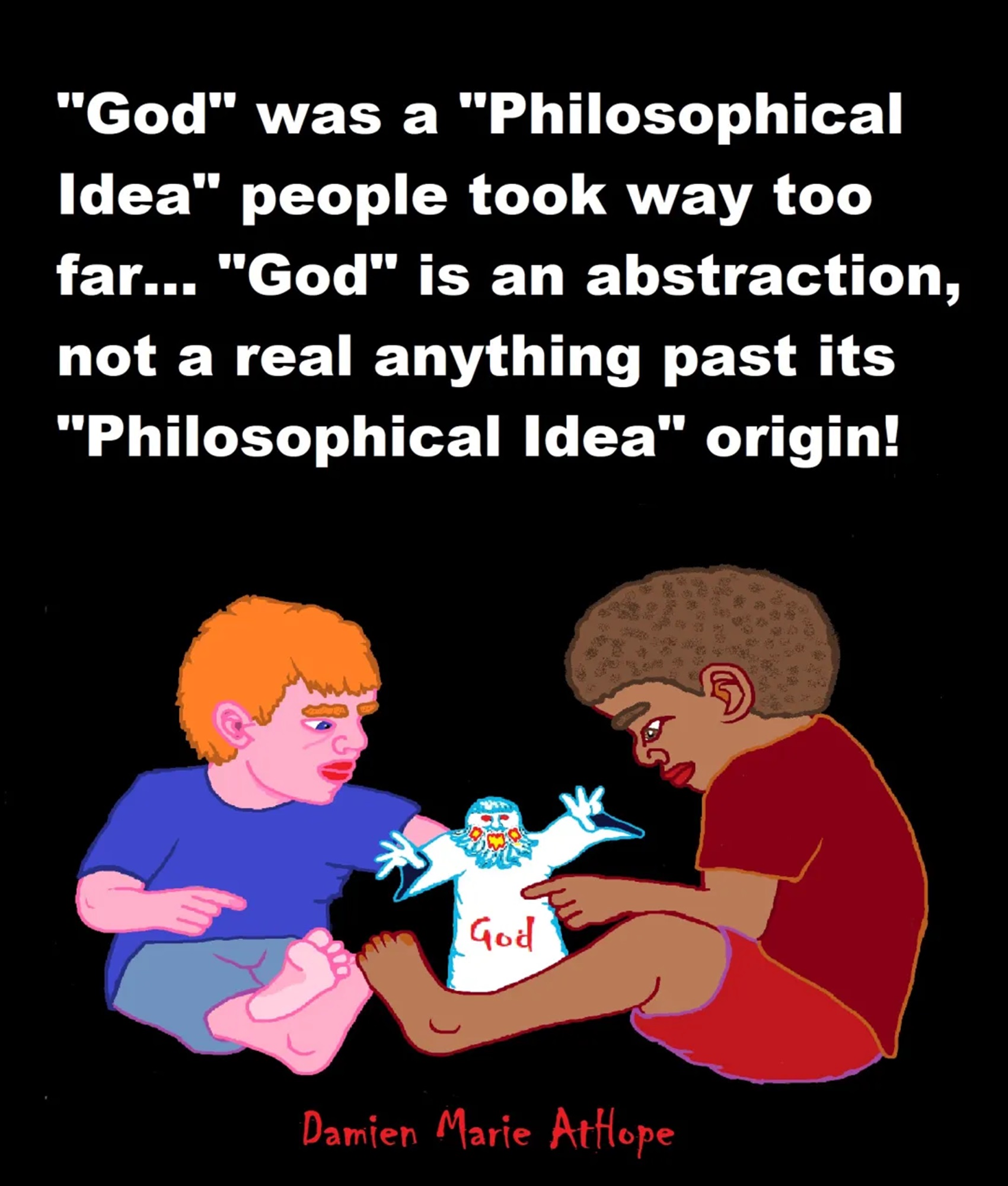
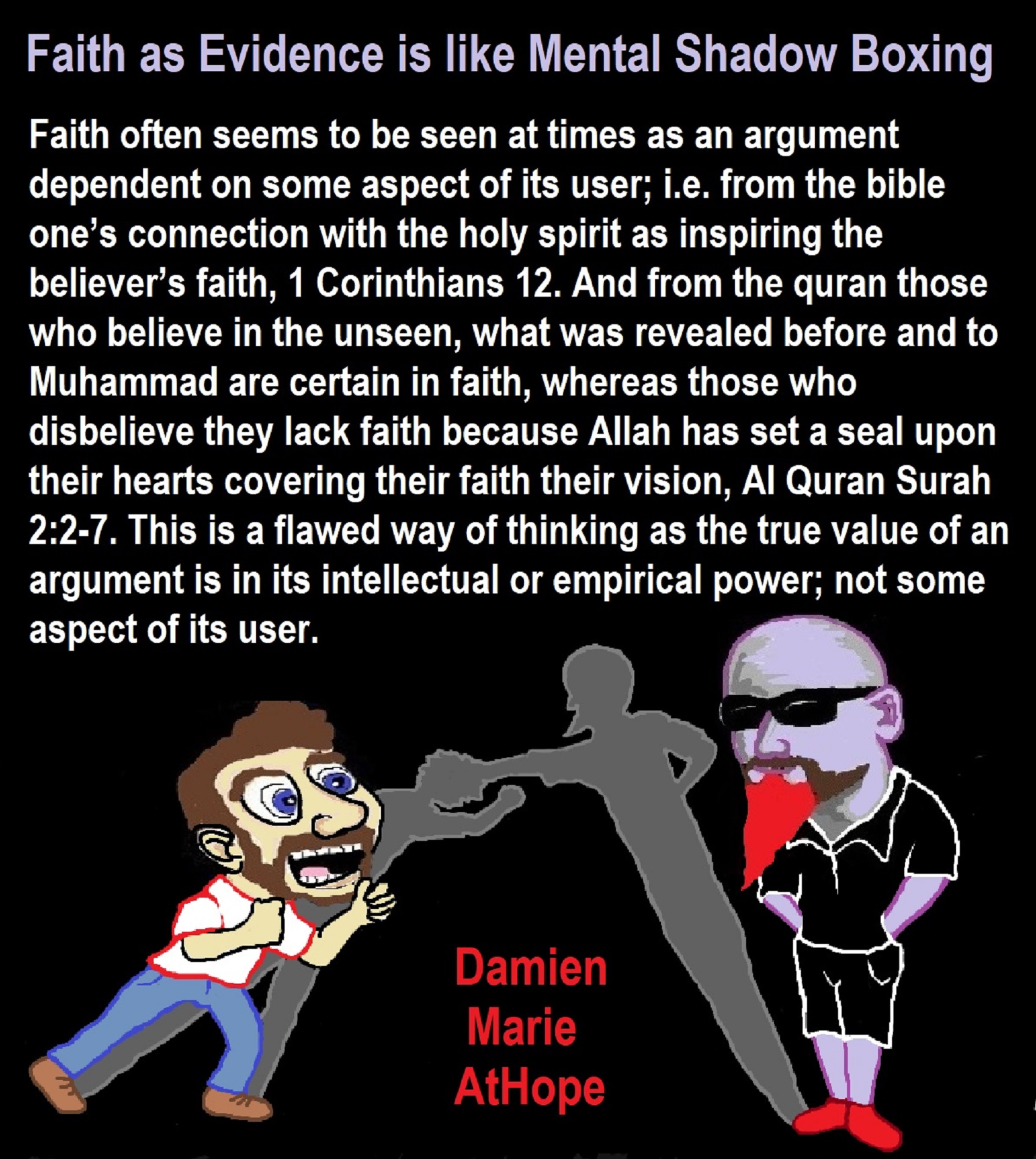
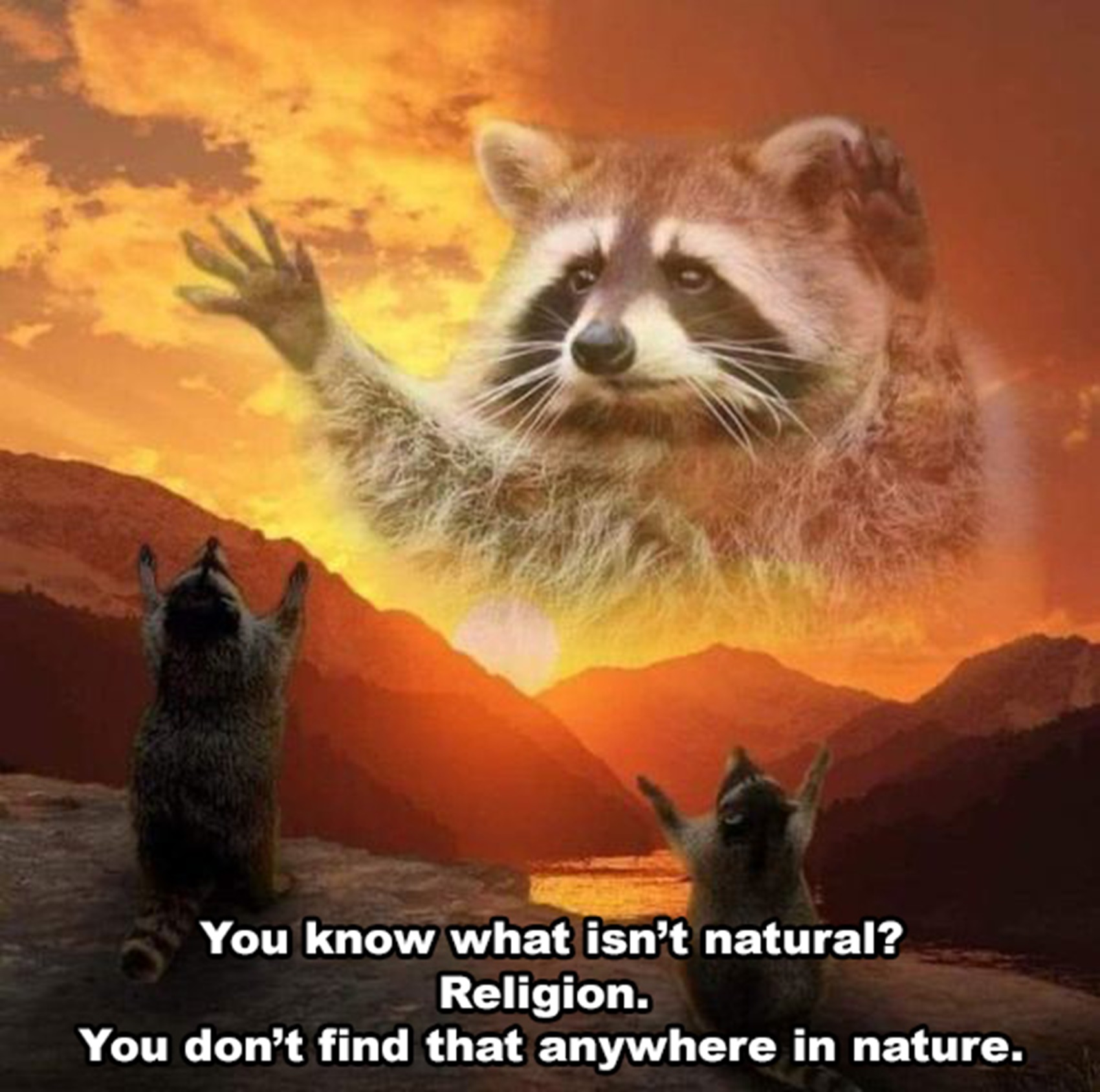
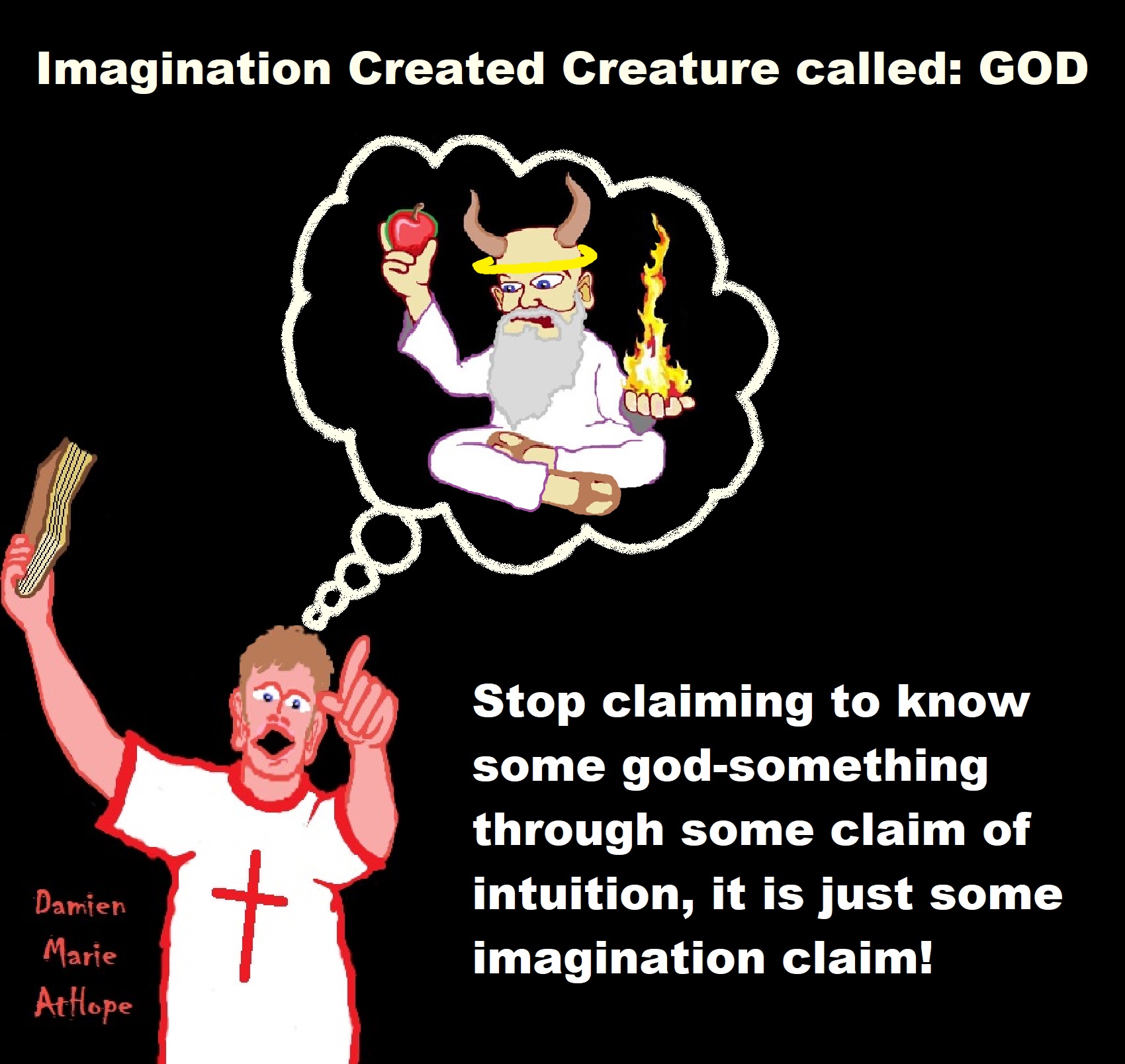
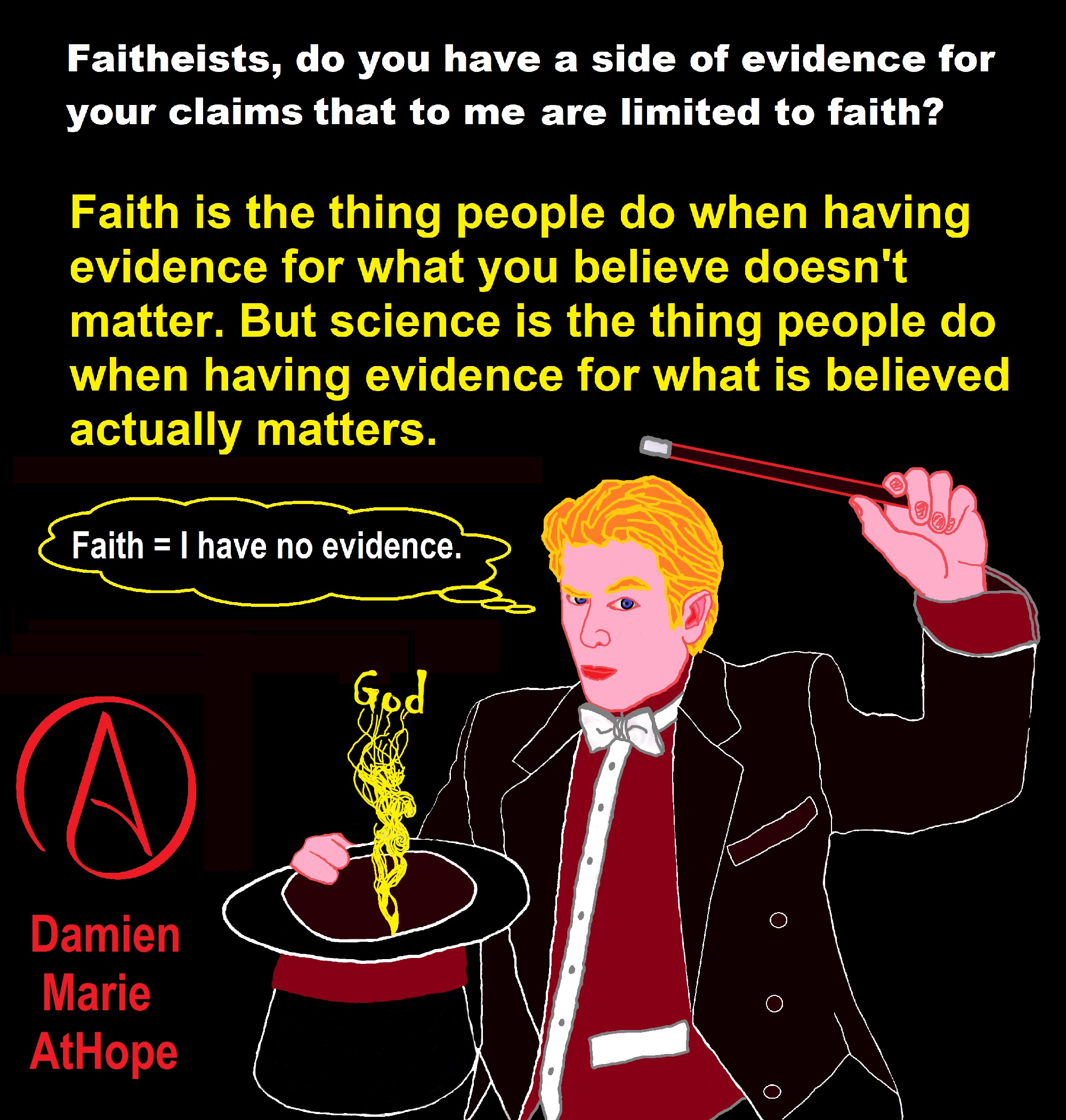
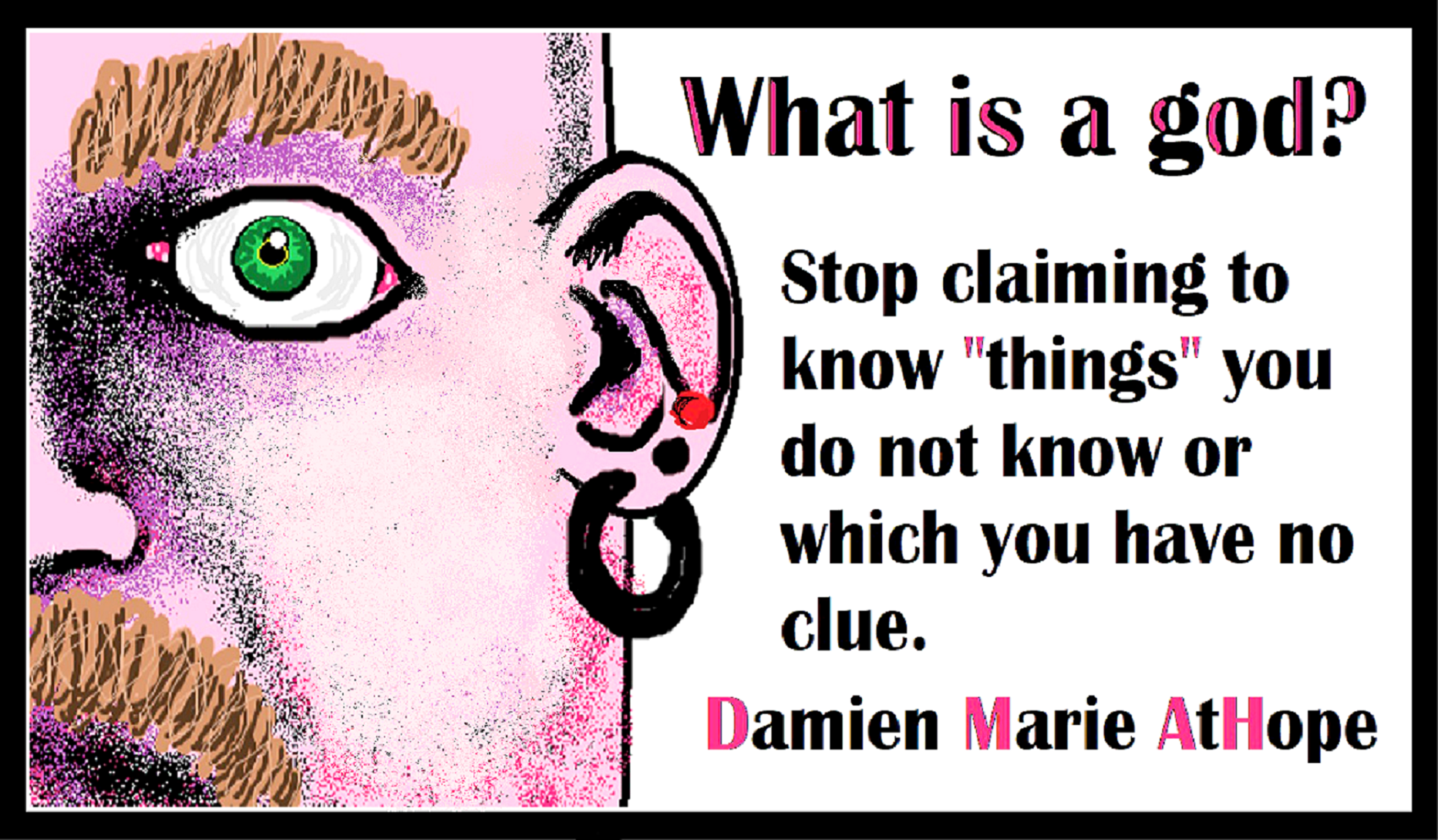
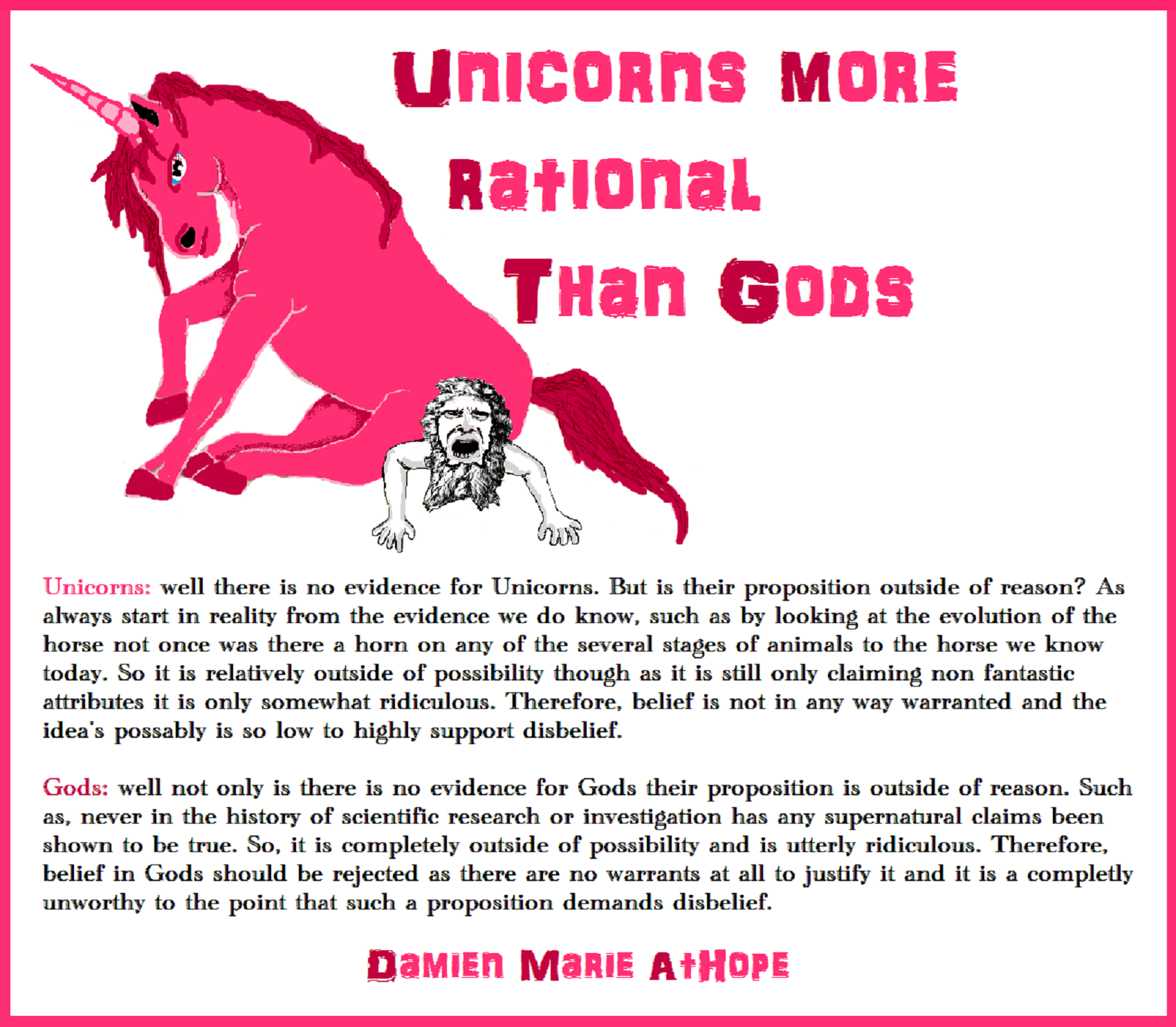
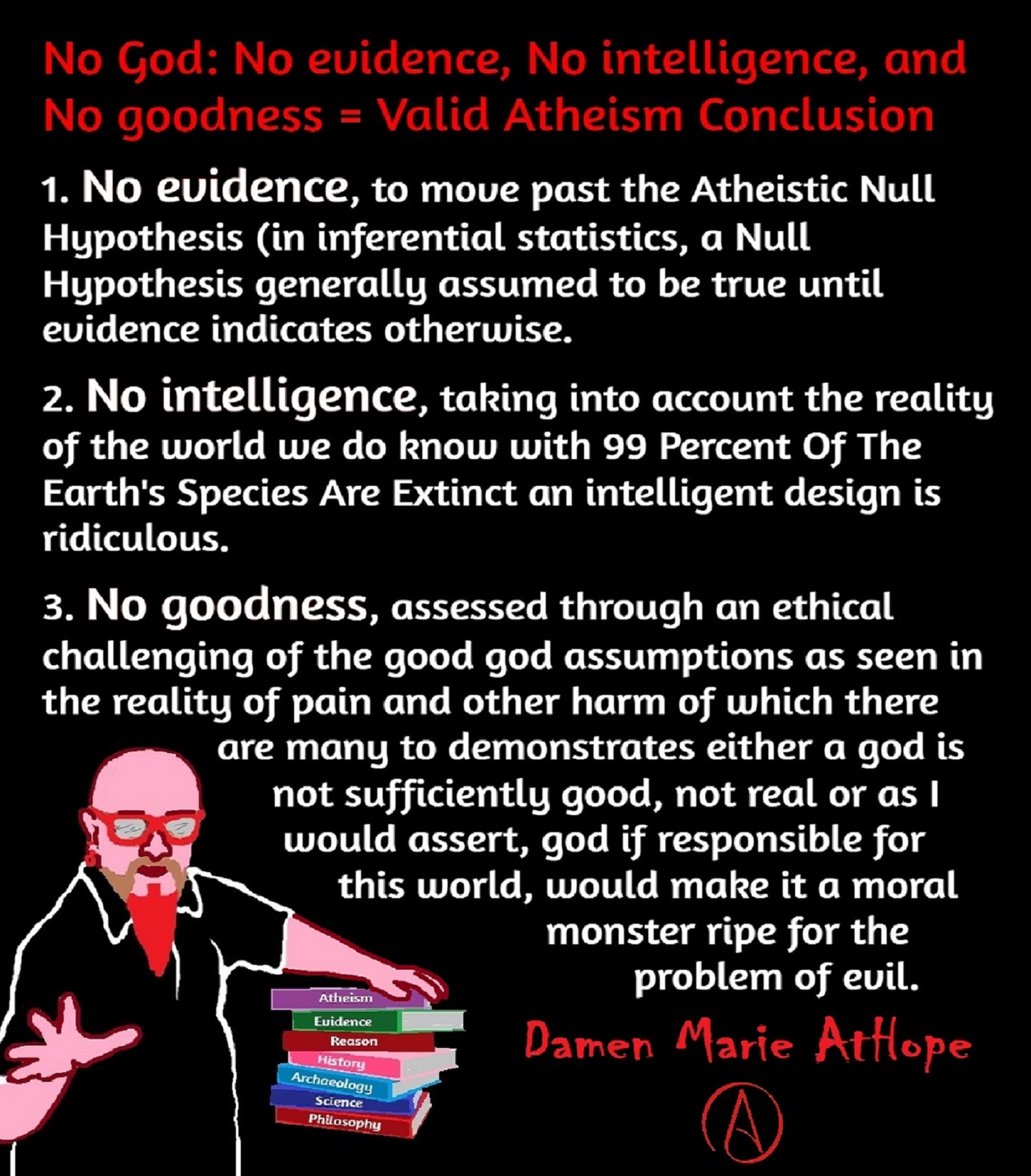
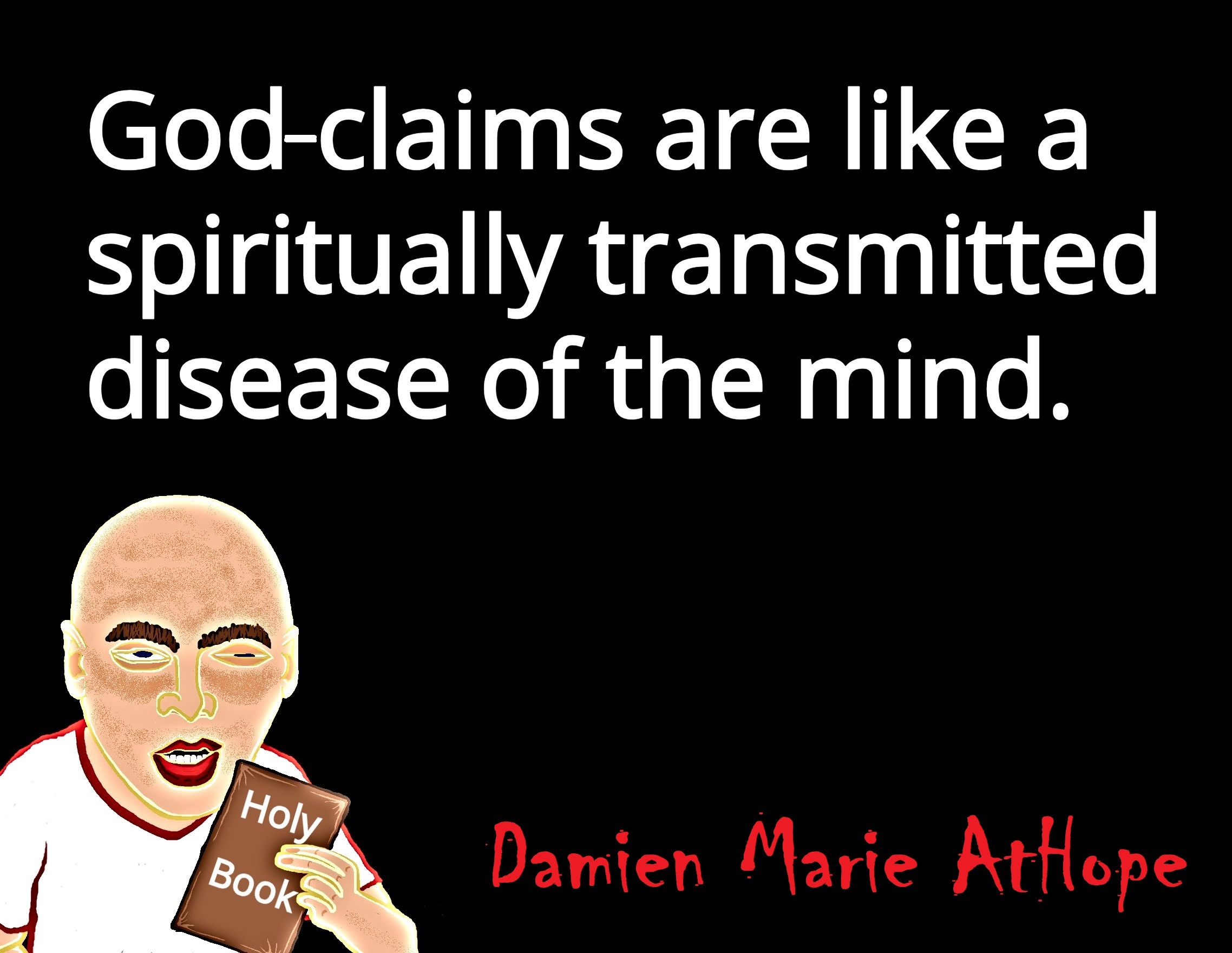
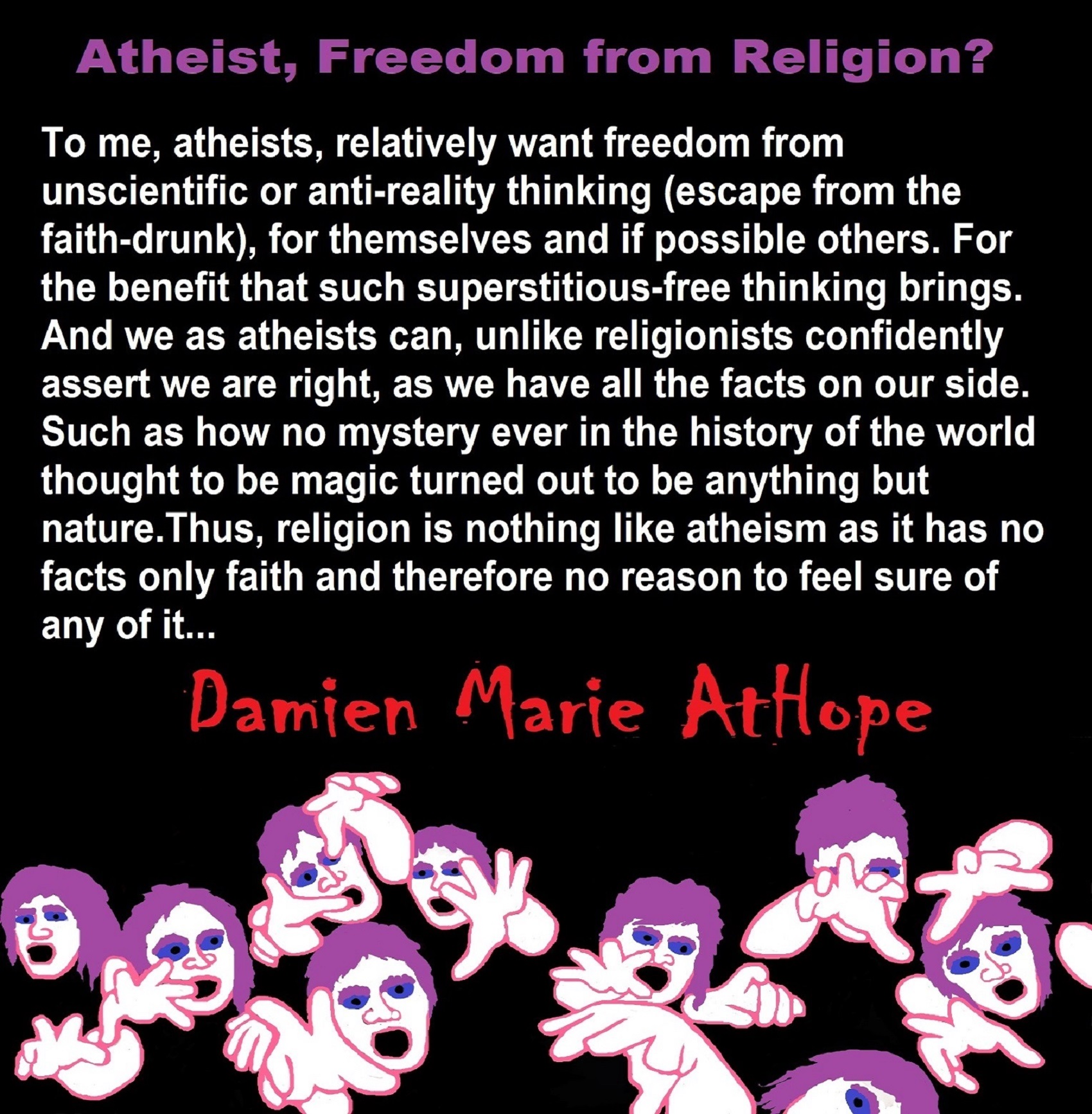
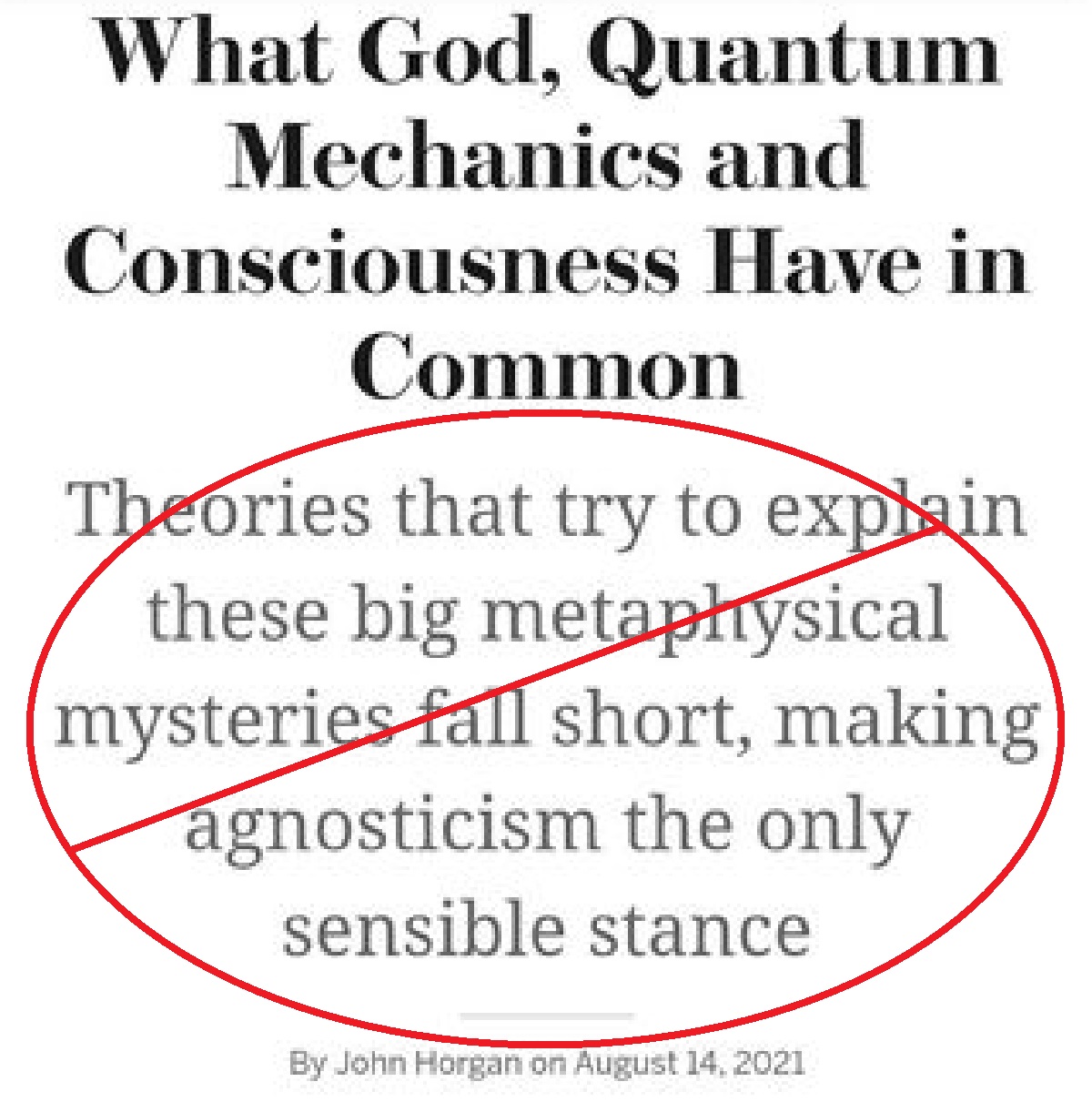
“What God, Quantum Mechanics, and Consciousness Have in Common. Theories that try to explain these big metaphysical mysteries fall short, making agnosticism the only sensible stance.” By John Horgan on
Agnosticism is a belief about knowledge built on folk logic and nonstandard philosophy.
I am Anti-Agnostic but also Pro-Ignostic in my Atheism Thinking.
The Disproof Atheism Society: EMPIRICAL, CONCEPTUAL, and DISPROOFS of gOD
I have heard it said, you can’t disprove all possible gods, thus, gods are a real possibility! Well, I see your thinking errors. First, no god theory nor god hypnosis ever has been proved at all, not even in some limited way, Let me say it again so you don’t miss this crucial point; all proposed god myths, are easily dismissed as baseless. Second, in stating a possible, one needs a reality and evidence starting point with which to even employ what a possibility could entail; and no wishful thinking and wild unfounded claims are not proof of anything then self-delusion or misinformation. Supernatural beliefs and thus religion to me has always been and are still in so many ways aspects of psychological thinking that connects back to fear and misunderstanding as well as just made up lies.
Absolute Knowledge? “No one has absolute knowledge; therefore the Christian God (God of the gaps) must exist.” or “No one has absolute knowledge; therefore atheists do not exist.” We could attack all kinds of things in this but we need only expose the error in thinking supported by faulty word use. What I am talking about is the biggest error which is the word “absolute”, because absolute is a religious philosophy concept no more valid as a thing then the term soul. Knowledge is a epistemic property of beliefs in epistemology, absolute as I am guessing a projection of certainty. but as certainty relates to epistemology it is also a epistemic property of beliefs. Thus it cannot be said to really be absolute anything universally, at best it can only be absolute in a particularly relevant way to a fixed thing, which is not really the nature of a commodity like knowledge. Knowledge is a set of confirmed and justified true beliefs which is constantly cumulative and growing. There are a few valid forms of certainty in epistemology not one is said to be absolute.
To me, the entire premise of “absolute” is a fallacy that does not really need refuting or should we need refuting even though now you need to, as they are trying to use it as if it’s real. it is as real as any lie. The exact point at which one ceases to be certain is the degree of certainty as opposed to the degree of belief measured as a probability function. Probability is quantified as a number between 0 and 1 (where 0 indicates impossibility and 1 indicates certainty). The higher the probability of an event, the more certain we are that the event will occur. The words “certainty” and “probability” do not apply to propositions that are either true or false. These propositions entertained by us with suspended judgment should never be qualified as either certain or probable. In American common law there are degrees of certainty and doubt. Certainty attaches to judgments beyond the shadow of doubt; not certain are judgments made with a reasonable doubt; and less certain still are judgments made by a preponderance of the evidence. The last two are judgments to which some degree of probability must be attached, the former more probable, the latter less probable. The propositions in each of these two cases, when entertained with suspended judgment, are either true or false. Certainty and probability qualify our judgments about the matters under consideration on the propositions entertained with suspended judgment. This statement brings us to consider what happens by chance and what is causally determined. Here we must distinguish between the mathematical theory of probability and the philosophical theory of what happens by chance.
In the mathematical theory of probability, which begins with an essay by Blaise Pascal, one can calculate the chances of anything happening by the number of possibilities present; for example, in the toss of a coin, the chance of its being heads or tails on any toss is fifty-fifty, because in the long run, with many tosses, that is how one should wager on the next toss, if we know that the coin being tossed is not affected by an extraneous factors. In the philosophical theory of probability, what happens by chance is what happens without a cause. Consider the coincidence of two individuals who happen to meet on a particular street at a particular time. Why do we call this a coincidental meeting, and regard it as an uncaused event? The answer is that each of the two individuals is caused to be at the spot where the chance meeting occurs by all the causal factors operating in his own past, but nothing in their separate pasts causes them to meet each other there. The coincidence is, therefore, an uncaused or a chance event. Probability can be used to measure degree of belief in two ways: objectively and subjectively. The objective measure is a measure of the rational degree of belief in a proposition given a set of evidential propositions. The subjective measure is the measure of a particular subject’s dispositions to decide between options. In both measures, certainty is a degree of belief, however, there can be cases where one belief is stronger than another yet both beliefs are plausibly measurable as objectively and subjectively certain. In ordinary language, we can say that while both beliefs are certain, one belief is more certain than the other.
Uncertainty is all around us; we can’t expect certainty. But uncertainty can often be “quantified” — that is, we can talk about degrees of certainty or uncertainty. This is the idea of probability: a higher probability expresses a higher degree of certainty that something will happen. Contemporary statistician reiterates and expands on this idea, using the words “randomness” and “variation” instead of uncertainty: Statistics, in a nutshell, is a discipline that studies the best ways of dealing with randomness, or more precisely and broadly, variation. As human beings, we tend to love information, but we hate uncertainty — especially when we need to make decisions. Information and uncertainty, however, are actually two sides of the same coin. Statistical techniques can’t eliminate uncertainty, but can help us gain some knowledge despite it. They can help us see patterns through it, and help us quantify the certainty/uncertainty that the patterns are real and not just chance artifacts of our data or of our perception . The following quote from mathematics educator Alan Schoenfeld nicely expresses reasonable expectations in fields where statistics is likely to be applied: Consider the theory of evolution, for example. Biologists are in general agreement with regard to its essential correctness, but the evidence marshalled in favor of evolution is quite unlike the kind of evidence used in mathematics or physics.
There is no way to prove that evolution is correct in a mathematical sense; the arguments that support it consist of “patterns of plausible reasoning”, along with the careful consideration of alternative hypotheses. In effect, biologists have said the following: “We have mountains of evidence that are consistent with the theory, broadly construed; there is no clear evidence that falsifies the proposed theory, and no rival hypotheses meet the same criteria.” In other words, in many areas, we can’t expect certainty, or even anything approaching it, from a single study. But an accumulated body of evidence based on high quality research can give us a high degree of certainty. Working well in a field with high degrees of uncertainty requires patience and often humility while the mountains of evidence accumulate — and might not turn out to support our pet theories. Like knowledge, certainty is an epistemic property of beliefs. (In a derivative way, certainty is also an epistemic property of subjects: S is certain that p just in case S‘s belief that p is certain.) Although some philosophers have thought that there is no difference between knowledge and certainty, it has become increasingly common to distinguish them. On this conception, then, certainty is either the highest form of knowledge or is the only epistemic property superior to knowledge. One of the primary motivations for allowing kinds of knowledge less than certainty is the widespread sense that skeptical arguments are successful in showing that we rarely or never have beliefs that are certain but do not succeed in showing that our beliefs are altogether without epistemic worth. As with knowledge, it is difficult to provide an uncontentious analysis of certainty.
There are several reasons for this. One is that there are different kinds of certainty, which are easy to conflate. Another is that the full value of certainty is surprisingly hard to capture. A third reason is that there are two dimensions to certainty: a belief can be certain at a moment or over some greater length of time. There are various kinds of certainty. A belief is psychologically certain when the subject who has it is supremely convinced of its truth. Certainty in this sense is similar to incorrigibility, which is the property a belief has of being such that the subject is incapable of giving it up. Nevertheless, psychological certainty is not the same thing as incorrigibility. A belief can be certain in this sense without being incorrigible; this may happen, for example, when the subject receives a very compelling bit of counterevidence to the (previously) certain belief and gives it up for that reason. Moreover, a belief can be incorrigible without being psychologically certain. For example, a mother may be incapable of giving up the belief that her son did not commit a gruesome murder, and yet, compatible with that inextinguishable belief, she may be tortured by doubt. A second kind of certainty is epistemic. Roughly characterized, a belief is certain in this sense when it has the highest possible epistemic status. Epistemic certainty is often accompanied by psychological certainty, but it need not be. It is possible that a subject may have a belief that enjoys the highest possible epistemic status and yet be unaware that it does. In such a case, the subject may feel less than the full confidence that her epistemic position warrants. I will say more below about the analysis of epistemic certainty and its relation to psychological certainty.
Agnosticism is a belief about knowledge built on folk logic and nonstandard philosophy it is not a true branch of the philosophy of knowledge at all, infact it is more connected to philosophical skepticism which is against asserting any firm knowledge claim. I hear people time and again asserting the 100% knowledge or truth claim that because they believe there is no such thing as asserting the 100% knowledge or truth claim that by default Every atheist is agnostic. Do you see the self contradictory claim which would or I guess if one holds such a belief in the limits of knowledge, should refrain from making global affirming truth claims that one cannot make global affirming truth claims. Some likely have such thinking because of they are using agnosticism’s folk philosophy ideology you like it are asserting something about the nature of knowledge and belief which is not how philosophy works. Here is what standard philosophy uses it is called epistemology and it never uses anything called agnosticism. Epistemology is the study of knowledge and justified belief. As the study of knowledge, epistemology is concerned with the following questions: What are the necessary and sufficient conditions of knowledge? What are its sources? What is its structure, and what are its limits? As the study of justified belief, epistemology aims to answer questions such as: How we are to understand the concept of justification? What makes justified beliefs justified?
Is justification internal or external to one’s own mind? Understood more broadly, epistemology is about issues having to do with the creation and dissemination of knowledge in particular areas of inquiry. A common concept in epistemology is “Knowledge is Justified True Belief.” There are various kinds of knowledge: knowing how to do something (for example, how to ride a bicycle), knowing someone in person, and knowing a place or a city. Although such knowledge is of epistemological interest as well, we shall focus on knowledge of propositions and refer to such knowledge using the schema ‘S knows that p’, where ‘S’ stands for the subject who has knowledge and ‘p’ for the proposition that is known. Our question will be: What are the necessary and sufficient conditions for S to know that p? We may distinguish, broadly, between a traditional and a non-traditional approach to answering this question. We shall refer to them as ‘TK’ and ‘NTK’. According to TK, knowledge that p is, at least approximately, justified true belief (JTB). False propositions cannot be known. Therefore, knowledge requires truth. A proposition S doesn’t even believe can’t be a proposition that S knows. Therefore, knowledge requires belief. Finally, S’s being correct in believing that p might merely be a matter of luck.
Therefore, knowledge requires a third element, traditionally identified as justification. Thus we arrive at a tripartite analysis of knowledge as JTB: S knows that p if and only if p is true and S is justified in believing that p. According to this analysis, the three conditions — truth, belief, and justification — are individually necessary and jointly sufficient for knowledge. Initially, we may say that the role of justification is to ensure that S’s belief is not true merely because of luck. On that, TK and NTK are in agreement. They diverge, however, as soon as we proceed to be more specific about exactly how justification is to fulfill this role. According to TK, S’s belief that p is true not merely because of luck when it is reasonable or rational, from S’s own point of view, to take p to be true. According to evidentialism, what makes a belief justified in this sense is the possession of evidence. The basic idea is that a belief is justified to the degree it fits S’s evidence. NTK, on the other hand, conceives of the role of justification differently. Its job is to ensure that S’s belief has a high objective probability of truth and therefore, if true, is not true merely because of luck. One prominent idea is that this is accomplished if, and only if, a belief originates in reliable cognitive processes or faculties. This view is known as reliabilism.
Some thinkers and philosophers deny the validity of agnosticism assertions in general, seeing it as a limitation of man’s capacity to know the reality, affirming that “not being able to see or hold some specific thing does not necessarily negate its existence,” using gravity, entropy, reason and thought as examples.
Agnosticism is the position of believing that knowledge of the existence or non-existence of god is impossible.
Finally, there is an argument, popular among some who fancy themselves intellectuals, that agnosticism is the only intellectually honest position to take with regard to gods. According to this viewpoint, theism and atheism are arrogant affirmations of being certain about something that is intrinsically unknowable. It is, of course, true that it is possible there is some unknowable being or entity who creates universes, has unimaginable powers, and is like nothing we have any experience of. No atheist that I know of has ever denied such a possibility, nor have we denied the possibility of an unknowable Easter Bunny who lays eggs on Saturn or any other imaginable epistemic improbability. So what? Atheists and theists do not concern themselves with epistemic improbabilities, but with gods about whom stories have been told for millennia. The more we learn about the universe, the less reason there is for believing that any of these gods were not created by human imagination. Agnosticism regarding Zeus or Abraham’s god is not an intellectually honest position, as it can be maintained only by a fatuous and dishonest treatment of the available evidence. That evidence shows beyond a reasonable doubt that all gods fashioned thus far in the minds of men are highly improbable. Agnosticism regarding unimaginable, unknowable beings is redundant. Ref
We can sert 100% psychological certainty we do it all the time. What most agnostics likely mean is they don’t want to claim epistemic certainty thinking it like knowledge is disconnected from belief. However, like knowledge, certainty is an epistemic property of beliefs. Ref
Sometimes a person who is really an atheist may describe herself, even passionately, as an agnostic because of unreasonable generalised philosophical scepticism which would preclude us from saying that we know anything whatever except perhaps the truths of mathematics and formal logic.
Knowledge and belief?
Knowledge is a intellectual commodity which is true and believed and justified. There are two slightly different meanings of belief that must be distinguished. In the first sense, John might “believe in” his cousin Joe. This may mean that he is willing to lend Joe money, trusting in his paying it back. In this sense, John might say, “I know it is safer to fly than drive, yet I don’t believe it,” in which case John doesn’t trust in the safety of aircraft, even though as a cognitive matter he may understand the pertinent statistics. In the second sense of belief, to believe something just means to think that it is true. That is, to believe P is to do no more than to think, for whatever reason, that P is the case. It isthis sort of belief that philosophers most often mean when they are discussing knowledge. The reason is that, in the view of most philosophers, in order to know something, one must think that it is true—one must believe (in the second sense) it to be the case. Consider someone saying, “I know that P, but I don’t think P is true.” The person making this utterance seems to have contradicted himself. If one knows that P, then, amongst other things, one thinks that P is indeed true. If one thinks that P is true, then one believes P. Knowledge is usually held to be distinct from belief and opinion. If someone claims to believe something, they are claiming that they think that it is the truth. But of course, it might turn out that they were mistaken, and that what they thought was true was actually false. This is not the case with knowledge. For example, suppose that Jeff thinks that a particular bridge is safe, and attempts to cross it; unfortunately the bridge collapses under his weight. One might say that Jeff believed that the bridge was safe, but that his belief was mistaken. One would not say that he knew that the bridge was safe, because plainly it was not. For something to count as knowledge, it must be true—at least as knowledge is usually understood anyway. Similarly, two people can believe things that are mutually contradictory, but they cannot know (unequivocal) things that are mutually contradictory. For example, Jeff can believe the bridge is safe, while Jenny believes it unsafe. But Jeff cannot know the bridge is safe and Jenny know that the bridge is unsafe. Two people cannot know contradictory things. Ref
Rationality?
If one does not reject rationality, but still wishes to maintain that knowledge claims cannot be or are not justified, one might be termed a non-justificationist. Here philosophers are on firmer philosophical ground; since non-justificationists accept the validity of reason, they can present logical arguments for their case.For instance, the regress argument has it that one can ask for the justification for any statement of knowledge. If that justification takes the form of another statement, one can again reasonably ask for that statement also to be justified, and so forth. This appears to lead to an infinite regress, with every statement justified by some other statement. It would be impossible to check that each justification is satisfactory, and so relying on such a series quickly leads to skepticism. Alternately, one might claim that some knowledge statements do not require justification. Much of the history of epistemology is the story of conflicting philosophical doctrines claiming that this or that type of knowledge statement has special status. This view is known as Foundationalism.One can also avoid the regress if one supposes that the assumption that a knowledge statement can only be supported by another knowledge statement is simply misguided. Coherentism holds that a knowledge statement is not justified by some small subset of other knowledge statements, but by the entire set. That is, a statement is justified if it coheres with all other knowledge claims in the system. This has the advantage of avoiding the infinite regress without claiming special status for some particular sorts of statements. But since a system might still be consistent and yet simply wrong, it raises the difficulty of ensuring that the whole system corresponds in some way with the truth. Ref
My anti-agnostic thinking is a challenge to the agnostic thinking not an attack on the people who hold the agnostic thinking. My anti-agnostic thinking is not me trying to tell others they are not atheist enough or not real atheists nor is it trying to say you have no right to believe you are an agnostic.
For me my anti-agnostic and pro-ignostic thinking is about “The Ethics of Belief” as I see it. Ref “The Ethics of Belief”
Thesis: It is immoral to either form a new belief without sufficient evidence, or to sustain an existing belief by deliberately ignoring doubts and avoiding honest investigation.
I don’t claim to know what agnostics know or don’t, think or don’t other than to say I disagree with the “I don’t know”, “I am not sure” or “I can’t be certain” about the god concept question.
I am not against people calling themselves agnostic if they wish I am against the thinking that one would once informed still see value in agnostic thinking.
I see agnostic thinking often even by deep thinkers choosing to hold some foundations built on folk logic as STEVEN D. HALES calls it.
Steven D. Hales is the professor department of philosophy Bloomsburg University, here is an article on that: You Can Prove a Negative.
A PRINCIPLE OF FOLK LOGIC is that you can’t prove a negative.
Skeptics and scientists routinely concede the point in debates about the possible existence of everything from Big Foot and Loch Ness to aliens and even God. In a recent television interview on Comedy Central’s The Colbert Report, for example, Skeptic publisher Michael Shermer admitted as much when Stephen Colbert pressed him on the point when discussing Weapons of Mass Destruction, the comedian adding that once it is admitted that scientists cannot prove the nonexistence of a thing, then belief in anything is possible. Even Richard Dawkins writes in The God Delusion that “you cannot prove God’s non-existence is accepted and trivial, if only in the sense that we can never absolutely prove the non-existence of anything.”
There is one big problem with this. Among professional logicians, guess how many think that you can’t prove a negative? That’s right, zero. Ref
I see agnostic as a belief about the ability to have knowledge, it is in that way not following epistemology which is the philosophy of knowledge. Agnostic thinking is stating its own theological seminary of what it sees as abilities to grasp god knowledge. I address agnostic not because I think people cannot choose to believe in this way if they choose. The reason I so often address agnosticism is that I hear so many say it like they have no choice which is simply not true. Most of the beloved statements offered as reasoning to why there is no other choice but a agnostic conclusion hinge on folk logic and folk concepts of knowledge or misunderstood application of philosophy of science. This is true even of scientists who have disbelief as most of them disregard philosophy as well which is a large contributing factor for the confusion. The scientific method which all science largely uses requires an amount of pre belief (a priori) in the not complete knowledge concept of realism philosophy or naturalism philosophy both of which are connected. My point is people don’t go around saying they are science agnostic.
Both scientific realism and naturalism reject all supernatural claims and thus would not be agnostic about the possibility of a supernatural being called god. I hold agnostic thinking also as not an professional epistemology thus it is not usable to delineate a professional philosophical knowledge stance it is a personal belief forming a theory of knowledge. knowledge is larly a justified true belief in philosophy. epistemology is the study of knowledge and justified belief. As the study of knowledge, epistemology is concerned with the following questions: What are the necessary and sufficient conditions of knowledge? What are its sources? What is its structure, and what are its limits? As the study of justified belief, epistemology aims to answer questions such as: How we are to understand the concept of justification? What makes justified beliefs justified? Is justification internal or external to one’s own mind? Understood more broadly, epistemology is about issues having to do with the creation and dissemination of knowledge in particular areas of inquiry. Ref
Philosophical vs. Pragmatic Reasons for Preferring the Term ‘Agnostic’A person may call herself an agnostic, as Huxley did, because of questionable philosophical motives. Huxley thought that propositions about the transcendent, though possibly meaningful, were empirically untestable. We have seen that it is unclear that the conclusion of the fine tuning argument is untestable. One can at least compare it with other and non-theistic hypotheses. Thus there are conjectures that there are many universes, so many of them that is not surprising that there should be some among them in which the constants of physics allow for the possibility of life, and if so our universe must be one of them. Some cosmologists give independent grounds for thinking that new universes are spawned out of the back of black holes. Others think that there are independent grounds for thinking of a single huge Universe that has crystallised out into various universe sized regions each with randomly different values for the fundamental constants. Some such speculations get some support (it has been suggested) from string theory. Though such speculations are at present untestable and should be taken with a grain of salt, one or another may well one day be absorbed into a testable theory. It must be left to cosmologists and mathematical physicists to go into the pros and cons here, but they are mentioned here to indicate a grey area between the testable and the untestable.
Some scientists when canvassing these issues of philosophical theology may prefer to call themselves ‘agnostics’ rather than ‘atheists’ because they have been over impressed by a generalised philosophical scepticism or by a too simple understanding of Popper’s dictum that we can never verify a theory but only refute it. Such a view would preclude us from saying quite reasonably that we know that the Sun consists largely of hydrogen and helium. When we say ‘I know’ we are saying something defeasible. If later we discover that though what we said was at the time justified, it nevertheless turned out to be false, we would say ‘I thought I knew but I now see that I didn’t know’. Never or hardly ever to say ‘I know’ would be to deprive these words of their usefulness, just as the fact that some promises have to be broken does not deprive the institution of promising of its legitimacy.
Another motive whereby an atheist might describe herself as an agnostic is purely pragmatic. In discussion with a committed theist this might occur out of mere politeness or in some circumstances from fear of giving even more offence. Samuel Butler, though a complete unbeliever in the doctrines of Christianity, in the preface to one of his books Erewhon Revisited (Butler 1932) described himself as the broadest of broad churchmen. That is, I take it that broad churchmen often were unbelievers, but treated the doctrine as mere myth suitable for literal consumption by the local yokels in the interests of social stability. It is unclear to me whether or not Butler was sympathetic to a very abstract sort of theism. Some may call themselves ‘agnostics’ rather than ‘atheists’ merely because they are equally repelled by the fanaticism associated with some forms of theism and by the boring obsessiveness of what Hilary Putnam has called ‘the village atheist’. (Contrast, however, Clifford’s view of the matter and also the example of the radical and intellectual tinker, Mr. Shaw, in Butler’s powerful novel The Way of All Flesh.) Still, these considerations are perhaps more a matter for sociologists than for philosophers. Ref
To read more why Agnosticism is a Belief about knowledge Built on Folk Logic: https://damienmarieathope.com/2016/01/12/agnosticism-is-a-belief-about-knowledge-built-on-folk-logic/
Allowing that magical thinking or the possibility of magical thinking being real is clearly not supported by any facts in reality. Thus, it is just more a social engineering “indoctrinated belief” connected to learned magical thinking supernaturalism and/or superstitionism. When asked whether they believe in the existence of one or more Gods and/or Goddesses, Theists will say yes; strong Atheists will say no. Agnostics will say I don’t know or often cannot give a straight “Yes” or “No” answer but are still either classified as either Weak Theism or Weak Atheism as it’s a belief question and no mater how one tries to add or subtract other things the main issue still is, “do you believe in theism” if the answer is anything but yes or some variant of maybe yes then it’s a no; thus one is an atheist as all it takes is a lack of believing theism but it can be disbelief even a beliefs there is no god.
- Feel you don’t know what god is or could be you might be an Ignostic but if so you don’t or can’t believe in theism. Ignosticism is the idea that the question of the existence of God is meaningless, because the term “god” has no unambiguous definition. Ignosticism requires a good, non-controversial definition of god before arguing on its existence. (So they don’t believe theism thus are atheists)
- Feel you don’t care what god is or could be you might be an Apatheist but if so you don’t believe in theism. An apatheist is someone who is not interested in accepting or denying any claims that gods exist or do not exist. An apatheist lives as if there are no gods and explains natural phenomena without reference to any deities. (So they don’t believe theism thus are atheists)
Some try and call Atheism a belief or a belief system. Ok, well I will humor you, as it is actually a disbelief system. If atheism is to be thought of as a belief system as religionists like to think, then it’s the certification, confirmation, or conclusion of two philosophies Rationalism (reason) and Empiricism (evidence) and in simple terms its the method of only accepting valid as well as reliable reason and evidence. Since god hypothesis claims fail to be substanceate with any “evidence” as well as are exposed to contain thinking errors, logical fallacies and internal contradictions it has no warrant nor justification to support “reason” believing it to be in anyway true. Thus, to your belief that Atheism is a belief but you have it backwards, we have credible belief systems that lead us to the conclusion of Atheism, which is stating I do not have a belief in gods, which because of the facts in evidence is the only rational choice. Alternatively, if I was forced to accept that Atheism was somehow actually a belief system, then for me it is a belief in science, archeology, and philosophy. Not to mention as an atheist I have a belief in supernatural devoid naturalism (as the world presents itself ) as well as a belief in my fellow humans and our ability to solve human problems by human means such as sound reason and proven evidence without resorting to the fallacy of faith or holy books ad their dogmatic propaganda and most importantly a belief in myself as atheism is a solitary mental realization where religion is the group thinking mental servitude.
Ignosticism, or igtheism position?
If followed to its logical end it concludes that the entire question about God’s existence is a non-question and that taking a yes, no or even ambivalent position is absurd. It is based on an expectation of strong critical rational analysis of any proposition including the existence of God.
As with any topic, and especially in the realm of the supernatural and woo, the subject of any debate should be coherently defined. If one offers a clear definition of an entity, then in order to take a position whether it exists or not the definition of the entity must be one in which its existence can be falsified (there is a rational and logical method by which we can test the existence of the subject as it has been defined). Few theists ever offer a clear definition of God. The few who do offer a definition almost never offer one in which the existence of that God could be tested. The rare falsifiable definition offered regarding God’s existence is easily falsified. And so as with any subject (such as the existence of almost all supernatural entities) debate about the existence of God is, for the far majority of such conversations, pointless.
Ignosticism goes further than agnosticism; while agnosticism states that “you can’t really know either way” regarding the existence or non-existence of gOD, ignosticism posits that “you haven’t even agreed on what you’re discussing, as its nothing”. Ref
I am Ignostic not agnostic and you should consider it too…
Matt Dillahunty addresses Atheist Debates – You’re not an atheist, you’re an agnostic
Weak Theism and Weak Atheism being called Agnostic?
Addressing “ATHEISM”, reasons for it and its possible types/styles
Explaining Axiological theism, Axiological agnosticism, and Axiological atheism
Agnosticism Beliefs Involve “FOLK LOGIC” Thinking?
Discussions on Agnosticism and Atheism
Agnosticism: Non-Standard Epistemology
Agnosticism No Thanks, I am Ignostic
I am a caring firebrand atheist, wishing to be hard on ideas but kind to people.
My life; the good, the bad, and the ugly on the road to the Mental Freedom of Atheism
I Believe Archaeology, not Myths & Why Not, as the Religious Myths Already Violate Reason!
Archaeological, Scientific, & Philosophic evidence shows the god myth is man-made nonsense.
I am not the thing abuse made, I am a shooting star blazing bright, shining far pass my past.
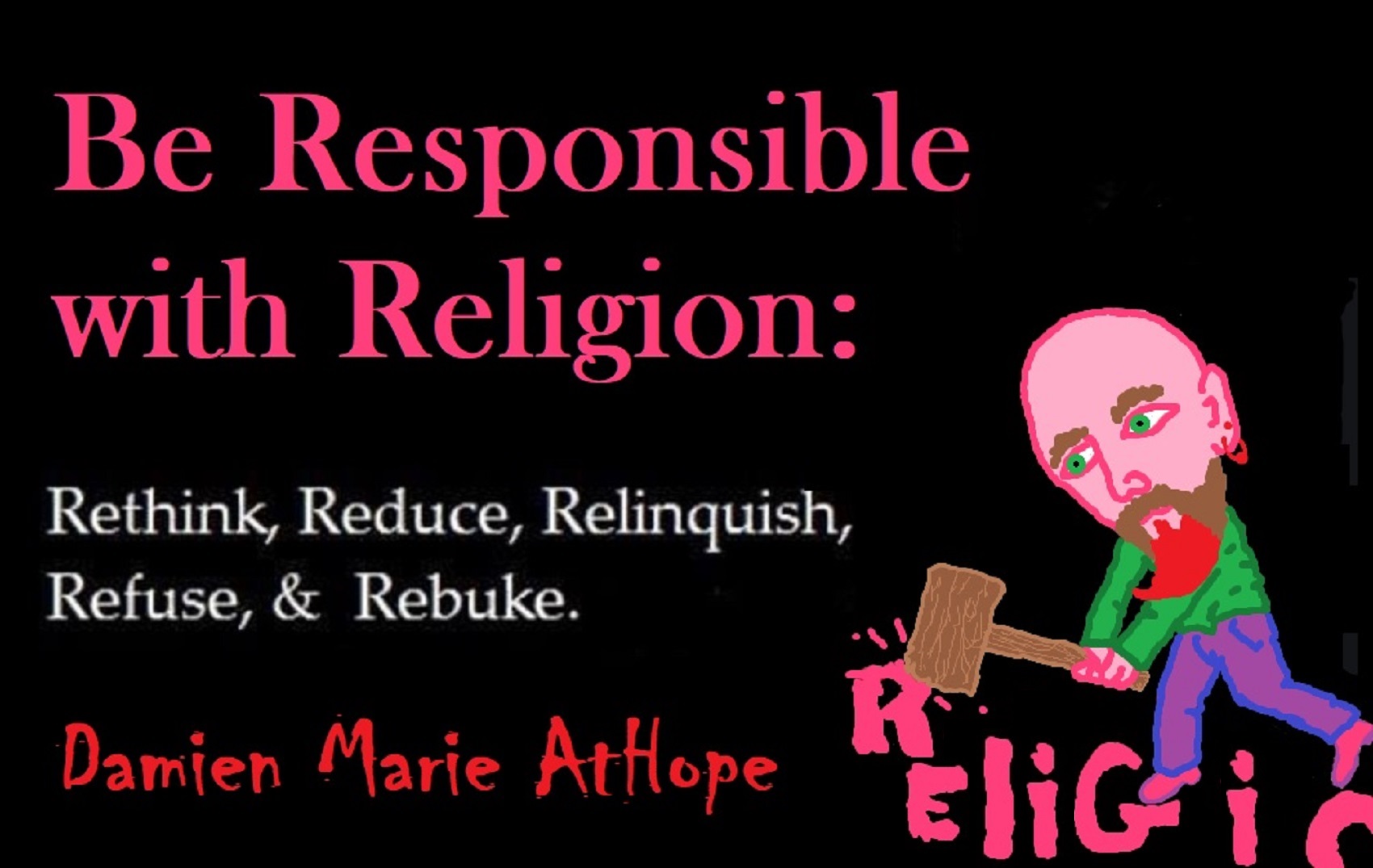
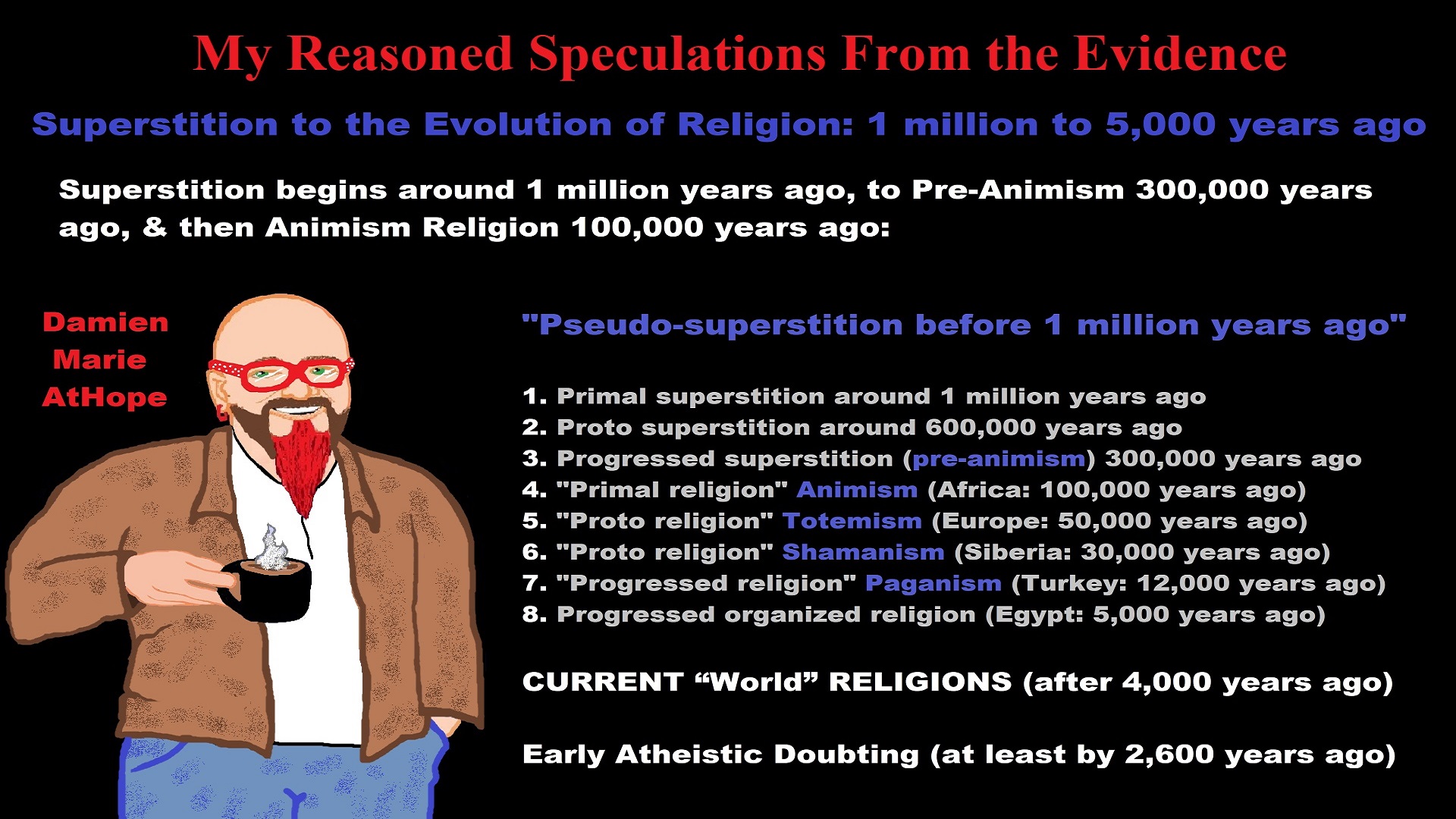
My thoughts on Religion Evolution with external links for more info:
- (Pre-Animism Africa mainly, but also Europe, and Asia at least 300,000 years ago), (Pre-Animism – Oxford Dictionaries)
- (Animism Africa around 100,000 years ago), (Animism – Britannica.com)
- (Totemism Europe around 50,000 years ago), (Totemism – Anthropology)
- (Shamanism Siberia around 30,000 years ago), (Shamanism – Britannica.com)
- (Paganism Turkey around 12,000 years ago), (Paganism – BBC Religion)
- (Progressed Organized Religion “Institutional Religion” Egypt around 5,000 years ago), (Ancient Egyptian Religion – Britannica.com)
- (CURRENT “World” RELIGIONS after 4,000 years ago) (Origin of Major Religions – Sacred Texts)
- (Early Atheistic Doubting at least by 2,600 years ago) (History of Atheism – Wikipedia)
“Religion is an Evolved Product” and Yes, Religion is Like Fear Given Wings…
Atheists talk about gods and religions for the same reason doctors talk about cancer, they are looking for a cure, or a firefighter talks about fires because they burn people and they care to stop them. We atheists too often feel a need to help the victims of mental slavery, held in the bondage that is the false beliefs of gods and the conspiracy theories of reality found in religions.
Understanding Religion Evolution:
- Pre-Animism (at least 300,000 years ago)
- Animism (Africa: 100,000 years ago)
- Totemism (Europe: 50,000 years ago)
- Shamanism (Siberia: 30,000 years ago)
- Paganism (Turkey: 12,000 years ago)
- Progressed organized religion (Egypt: 5,000 years ago), (Egypt, the First Dynasty 5,150 years ago)
- CURRENT “World” RELIGIONS (after 4,000 years ago)
- Early Atheistic Doubting (at least by 2,600 years ago)
“An Archaeological/Anthropological Understanding of Religion Evolution”
It seems ancient peoples had to survived amazing threats in a “dangerous universe (by superstition perceived as good and evil),” and human “immorality or imperfection of the soul” which was thought to affect the still living, leading to ancestor worship. This ancestor worship presumably led to the belief in supernatural beings, and then some of these were turned into the belief in gods. This feeble myth called gods were just a human conceived “made from nothing into something over and over, changing, again and again, taking on more as they evolve, all the while they are thought to be special,” but it is just supernatural animistic spirit-belief perceived as sacred.
Quick Evolution of Religion?
Pre-Animism (at least 300,000 years ago) pre-religion is a beginning that evolves into later Animism. So, Religion as we think of it, to me, all starts in a general way with Animism (Africa: 100,000 years ago) (theoretical belief in supernatural powers/spirits), then this is physically expressed in or with Totemism (Europe: 50,000 years ago) (theoretical belief in mythical relationship with powers/spirits through a totem item), which then enlists a full-time specific person to do this worship and believed interacting Shamanism (Siberia/Russia: 30,000 years ago) (theoretical belief in access and influence with spirits through ritual), and then there is the further employment of myths and gods added to all the above giving you Paganism (Turkey: 12,000 years ago) (often a lot more nature-based than most current top world religions, thus hinting to their close link to more ancient religious thinking it stems from). My hypothesis is expressed with an explanation of the building of a theatrical house (modern religions development). Progressed organized religion (Egypt: 5,000 years ago) with CURRENT “World” RELIGIONS (after 4,000 years ago).
Historically, in large city-state societies (such as Egypt or Iraq) starting around 5,000 years ago culminated to make religion something kind of new, a sociocultural-governmental-religious monarchy, where all or at least many of the people of such large city-state societies seem familiar with and committed to the existence of “religion” as the integrated life identity package of control dynamics with a fixed closed magical doctrine, but this juggernaut integrated religion identity package of Dogmatic-Propaganda certainly did not exist or if developed to an extent it was highly limited in most smaller prehistoric societies as they seem to lack most of the strong control dynamics with a fixed closed magical doctrine (magical beliefs could be at times be added or removed). Many people just want to see developed religious dynamics everywhere even if it is not. Instead, all that is found is largely fragments until the domestication of religion.
Religions, as we think of them today, are a new fad, even if they go back to around 6,000 years in the timeline of human existence, this amounts to almost nothing when seen in the long slow evolution of religion at least around 70,000 years ago with one of the oldest ritual worship. Stone Snake of South Africa: “first human worship” 70,000 years ago. This message of how religion and gods among them are clearly a man-made thing that was developed slowly as it was invented and then implemented peace by peace discrediting them all. Which seems to be a simple point some are just not grasping how devastating to any claims of truth when we can see the lie clearly in the archeological sites.
I wish people fought as hard for the actual values as they fight for the group/clan names political or otherwise they think support values. Every amount spent on war is theft to children in need of food or the homeless kept from shelter.
Here are several of my blog posts on history:
- To Find Truth You Must First Look
- (Magdalenian/Iberomaurusian) Connections to the First Paganists of the early Neolithic Near East Dating from around 17,000 to 12,000 Years Ago
- Natufians: an Ancient People at the Origins of Agriculture and Sedentary Life
- Possible Clan Leader/Special “MALE” Ancestor Totem Poles At Least 13,500 years ago?
- Jewish People with DNA at least 13,200 years old, Judaism, and the Origins of Some of its Ideas
- Baltic Reindeer Hunters: Swiderian, Lyngby, Ahrensburgian, and Krasnosillya cultures 12,020 to 11,020 years ago are evidence of powerful migratory waves during the last 13,000 years and a genetic link to Saami and the Finno-Ugric peoples.
- The Rise of Inequality: patriarchy and state hierarchy inequality
- Fertile Crescent 12,500 – 9,500 Years Ago: fertility and death cult belief system?
- 12,400 – 11,700 Years Ago – Kortik Tepe (Turkey) Pre/early-Agriculture Cultic Ritualism
- Ritualistic Bird Symbolism at Gobekli Tepe and its “Ancestor Cult”
- Male-Homosexual (female-like) / Trans-woman (female) Seated Figurine from Gobekli Tepe
- Could a 12,000-year-old Bull Geoglyph at Göbekli Tepe relate to older Bull and Female Art 25,000 years ago and Later Goddess and the Bull cults like Catal Huyuk?
- Sedentism and the Creation of goddesses around 12,000 years ago as well as male gods after 7,000 years ago.
- Alcohol, where Agriculture and Religion Become one? Such as Gobekli Tepe’s Ritualistic use of Grain as Food and Ritual Drink
- Neolithic Ritual Sites with T-Pillars and other Cultic Pillars
- Paganism: Goddesses around 12,000 years ago then Male Gods after 7,000 years ago
- First Patriarchy: Split of Women’s Status around 12,000 years ago & First Hierarchy: fall of Women’s Status around 5,000 years ago.
- Natufians: an Ancient People at the Origins of Agriculture and Sedentary Life
- J DNA and the Spread of Agricultural Religion (paganism)
- Paganism: an approximately 12,000-year-old belief system
- Paganism 12,000 years old: related to “Anarchism and Socialism” (Pre-Capitalism)
- Shaman burial in Israel 12,000 years ago and the Shamanism Phenomena
- Need to Mythicized: gods and goddesses
- 12,000 – 7,000 Years Ago – Paleo-Indian Culture (The Americas)
- 12,000 – 2,000 Years Ago – Indigenous-Scandinavians (Nordic)
- Norse did not wear helmets with horns?
- Pre-Pottery Neolithic Skull Cult around 11,500 to 8,400 Years Ago?
- 10,400 – 10,100 Years Ago, in Turkey the Nevail Cori Religious Settlement
- 9,000-6,500 Years Old Submerged Pre-Pottery/Pottery Neolithic Ritual Settlements off Israel’s Coast
- Catal Huyuk “first religious designed city” around 9,500 to 7,700 years ago (Turkey)
- Cultic Hunting at Catal Huyuk “first religious designed city”
- Special Items and Art as well as Special Elite Burials at Catal Huyuk
- New Rituals and Violence with the appearance of Pottery and People?
- Haplogroup N and its related Uralic Languages and Cultures
- Ainu people, Sámi people, Native Americans, the Ancient North Eurasians, and Paganistic-Shamanism with Totemism
- Ideas, Technology and People from Turkey, Europe, to China and Back again 9,000 to 5,000 years ago?
- First Pottery of Europe and the Related Cultures
- 9,000 years old Neolithic Artifacts Judean Desert and Hills Israel
- 9,000-7,000 years-old Sex and Death Rituals: Cult Sites in Israel, Jordan, and the Sinai
- 9,000-8500 year old Horned Female shaman Bad Dürrenberg Germany
- Neolithic Jewelry and the Spread of Farming in Europe Emerging out of West Turkey
- 8,600-year-old Tortoise Shells in Neolithic graves in central China have Early Writing and Shamanism
- Swing of the Mace: the rise of Elite, Forced Authority, and Inequality begin to Emerge 8,500 years ago?
- Migrations and Changing Europeans Beginning around 8,000 Years Ago
- My “Steppe-Anatolian-Kurgan hypothesis” 8,000/7,000 years ago
- Around 8,000-year-old Shared Idea of the Mistress of Animals, “Ritual” Motif
- Pre-Columbian Red-Paint (red ochre) Maritime Archaic Culture 8,000-3,000 years ago
- 7,522-6,522 years ago Linear Pottery culture which I think relates to Arcane Capitalism’s origins
- Arcane Capitalism: Primitive socialism, Primitive capital, Private ownership, Means of production, Market capitalism, Class discrimination, and Petite bourgeoisie (smaller capitalists)
- 7,500-4,750 years old Ritualistic Cucuteni-Trypillian culture of Moldova, Romania, and Ukraine
- Roots of a changing early society 7,200-6,700 years ago Jordan and Israel
- Agriculture religion (Paganism) with farming reached Britain between about 7,000 to 6,500 or so years ago and seemingly expressed in things like Western Europe’s Long Barrows
- My Thoughts on Possible Migrations of “R” DNA and Proto-Indo-European?
- “Millet” Spreading from China 7,022 years ago to Europe and related Language may have Spread with it leading to Proto-Indo-European
- Proto-Indo-European (PIE), ancestor of Indo-European languages: DNA, Society, Language, and Mythology
- The Dnieper–Donets culture and Asian varieties of Millet from China to the Black Sea region of Europe by 7,022 years ago
- Kurgan 6,000 years ago/dolmens 7,000 years ago: funeral, ritual, and other?
- 7,020 to 6,020-year-old Proto-Indo-European Homeland of Urheimat or proposed home of their Language and Religion
- Ancient Megaliths: Kurgan, Ziggurat, Pyramid, Menhir, Trilithon, Dolman, Kromlech, and Kromlech of Trilithons
- The Mytheme of Ancient North Eurasian Sacred-Dog belief and similar motifs are found in Indo-European, Native American, and Siberian comparative mythology
- Elite Power Accumulation: Ancient Trade, Tokens, Writing, Wealth, Merchants, and Priest-Kings
- Sacred Mounds, Mountains, Kurgans, and Pyramids may hold deep connections?
- Between 7,000-5,000 Years ago, rise of unequal hierarchy elite, leading to a “birth of the State” or worship of power, strong new sexism, oppression of non-elites, and the fall of Women’s equal status
- Paganism 7,000-5,000 years old: related to “Anarchism and Socialism” (Capitalism) (World War 0) Elite & their slaves
- Hell and Underworld mythologies starting maybe as far back as 7,000 to 5,000 years ago with the Proto-Indo-Europeans?
- The First Expression of the Male God around 7,000 years ago?
- White (light complexion skin) Bigotry and Sexism started 7,000 years ago?
- Around 7,000-year-old Shared Idea of the Divine Bird (Tutelary and/or Trickster spirit/deity), “Ritual” Motif
- Nekhbet an Ancient Egyptian Vulture Goddess and Tutelary Deity
- 6,720 to 4,920 years old Ritualistic Hongshan Culture of Inner Mongolia with 5,000-year-old Pyramid Mounds and Temples
- First proto-king in the Balkans, Varna culture around 6,500 years ago?
- 6,500–5,800 years ago in Israel Late Chalcolithic (Copper Age) Period in the Southern Levant Seems to Express Northern Levant Migrations, Cultural and Religious Transfer
- KING OF BEASTS: Master of Animals “Ritual” Motif, around 6,000 years old or older…
- Around 6000-year-old Shared Idea of the Solid Wheel & the Spoked Wheel-Shaped Ritual Motif
- “The Ghassulian Star,” a mysterious 6,000-year-old mural from Jordan; a Proto-Star of Ishtar, Star of Inanna or Star of Venus?
- Religious/Ritual Ideas, including goddesses and gods as well as ritual mounds or pyramids from Northeastern Asia at least 6,000 years old, seemingly filtering to Iran, Iraq, the Mediterranean, Europe, Egypt, and the Americas?
- Maykop (5,720–5,020 years ago) Caucasus region Bronze Age culture-related to Copper Age farmers from the south, influenced by the Ubaid period and Leyla-Tepe culture, as well as influencing the Kura-Araxes culture
- 5-600-year-old Tomb, Mummy, and First Bearded Male Figurine in a Grave
- Kura-Araxes Cultural 5,520 to 4,470 years old DNA traces to the Canaanites, Arabs, and Jews
- Minoan/Cretan (Keftiu) Civilization and Religion around 5,520 to 3,120 years ago
- Evolution Of Science at least by 5,500 years ago
- 5,500 Years old birth of the State, the rise of Hierarchy, and the fall of Women’s status
- “Jiroft culture” 5,100 – 4,200 years ago and the History of Iran
- Stonehenge: Paganistic Burial and Astrological Ritual Complex, England (5,100-3,600 years ago)
- Around 5,000-year-old Shared Idea of the “Tree of Life” Ritual Motif
- Complex rituals for elite, seen from China to Egypt, at least by 5,000 years ago
- Around 5,000 years ago: “Birth of the State” where Religion gets Military Power and Influence
- The Center of the World “Axis Mundi” and/or “Sacred Mountains” Mythology Could Relate to the Altai Mountains, Heart of the Steppe
- Progressed organized religion starts, an approximately 5,000-year-old belief system
- China’s Civilization between 5,000-3,000 years ago, was a time of war and class struggle, violent transition from free clans to a Slave or Elite society
- Origin of Logics is Naturalistic Observation at least by around 5,000 years ago.
- Paganism 5,000 years old: progressed organized religion and the state: related to “Anarchism and Socialism” (Kings and the Rise of the State)
- Ziggurats (multi-platform temples: 4,900 years old) to Pyramids (multi-platform tombs: 4,700 years old)
- Did a 4,520–4,420-year-old Volcano In Turkey Inspire the Bible God?
- Finland’s Horned Shaman and Pre-Horned-God at least 4,500 years ago?
- 4,000-year-Old Dolmens in Israel: A Connected Dolmen Religious Phenomenon?
- Creation myths: From chaos, Ex nihilo, Earth-diver, Emergence, World egg, and World parent
- Bronze Age “Ritual” connections of the Bell Beaker culture with the Corded Ware/Single Grave culture, which were related to the Yamnaya culture and Proto-Indo-European Languages/Religions
- Low Gods (Earth/ Tutelary deity), High Gods (Sky/Supreme deity), and Moralistic Gods (Deity enforcement/divine order)
- The exchange of people, ideas, and material-culture including, to me, the new god (Sky Father) and goddess (Earth Mother) religion between the Cucuteni-Trypillians and others which is then spread far and wide
- Koryaks: Indigenous People of the Russian Far East and Big Raven myths also found in Tlingit, Haida, Tsimshian, and other Indigenous People of North America
- 42 Principles Of Maat (Egyptian Goddess of the justice) around 4,400 years ago, 2000 Years Before Ten Commandments
- “Happy Easter” Well Happy Eostre/Ishter
- 4,320-3,820 years old “Shimao” (North China) site with Totemistic-Shamanistic Paganism and a Stepped Pyramid
- 4,250 to 3,400 Year old Stonehenge from Russia: Arkaim?
- 4,100-year-old beaker with medicinal & flowering plants in a grave of a woman in Scotland
- Early European Farmer ancestry, Kelif el Boroud people with the Cardial Ware culture, and the Bell Beaker culture Paganists too, spread into North Africa, then to the Canary Islands off West Africa
- Flood Accounts: Gilgamesh epic (4,100 years ago) Noah in Genesis (2,600 years ago)
- Paganism 4,000 years old: related to “Anarchism and Socialism” (First Moralistic gods, then the Origin time of Monotheism)
- When was the beginning: TIMELINE OF CURRENT RELIGIONS, which start around 4,000 years ago.
- Early Religions Thought to Express Proto-Monotheistic Systems around 4,000 years ago
- Kultepe? An archaeological site with a 4,000 years old women’s rights document.
- Single God Religions (Monotheism) = “Man-o-theism” started around 4,000 years ago with the Great Sky Spirit/God Tiān (天)?
- Confucianism’s Tiān (Shangdi god 4,000 years old): Supernaturalism, Pantheism or Theism?
- Yes, Your Male God is Ridiculous
- Mythology, a Lunar Deity is a Goddess or God of the Moon
- Sacred Land, Hills, and Mountains: Sami Mythology (Paganistic Shamanism)
- Horse Worship/Sacrifice: mythical union of Ruling Elite/Kingship and the Horse
- The Amorite/Amurru people’s God Amurru “Lord of the Steppe”, relates to the Origins of the Bible God?
- Bronze Age Exotic Trade Routes Spread Quite Far as well as Spread Religious Ideas with Them
- Sami and the Northern Indigenous Peoples Landscape, Language, and its Connection to Religion
- Prototype of Ancient Analemmatic Sundials around 3,900-3,150 years ago and a Possible Solar Connection to gods?
- Judaism is around 3,450 or 3,250 years old. (“Paleo-Hebrew” 3,000 years ago and Torah 2,500 years ago)
- The Weakening of Ancient Trade and the Strengthening of Religions around 3000 years ago?
- Are you aware that there are religions that worship women gods, explain now religion tears women down?
- Animistic, Totemistic, and Paganistic Superstition Origins of bible god and the bible’s Religion.
- Myths and Folklore: “Trickster gods and goddesses”
- Jews, Judaism, and the Origins of Some of its Ideas
- An Old Branch of Religion Still Giving Fruit: Sacred Trees
- Dating the BIBLE: naming names and telling times (written less than 3,000 years ago, provable to 2,200 years ago)
- Did a Volcano Inspire the bible god?
- Dené–Yeniseian language, Old Copper Complex, and Pre-Columbian Mound Builders?
- No “dinosaurs and humans didn’t exist together just because some think they are in the bible itself”
- Sacred Shit and Sacred Animals?
- Everyone Killed in the Bible Flood? “Nephilim” (giants)?
- Hey, Damien dude, I have a question for you regarding “the bible” Exodus.
- Archaeology Disproves the Bible
- Bible Battle, Just More, Bible Babble
- The Jericho Conquest lie?
- Canaanites and Israelites?
- Accurate Account on how did Christianity Began?
- Let’s talk about Christianity.
- So the 10 commandments isn’t anything to go by either right?
- Misinformed christian
- Debunking Jesus?
- Paulism vs Jesus
- Ok, you seem confused so let’s talk about Buddhism.
- Unacknowledged Buddhism: Gods, Savior, Demons, Rebirth, Heavens, Hells, and Terrorism
- His Foolishness The Dalai Lama
- Yin and Yang is sexist with an ORIGIN around 2,300 years ago?
- I Believe Archaeology, not Myths & Why Not, as the Religious Myths Already Violate Reason!
- Archaeological, Scientific, & Philosophic evidence shows the god myth is man-made nonsense.
- Aquatic Ape Theory/Hypothesis? As Always, Just Pseudoscience.
- Ancient Aliens Conspiracy Theorists are Pseudohistorians
- The Pseudohistoric and Pseudoscientific claims about “Bakoni Ruins” of South Africa
- Why do people think Religion is much more than supernaturalism and superstitionism?
- Religion is an Evolved Product
- Was the Value of Ancient Women Different?
- 1000 to 1100 CE, human sacrifice Cahokia Mounds a pre-Columbian Native American site
- Feminist atheists as far back as the 1800s?
- Promoting Religion as Real is Mentally Harmful to a Flourishing Humanity
- Screw All Religions and Their Toxic lies, they are all fraud
- Forget Religions’ Unfounded Myths, I Have Substantiated “Archaeology Facts.”
- Religion Dispersal throughout the World
- I Hate Religion Just as I Hate all Pseudoscience
- Exposing Scientology, Eckankar, Wicca and Other Nonsense?
- Main deity or religious belief systems
- Quit Trying to Invent Your God From the Scraps of Science.
- Archaeological, Scientific, & Philosophic evidence shows the god myth is man-made nonsense.
- Ancient Alien Conspiracy Theorists: Misunderstanding, Rhetoric, Misinformation, Fabrications, and Lies
- Misinformation, Distortion, and Pseudoscience in Talking with a Christian Creationist
- Judging the Lack of Goodness in Gods, Even the Norse God Odin
- Challenging the Belief in God-like Aliens and Gods in General
- A Challenge to Christian use of Torture Devices?
- Yes, Hinduism is a Religion
- Trump is One of the Most Reactionary Forces of Far-right Christian Extremism
- Was the Bull Head a Symbol of God? Yes!
- Primate Death Rituals
- Christian – “God and Christianity are objectively true”
- Australopithecus afarensis Death Ritual?
- You Claim Global Warming is a Hoax?
- Doubter of Science and Defamer of Atheists?
- I think that sounds like the Bible?
- History of the Antifa (“anti-fascist”) Movements
- Indianapolis Anti-Blasphemy Laws #Free Soheil Rally
- Damien, you repeat the golden rule in so many forms then you say religion is dogmatic?
- Science is a Trustable Methodology whereas Faith is not Trustable at all!
- Was I ever a believer, before I was an atheist?
- Atheists rise in reason
- Mistrust of science?
- Open to Talking About the Definition of ‘God’? But first, we address Faith.
- ‘United Monarchy’ full of splendor and power – Saul, David, and Solomon? Most likely not.
- Is there EXODUS ARCHAEOLOGY? The short answer is “no.”
- Lacking Proof of Bigfoots, Unicorns, and Gods is Just a Lack of Research?
- Religion and Politics: Faith Beliefs vs. Rational Thinking
- Hammer of Truth that lying pig RELIGION: challenged by an archaeologist
- “The Hammer of Truth” -ontology question- What do You Mean by That?
- Navigation of a bad argument: Ad Hominem vs. Attack
- Why is it Often Claimed that Gods have a Gender?
- Why are basically all monotheistic religions ones that have a male god?
- Shifting through the Claims in support of Faith
- Dear Mr. AtHope, The 20th Century is an Indictment of Secularism and a Failed Atheist Century
- An Understanding of the Worldwide Statistics and Dynamics of Terrorist Incidents and Suicide Attacks
- Intoxication and Evolution? Addressing and Assessing the “Stoned Ape” or “Drunken Monkey” Theories as Catalysts in Human Evolution
- Sacred Menstrual cloth? Inanna’s knot, Isis knot, and maybe Ma’at’s feather?
- Damien, why don’t the Hebrews accept the bible stories?
- Dealing with a Troll and Arguing Over Word Meaning
- Knowledge without Belief? Justified beliefs or disbeliefs worthy of Knowledge?
- Afrocentrism and African Religions
- Crecganford @crecganford offers history & stories of the people, places, gods, & culture
- Empiricism-Denier?
I am not an academic. I am a revolutionary that teaches in public, in places like social media, and in the streets. I am not a leader by some title given but from my commanding leadership style of simply to start teaching everywhere to everyone, all manner of positive education.

People don’t commonly teach religious history, even that of their own claimed religion. No, rather they teach a limited “pro their religion” history of their religion from a religious perspective favorable to the religion of choice.
We are like believing machines we vacuum up ideas, like Velcro sticks to almost everything. We accumulate beliefs that we allow to negatively influence our lives, often without realizing it. Our willingness must be to alter skewed beliefs that impend our balance or reason, which allows us to achieve new positive thinking and accurate outcomes.

To me, Animism starts in Southern Africa, then to West Europe, and becomes Totemism. Another split goes near the Russia and Siberia border becoming Shamanism, which heads into Central Europe meeting up with Totemism, which also had moved there, mixing the two which then heads to Lake Baikal in Siberia. From there this Shamanism-Totemism heads to Turkey where it becomes Paganism.

Do you truly think “Religious Belief” is only a matter of some personal choice?
Do you not see how coercive one’s world of choice is limited to the obvious hereditary belief, in most religious choices available to the child of religious parents or caregivers? Religion is more commonly like a family, culture, society, etc. available belief that limits the belief choices of the child and that is when “Religious Belief” is not only a matter of some personal choice and when it becomes hereditary faith, not because of the quality of its alleged facts or proposed truths but because everyone else important to the child believes similarly so they do as well simply mimicking authority beliefs handed to them. Because children are raised in religion rather than being presented all possible choices but rather one limited dogmatic brand of “Religious Belief” where children only have a choice of following the belief as instructed, and then personally claim the faith hereditary belief seen in the confirming to the belief they have held themselves all their lives. This is obvious in statements asked and answered by children claiming a faith they barely understand but they do understand that their family believes “this or that” faith, so they feel obligated to believe it too. While I do agree that “Religious Belief” should only be a matter of some personal choice, it rarely is… End Hereditary Religion!

“Theists, there has to be a god, as something can not come from nothing.”
Well, thus something (unknown) happened and then there was something. This does not tell us what the something that may have been involved with something coming from nothing. A supposed first cause, thus something (unknown) happened and then there was something is not an open invitation to claim it as known, neither is it justified to call or label such an unknown as anything, especially an unsubstantiated magical thinking belief born of mythology and religious storytelling.

While hallucinogens are associated with shamanism, it is alcohol that is associated with paganism.
The Atheist-Humanist-Leftist Revolutionaries Shows in the prehistory series:
Show two: Pre-animism 300,000 years old and animism 100,000 years old: related to “Anarchism and Socialism”
Show tree: Totemism 50,000 years old: related to “Anarchism and Socialism”
Show four: Shamanism 30,000 years old: related to “Anarchism and Socialism”
Show five: Paganism 12,000 years old: related to “Anarchism and Socialism”
Show six: Emergence of hierarchy, sexism, slavery, and the new male god dominance: Paganism 7,000-5,000 years old: related to “Anarchism and Socialism” (Capitalism) (World War 0) Elite and their slaves!
Prehistory: related to “Anarchism and Socialism” the division of labor, power, rights, and recourses: VIDEO
Pre-animism 300,000 years old and animism 100,000 years old: related to “Anarchism and Socialism”: VIDEO
Totemism 50,000 years old: related to “Anarchism and Socialism”: VIDEO
Shamanism 30,000 years old: related to “Anarchism and Socialism”: VIDEO
Paganism 12,000 years old: related to “Anarchism and Socialism” (Pre-Capitalism): VIDEO
Paganism 7,000-5,000 years old: related to “Anarchism and Socialism” (Capitalism) (World War 0) Elite and their slaves: VIEDO
Paganism 5,000 years old: progressed organized religion and the state: related to “Anarchism and Socialism” (Kings and the Rise of the State): VIEDO
Paganism 4,000 years old: related to “Anarchism and Socialism” (First Moralistic gods, then the Origin time of Monotheism): VIEDO
I do not hate simply because I challenge and expose myths or lies any more than others being thought of as loving simply because of the protection and hiding from challenge their favored myths or lies.
The truth is best championed in the sunlight of challenge.
An archaeologist once said to me “Damien religion and culture are very different”
My response, So are you saying that was always that way, such as would you say Native Americans’ cultures are separate from their religions? And do you think it always was the way you believe?
I had said that religion was a cultural product. That is still how I see it and there are other archaeologists that think close to me as well. Gods too are the myths of cultures that did not understand science or the world around them, seeing magic/supernatural everywhere.
I personally think there is a goddess and not enough evidence to support a male god at Çatalhöyük but if there was both a male and female god and goddess then I know the kind of gods they were like Proto-Indo-European mythology.
This series idea was addressed in, Anarchist Teaching as Free Public Education or Free Education in the Public: VIDEO
Our 12 video series: Organized Oppression: Mesopotamian State Force and the Politics of power (9,000-4,000 years ago), is adapted from: The Complete and Concise History of the Sumerians and Early Bronze Age Mesopotamia (7000-2000 BC): https://www.youtube.com/watch?v=szFjxmY7jQA by “History with Cy“
Show #1: Mesopotamian State Force and the Politics of Power (Samarra, Halaf, Ubaid)
Show #2: Mesopotamian State Force and the Politics of Power
Show #3: Mesopotamian State Force and the Politics of Power (Uruk and the First Cities)
Show #4: Mesopotamian State Force and the Politics of Power (First Kings)
Show #5: Mesopotamian State Force and the Politics of Power (Early Dynastic Period)
Show #6: Mesopotamian State Force and the Politics of Power
Show #7: Mesopotamian State Force and the Politics of Power (Sargon and Akkadian Rule)
Show #9: Mesopotamian State Force and the Politics of Power (Gudea of Lagash and Utu-hegal)
Show #12: Mesopotamian State Force and the Politics of Power (Aftermath and Legacy of Sumer)

The “Atheist-Humanist-Leftist Revolutionaries”
Cory Johnston ☭ Ⓐ Atheist Leftist @Skepticallefty & I (Damien Marie AtHope) @AthopeMarie (my YouTube & related blog) are working jointly in atheist, antitheist, antireligionist, antifascist, anarchist, socialist, and humanist endeavors in our videos together, generally, every other Saturday.
Why Does Power Bring Responsibility?
Think, how often is it the powerless that start wars, oppress others, or commit genocide? So, I guess the question is to us all, to ask, how can power not carry responsibility in a humanity concept? I know I see the deep ethical responsibility that if there is power their must be a humanistic responsibility of ethical and empathic stewardship of that power. Will I be brave enough to be kind? Will I possess enough courage to be compassionate? Will my valor reach its height of empathy? I as everyone, earns our justified respect by our actions, that are good, ethical, just, protecting, and kind. Do I have enough self-respect to put my love for humanity’s flushing, over being brought down by some of its bad actors? May we all be the ones doing good actions in the world, to help human flourishing.
I create the world I want to live in, striving for flourishing. Which is not a place but a positive potential involvement and promotion; a life of humanist goal precision. To master oneself, also means mastering positive prosocial behaviors needed for human flourishing. I may have lost a god myth as an atheist, but I am happy to tell you, my friend, it is exactly because of that, leaving the mental terrorizer, god belief, that I truly regained my connected ethical as well as kind humanity.
Cory and I will talk about prehistory and theism, addressing the relevance to atheism, anarchism, and socialism.
At the same time as the rise of the male god, 7,000 years ago, there was also the very time there was the rise of violence, war, and clans to kingdoms, then empires, then states. It is all connected back to 7,000 years ago, and it moved across the world.
Cory Johnston: https://damienmarieathope.com/2021/04/cory-johnston-mind-of-a-skeptical-leftist/?v=32aec8db952d
The Mind of a Skeptical Leftist (YouTube)
Cory Johnston: Mind of a Skeptical Leftist @Skepticallefty
The Mind of a Skeptical Leftist By Cory Johnston: “Promoting critical thinking, social justice, and left-wing politics by covering current events and talking to a variety of people. Cory Johnston has been thoughtfully talking to people and attempting to promote critical thinking, social justice, and left-wing politics.” http://anchor.fm/skepticalleft
Cory needs our support. We rise by helping each other.
Cory Johnston ☭ Ⓐ @Skepticallefty Evidence-based atheist leftist (he/him) Producer, host, and co-host of 4 podcasts @skeptarchy @skpoliticspod and @AthopeMarie
Damien Marie AtHope (“At Hope”) Axiological Atheist, Anti-theist, Anti-religionist, Secular Humanist. Rationalist, Writer, Artist, Poet, Philosopher, Advocate, Activist, Psychology, and Armchair Archaeology/Anthropology/Historian.
Damien is interested in: Freedom, Liberty, Justice, Equality, Ethics, Humanism, Science, Atheism, Antiteism, Antireligionism, Ignosticism, Left-Libertarianism, Anarchism, Socialism, Mutualism, Axiology, Metaphysics, LGBTQI, Philosophy, Advocacy, Activism, Mental Health, Psychology, Archaeology, Social Work, Sexual Rights, Marriage Rights, Woman’s Rights, Gender Rights, Child Rights, Secular Rights, Race Equality, Ageism/Disability Equality, Etc. And a far-leftist, “Anarcho-Humanist.”
I am not a good fit in the atheist movement that is mostly pro-capitalist, I am anti-capitalist. Mostly pro-skeptic, I am a rationalist not valuing skepticism. Mostly pro-agnostic, I am anti-agnostic. Mostly limited to anti-Abrahamic religions, I am an anti-religionist.
To me, the “male god” seems to have either emerged or become prominent around 7,000 years ago, whereas the now favored monotheism “male god” is more like 4,000 years ago or so. To me, the “female goddess” seems to have either emerged or become prominent around 11,000-10,000 years ago or so, losing the majority of its once prominence around 2,000 years ago due largely to the now favored monotheism “male god” that grow in prominence after 4,000 years ago or so.
My Thought on the Evolution of Gods?
Animal protector deities from old totems/spirit animal beliefs come first to me, 13,000/12,000 years ago, then women as deities 11,000/10,000 years ago, then male gods around 7,000/8,000 years ago. Moralistic gods around 5,000/4,000 years ago, and monotheistic gods around 4,000/3,000 years ago.
To me, animal gods were likely first related to totemism animals around 13,000 to 12,000 years ago or older. Female as goddesses was next to me, 11,000 to 10,000 years ago or so with the emergence of agriculture. Then male gods come about 8,000 to 7,000 years ago with clan wars. Many monotheism-themed religions started in henotheism, emerging out of polytheism/paganism.

Damien Marie AtHope (Said as “At” “Hope”)/(Autodidact Polymath but not good at math):
Axiological Atheist, Anti-theist, Anti-religionist, Secular Humanist, Rationalist, Writer, Artist, Jeweler, Poet, “autodidact” Philosopher, schooled in Psychology, and “autodidact” Armchair Archaeology/Anthropology/Pre-Historian (Knowledgeable in the range of: 1 million to 5,000/4,000 years ago). I am an anarchist socialist politically. Reasons for or Types of Atheism
My Website, My Blog, & Short-writing or Quotes, My YouTube, Twitter: @AthopeMarie, and My Email: damien.marie.athope@gmail.com

